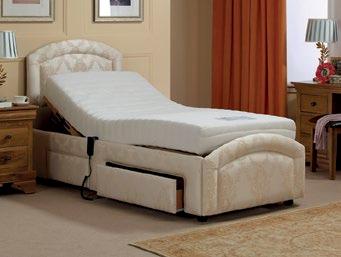
BRYDON From Uncle Bryn To Sex Symbol
Barry Cryer
15 Anecdotes From The Comedy Giant Rob LIFE AFTER CANCER THE BATTLE WE DON’T TALK ABOUT HEALTH


BRYDON From Uncle Bryn To Sex Symbol
Barry Cryer
15 Anecdotes From The Comedy Giant Rob LIFE AFTER CANCER THE BATTLE WE DON’T TALK ABOUT HEALTH

Ford Kuga Zetec with SYNC 3 DAB Navigation System and Appearance Pack from only £295* Advance Payment.
To find out more, visit ford.co.uk/motability or call 0345 60 40 019.
Official fuel consumption figures in mpg (l/100km) for the Ford Kuga Zetec 1.5T EcoBoost 120PS FWD: Urban 27.7 (10.2), Extra Urban 42.8 (6.6), Combined 35.3 (8.0). Official CO 2 emissions
181g/km .
The mpg figures quoted are sourced from official EU-regulated test results (EU Regulations (EC) 715/2007 and (EC) 692/2008 as last amended), are provided for comparability purposes and may not reflect your actual driving experience. For more information and most up-to-date data, please see the price list at www.ford.co.uk/motability. Data correct as of 28th May 2018. *£295 Advance Payment available only on Ford Kuga Zetec 1.5T EcoBoost 120PS FWD Manual. SYNC 3 DAB Navigation System and Appearance Pack are subject to availability. No cash alternatives are available. This programme is subject to the standard conditions of the Motability Scheme hire agreement. Full written details and quotations available on request from a Ford Authorised participating Dealer of Motability Operations Limited. Motability Scheme vehicles are leased to customers by Motability Operations Limited. Motability Operations Limited is authorised and regulated by the Financial Conduct Authority under reference number 735390. To qualify you must be in receipt of the Higher Rate Mobility Component of Disability Living Allowance (DLA), the Enhanced Rate Mobility Component of Personal Independence Payment (PIP), the War Pensioners’ Mobility Supplement (WPMS) or the Armed Forces Independence Payment (AFIP) and applications must be made with participating dealers between 1st July and 30th September 2018. Prices are correct at time of print, are subject to availability and may change
16 IT’S A MANN’S WORLD
Olly Mann grapples with his dislocated shoulder
ENTERTAINMENT
20 INTERVIEW: ROB BRYDON
The actor opens up about a tough period of his life and becoming a “sex symbol”
30 “I REMEMBER”: BARRY CRYER
The iconic comedy writer on his childhood and career
HEALTH
38 LIFE AFTER CANCER
Why the battle doesn’t end when you’re given the all-clear
58 HEAVEN’S DOOR
Are our close ones really gone when they pass away?
INSPIRE
66 BEST OF BRITISH: AT THE PARK
Take a walk through some of Britain’s prettiest parks
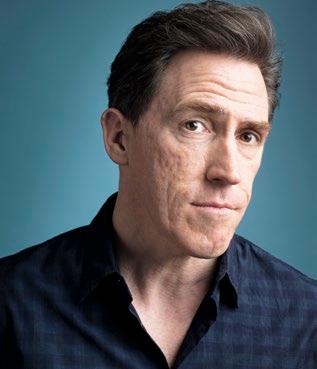

80 PARIS WITH MY GRANDMOTHER
Liam Drew discovers a new side to his grandmother when he brings her to Paris for the first time
TRAVEL & ADVENTURE
90 BEYOND THE BEACHES
Explore the hidden treasures of sunny Fort Lauderdale
100 DREAM STAYCATIONS
Make the most of your summer holiday on home turf




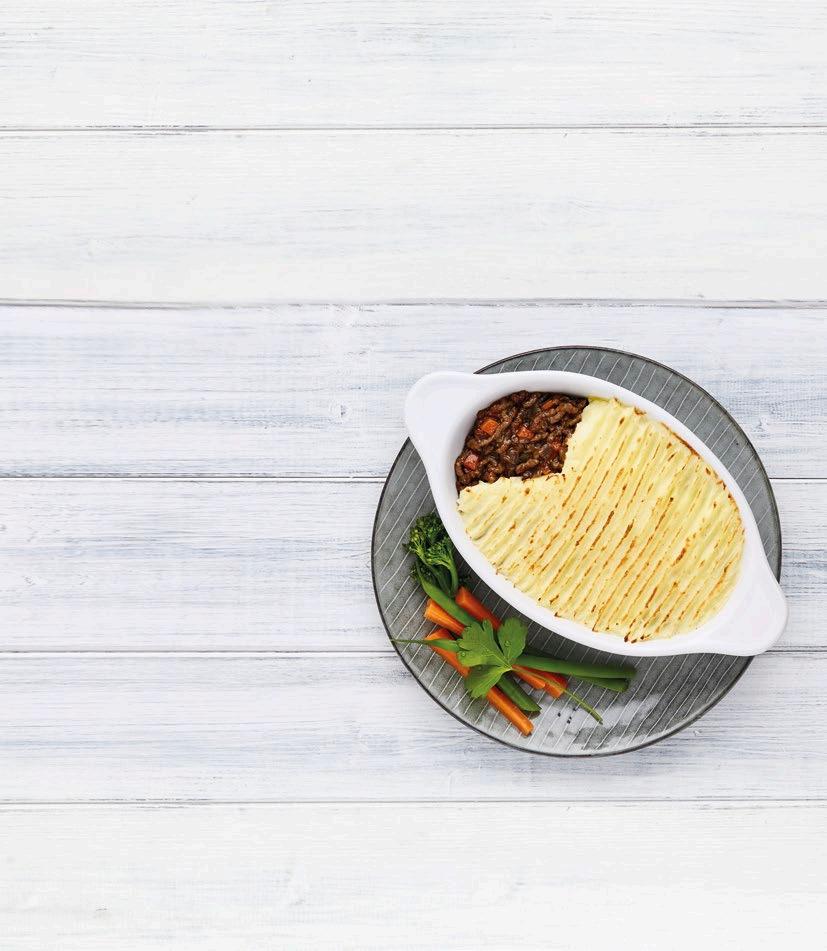











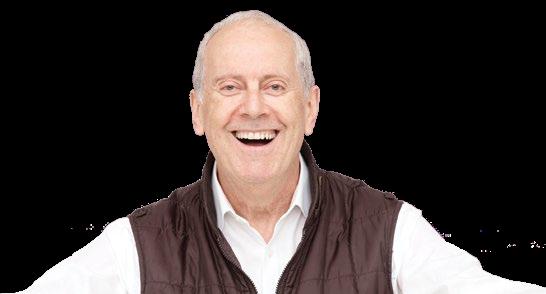
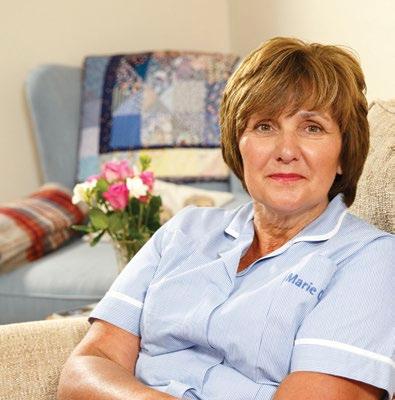
Having been a Marie Curie Nurse for 13 years, I know that at the end of their lives most people would choose to spend their precious last days in their own home.
With a gift in your Will, you’ll support a Marie Curie Nurse like me to provide compassionate care to someone when
Strength for the weak. Courage for the fearful. Love and kindness in their darkest hour.
they need it most. And you’ll help someone spend their last days in the home they love, surrounded by the people they love.
That’s why I hope you’ll leave a gift in your Will to Marie Curie. I know that it’s a gift given with love.
Leave a gift in your Will to support a Marie Curie Nurse, like Lynne
For a free guide, please return this coupon to: Freepost Plus RTAC-JKAZ -RCRT, Gifts in Wills Team, Marie Curie, PO Box 23897, Edinburgh, EH6 9AB. You don’t need a stamp.
We will write to you by post from time to time to let you know about our work, fundraising activities and ways to get involved. If you’d prefer not to hear from us by post, please tick here To update your contact preferences, including how often you hear from us, email supporter.relations@mariecurie.org.uk or call 0800 716 146. For more information about our Fundraising Promise or privacy policy, visit www.mariecurie.org.uk/privacy
Or call 0800 144 5740 or search Marie Curie Gift in Will online to get your free guide.
SENIOR EDITORS Anna Walker, Eva Mackevic
EDITORIAL ASSISTANT Jessica Summers
ART DIRECTOR Richard Cooke
ADVERTISING Jigs Pankhania
MARKETING Sarah Hughes
FINANCE MANAGER Irving Efren
TRUSTED MEDIA BRANDS INC (USA)
President and Chief Executive Officer
Bonnie Kintzer
Vice President, Chief Operating Officer
International
Brian Kennedy
Editor-in-Chief, International Magazines Raimo Moysa
WE PAY...
£50 for the star letter and £30 for regular letters.
Email readersletters@readers digest.co.uk or go to readers digest.co.uk/contact-us
WE ALSO PAY...
£30 for the true stories, anecdotes, jokes in Laugh! and You Couldn’t Make It Up…, and contributions to end-of-article fillers and My Great Escape.
Email excerpts@readersdigest.co.uk or go to readersdigest.co.uk/contact-us
We cannot acknowledge or return unpublished items or unsolicited article-length manuscripts. Do not send SAEs. Article-length stories, poetry and cartoons are not requested.
Contact Customer Services for renewals, gifts, address changes, payments, account information and all other enquiries. Call 0330 333 2220* or email customer_service@readersdigest.co.uk
Reader’s Digest is also available in audio and accessible etext editions from RNIB Newsagent, for blind and partially sighted readers. Call the RNIB Helpline on 0303 123 9999 or visit rnib.org. uk/newsagent
Visit readersdigest.co.uk/subscribe or write to: Reader’s Digest, FREEPOST: WARNERS GROUP (READ). UK: £39.99 a year. Republic of Ireland: €59.99 a year. Prices include delivery. For gift subscriptions, contact Customer Services.


With temperatures set to soar, most of us have our eyes fixed firmly on our holidays. I jetted off to the US state of Florida recently to explore Fort Lauderdale, Miami’s relaxed little sister. You can read about my adventures and discover what makes the city a surpising cultural mecca on p90. If you’re looking to soak up the sunshine a little closer to home, look no further than p66, where we take you on a tour of Britain’s best parks. There’s sure to be one near you that’ll be perfect for packing a picnic and a rounders kit and enjoying the last long days of the year. Out of office firmly on!
Or—if, like me, you’re still sheepishly looking for something to fill your time with now that the World Cup is over, you’ll find a whole range of fun things to try in this month’s issue. Whether it’s cooking up a delicious curry with Rachel Walker on p106, going to the cinema to watch one of the stunning films reviewed on p118 or training your memory with tips from Jonathan Hancock on p56, we’ve got all bases covered (though we understand if you want to give adventure parks a miss having read about Olly Mann’s escapades on p16). After that, settle in comfortably and get ready to laugh your socks off as we interview the Welsh funnyman Rob Brydon on p20 and legendary jokester Barry Cryer on p30—it’s maritime puns galore!
facebook.com/readersdigestuk
twitter.com/readersdigestuk
You can also sign up to our newsletter at readersdigest.co.uk
Reader’s Digest is published in 27 editions in 11 languages

We pay £50 for Letter of the Month and £30 for all others
I was delighted to read in the June issue of Reader’s Digest the article about my favourite classical performer, the Dutch violinist, André Leon Marie Nicholas Rieu, “I Know How To Melt People’s Hearts.”
In addition to being a musical genius, André seems like a kind, caring gentleman and a family man—so rare in this day and age. I was amazed to read that people have been healed whilst listening to his music. I’m in recovery after a bad fall, and when my 94-year-old mother, Eleanor, was sent home from Hospital suddenly, with no warning and with no package of care, I immediately fell over her Zimmer Frame and spent four hours on my knees waiting for an ambulance!
I decided to listen to his rendition of
Leonard Cohen’s Hallelujah.
While I cannot claim to have received physical healing, to my surprise I was moved to tears of joy.
Thank you for this inspiring article, which has changed my life in no small way. Thank you also, Mr. André Rieu. Catherine Hiscox, Hertfordshire

I had to read your article about André Rieu, as I watched him on television last year at one of his concerts and it was an amazing electric atmosphere. The man not only has an admirably awesome love for music, but can set the scene perfectly which makes his performances so very special. It’s a scene which takes people out of reality into a new world that seems like heaven on earth.
He’s a man who was brought up in a household with a rather strict and not very loving but encouraging father. But it seems that he probably set him on his career path. He could have fought against it but thankfully he didn’t. Finding the right wife who complemented his abilities and has obviously shown him much love was also important.
What a conductor, and a musician who sets the scene for romance, healing, and gives hope to many. A great example to us all. I haven’t actually been able to make it to one of his concerts yet, but I do aim to book one as soon as it’s possible. Thank you for featuring this wonderful article on him.
Susan King, Bolton
What a brilliant article about the hugely talented André Rieu, “I Know How To Melt People’s Hearts!” He learned to play the violin aged five. This Dutch violinist has captivated international audiences, bringing the glamour of the Viennese ballroom to millions across the world. It was fascinating to learn such amazing facts about the King of the Waltz. My dream is to one day go and see him and his multi-coloured ballgownclad musicians! I love the fact that his concerts are so long because he wants to give his fans more. What a man. May he go on performing until he drops.
Ginette Hughes, Hertfordshire

I had to write to validate your “Sweet Talk” feature by Susannah Hickling. “It [sugar] can make you feel down” pointed out that “post-menopausal women who ate a diet high in added sugars were more likely to succumb to depression”. This was true for me and cutting the sugar and joining a gym have seen me go from Sweet Talk to Sweet Life. I’ve never felt more energised. Thank you, Susannah, for a timely article that I think many people will benefit from if they take action now. A short and sweet article that will have long lasting changes...
Karen Taylor, DorsetAs much as I adore your magazine and have been a subscriber for some years, I was saddened to read Olly Mann’s article about his love of the wholesalers Costco.
In a society where we have far too many choices when it comes to food and products, not to mention wasteful plastic packaging, how can Mr Mann justify his statement, “there’s just something wonderful about purloining 500 nappies in one hit, or a
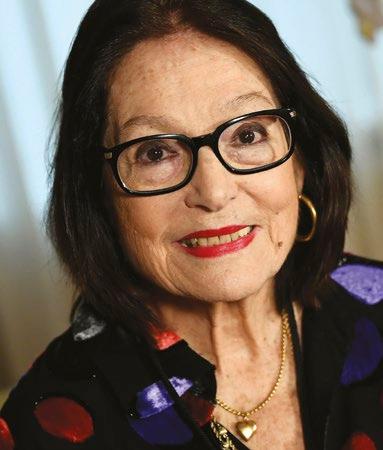
year’s supply of dishwasher tablets?”
Have we really come to this? And do we really want to follow America’s example of excessive greed and waste?
Please, Mr Mann, find enjoyment in simple pleasures and not bulk-buying even if it means you’ll run out of salt— perish the thought!
No wonder some countries despise the British. We have so much while they have so little yet they are consistently happier with their lot. How sad. Jayne Moynuex, Flintshire
I was really inspired to read the story of Nana Mouskouri (“I Remember”— June 2018). What an incredible lady. From the streets of wartime Greece to international superstar.
I remember the Nana Mouskouri Show on TV from when I was a child, and how my parents used to enjoy it. I didn’t get it of course and I only really watched it for the guests. As a rebellious teenager it wasn’t my kind of music at all, but there was no escaping her talent and popularity.
I found her humility and passion throughout the interview incredibly inspiring and I am now looking at Nana Mouskouri through different, wiser eyes! Gary Godderidge, Coventry

Discover the Wonders of Europe on an Award-Winning River Cruise
For a classic river cruise with a contemporary twist, it has to be Emerald Waterways. Our award-winning Star-Ships bring the highlights of ocean cruising to the intimacy of Europe’s rivers. Choose from sixteen meticulously planned 2019 itineraries, and enjoy a wealth of tantalising inclusions on every cruise.
For a limited time, we are giving you the chance to save up to £1,250 per couple*, plus enjoy unlimited FREE drinks^ throughout your time on-board when you book one of our chic balcony suites.

Unforgettable Itineraries
Our sixteen exceptional itineraries encourage you to explore the waterways of Europe. From the iconic Danube and Douro to the picturesque Rhine, Rhône and Moselle.

Award-Winning Star-Ships
Explore Europe aboard our innovative Star-Ships and experience unique highlights like a heated pool† with a retractable roof which transforms in to an evening cinema.

It’s all included in the price
Emerald Waterways offer a wide range of inclusions so all your needs are catered to. Tips, port charges, transfers and a range of included excursions, plus on-board Wi-Fi.
CRUISE FROM
£1,270 PER PERSON PLUS
SAVE UP TO £1,250 PER COUPLE*
UNLIMITED FREE DRINKS^
WHEN BOOKING A BALCONY SUITE

2019 Departures Was from pp Save up to* pp Now from pp
8-day Danube Delights £1,895 £625 £1,270
8-day Charms of Holland & Belgium £2,295 £625 £1,670
8-day Sensations of Lyon & Provence £2,195 £625 £1,570
Terms and conditions: All of our holidays are subject to availability. The prices shown are correct at the time of going to print (6th July 2018) and are per person based on two people sharing a Category E Emerald Stateroom in low season and include relevant discounts. Supplements apply for single travellers, upgraded cabins and other departure dates. All savings, discounts and Free Premium Drinks offer on balcony suites are available for new bookings only, made between 24th July and 31st August 2018. ^Free Premium Drinks Package is not available on Stateroom bookings, includes house wine only and excludes Champagne, wine by the bottle and cabin mini-bar. *All prices and savings include an Early Payment Discount of £125.00 per person, only valid when payment is made in full by 31st October 2018. We reserve the right to withdraw our offers at any time. Offer not available on our Southeast Asia, Russia, Egypt & Jordan and our Dalmatian coast itineraries. †The Emerald Radiance Star-Ship on the river Douro does not have bicycles or an indoor pool/cinema, instead there is a Serenity Pool on the Sun Deck. For full booking conditions please refer to our 2019 European river cruise brochure or visit emeraldwaterways.co.uk



Although its flowers more closely resemble sea shells, coral or even a human brain, the plant Celosia Cristata actually owes its name to a farmyard bird! This summer bloomer’s wavy, elongated flowers reminded its breeder of a rooster’s crest, so he decided to name it “cockscomb.” Originally native to tropical America and Africa, these plants thrive in a hot climate, but can also be grown in our part of the world, so long as the temperature doesn’t drop below five degrees.

A recent kayaking excursion reopened some old wounds for Olly Mann
Ihave just been sea kayaking. This would be an unlikely event at any stage in my life, as my track record with watersport is woeful. (Waterskiing terrified me, and I once went fishing but became so bored I spent the entire time observing the bait wriggling in the tupperware.) It’s especially surprising, though, because this is the first time I’ve attempted any shoulder-based sport since I first dislocated my shoulder eight years ago.
The initial dislocation was at my friend Steve’s wedding; or, more accurately, at the pre-wedding japes in the Canadian Rockies (he married a Canadian. If only he’d hooked up

Olly Mann presents Four Thought for BBC Radio 4, and the award-winning podcasts The Modern Mann and Answer Me This!
with his high school sweetheart from Hitchin, my shoulder would have been saved).
I was 29, had never been skiing, and took the advice of my snowsporty mates that I should do a trial lesson on a dry slope first, before heading out to Lake Louise. To my astonishment, I found the dry slope lesson relatively easy, and didn’t fall over once. So, when I got to Canada, full of false confidence, I overenthusiastically donned my skis at the rental centre, attempted to ski over to where the lesson was due to begin, lost my balance, and fell backwards on to hard ice.
The pain was harsh, but relief came quickly as my shoulder was popped back in by an on-site doctor (you’re never far from a medical practitioner on a ski slope). But then my arm had to sit in a sling for the next six weeks. So, aside from the obvious embarrassment of having obtained a “sports injury” without

actually attempting the sport itself, I then had to discuss it with all the guests at Steve’s wedding, all highly amused by my sling. I smiled weakly as I posed for numerous photos recording the moment they met that English guy who fell over and injured himself, despite having never set a foot on the mountain.
In the years since, my shoulder has repeatedly dislocated. Notably at my friend Ben’s stag do on a zip wire at one of those stupid treetop adventure parks.
The first hour of swinging and jumping had proceeded without incident, but, as I attempted one of the more precarious leaps, I reached out for a net to catch myself in—and, as my bungee rope snapped me backwards, it pulled my arm clean out of its socket. As I dangled 30 metres above the ground, blood draining from my face and shaky with adrenalin, I tried to slot my shoulder back, and failed.
I did a little puke in my mouth as I was told that there was no quick way to get me down from the wire: the fastest way to find sanctuary would be to complete the treetop course. I somehow then completed six bungee jumps in a matter of minutes, holding my right arm aloft with my left, until I reached
ground level, relocated my shoulder lying face down on a park bench, and continued on to the Wetherspoons.
The most recent dislocation, in 2015, was the least remarkable: I was running for a train after having a few drinks, and managed, bizarrely, to fall up a staircase. But the more your shoulder pops out, the more likely it is to happen again, and the harder it is to put back.
A steely-eyed surgeon advised me that surgery would be the best option. I ignored his advice, and chanced my arm (pun intended) on a regime of: a) never again doing weird outdoorsy activities and b) jogging, not running, for trains.
For two years I followed my own advice, and my shoulder remained in place. But this summer I’ve been a little more lax. I’ve risked running on

“As I dangled above the ground, blood draining from my face, I tried to slot my shoulder back…and failed”
a cross-trainer. I’ve carried multiple bags of heavy shopping. I’ve even been on a rollercoaster (counterintuitively, so long as there are shoulder restraints, it’s fine—it’s actually the coasters with lap-bars that bash your shoulders).
Then, last month, I was invited on a long weekend to Croatia with my wife’s friends—all of whom are younger and sportier than me. The whole itinerary was finalised ahead of time (and I do mean the whole itinerary: a fortnight before
departure, a PDF of the menu at the pizza restaurant was circulated amongst the group via WhatsApp), and sea kayaking was the Saturday morning activity, booked and paid for. So, I thought, I should at least give it a go before backing out. And so, yesterday, I found myself standing in my trunks on Bene beach, with an oar in my hand, boarding a two-person kayak with my wife.
Coordinating our rowing technique nearly cost us our marriage, but I’m pleased to say my shoulder didn’t feel remotely vulnerable, and still remains in place. If anything, I suspect the rowing may have strengthened the muscles around my shoulder. I got to see the beautiful Marjan peninsula, and take part in some outdoor sport for the first time in eight years.
It’s all made me feel rather dislocated.
These hilarious photos capture the moment some creative critters caught a lift



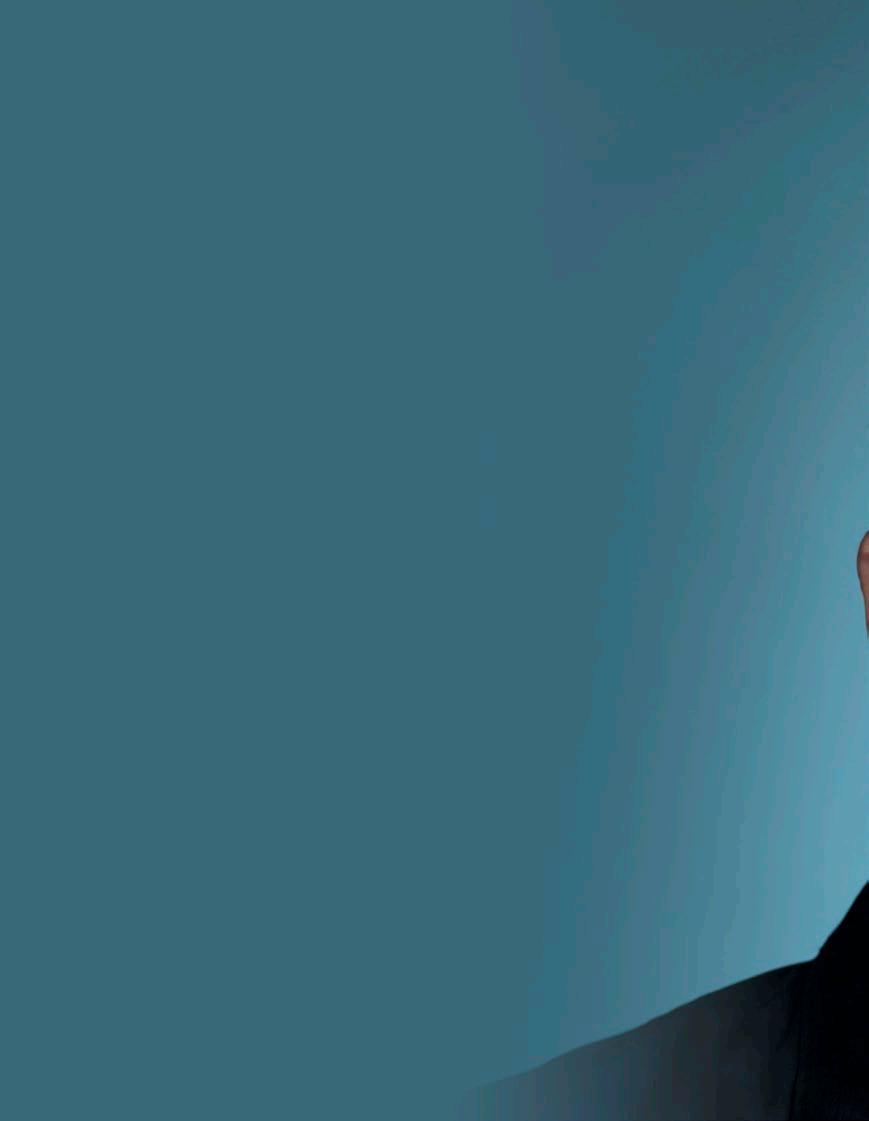 Rob Brydon:
Rob Brydon:
HE’S BEST KNOWN AS GENIAL UNCLE
BRYN IN GAVIN & STACEY as well as for his drolly funny trips around England and Europe with Steve Coogan and for his quick-witted hosting of Would I Lie To You? But it seems Rob Brydon can now add “sex symbol” to his CV thanks to Swimming With Men, the British comedy film where he spends much of his time in just a pair of trunks
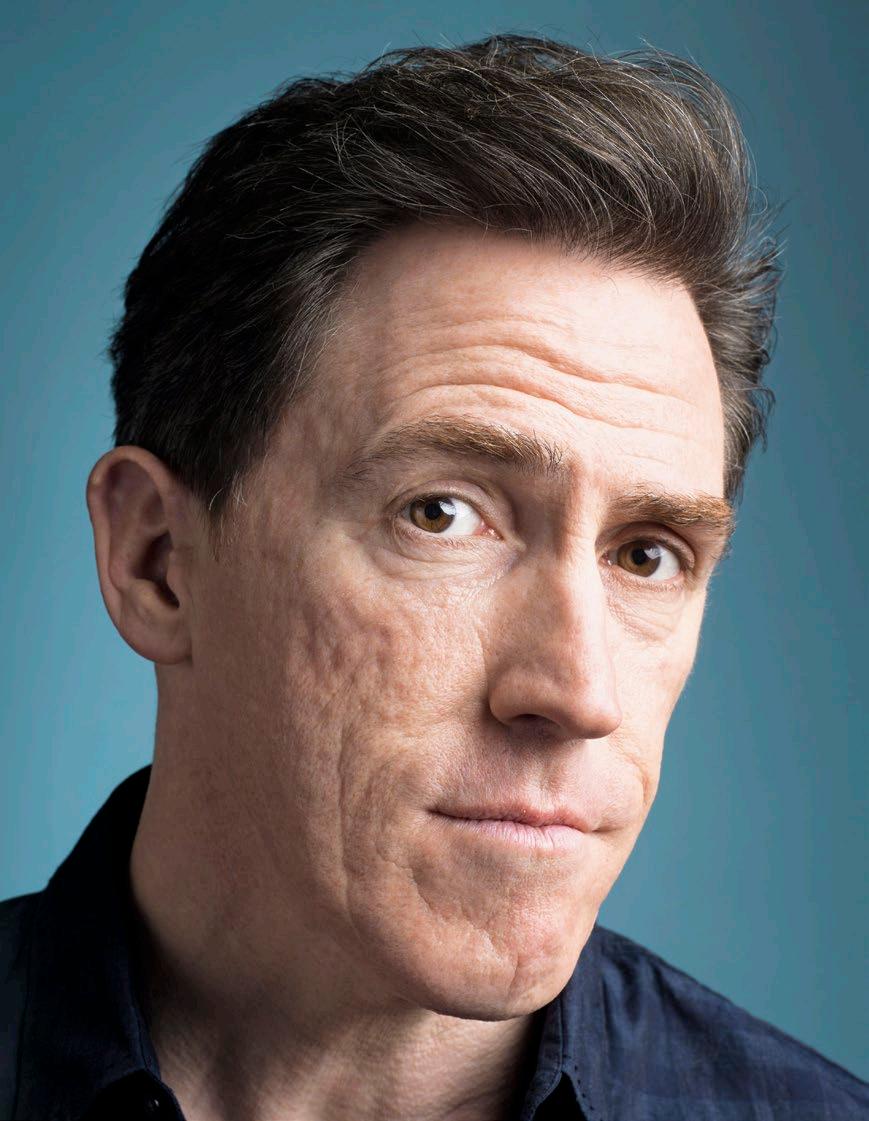
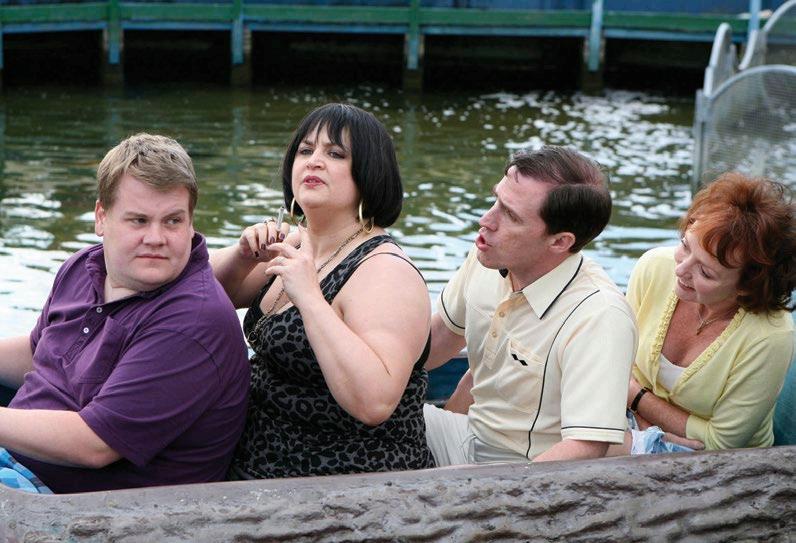
The genial-as-Bryn Welshman laughs at the very idea, then deadpans: “I think it’s the inevitable next phase of my career. It’s a natural progression: Uncle Bryn, The Trip, Would I Lie To You?, then sex symbol. You can’t stand in the way of progress.”
In the film he plays Eric, a bored accountant going though a midlife crisis who joins a group of synchronised swimmers (played by the likes of Jim Carter, Daniel Mays and Rupert Graves) and finds himself en route to the world championship in Milan. It’s a firstever leading-man role for Rob, who
got his start in radio more than 30 years ago and has been acting since the mid-1990s, but he’s taking it in his stride.
“It’s pretty good,” says the 53-yearold, speaking down the phone from his home in Richmond and sounding as laid-back as the characters he specialises in playing. “I love my work and I’m so lucky to get to do what I do but it’s not my life. I’m aware this is the first time I’ve had top billing in a film and it pleases me, but that’s about it.”
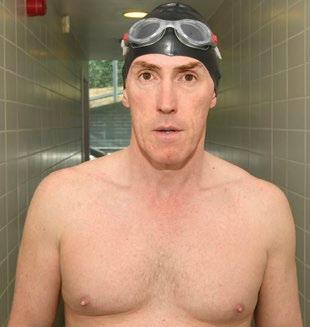
He is, however, genuinely pleased about how
Swimming With

“ It’s a natural progression: Uncle Bryn, The Trip, Would I Lie To You?, then sex symbol ”
Men has turned out. “It’s an unusual story,” Brydon feels. “At the very least you can’t go, ‘Oh God, not another film about middle-aged men’s synchronised swimming’. It’s interesting because women in particular seem to like the film. Maybe there’s something about
seeing men being very vulnerable, real and honest.
“I know someone who saw it who said, ‘I expected to laugh but I didn’t expect to cry’. They didn’t expect it to be so touching and I think one of the reasons it’s so touching is that you see all these men who are all a bit adrift, they’ve all sort of come loose from their moorings.”
He chuckles. “That’s me keeping the maritime analogies going, but they have to lean on each other and support each other, literally as well as emotionally. They have to reach out and touch each other’s bodies and hold each other’s ankles or wrists. I think there’s something quite affecting about seeing that on
screen. I mean, none of us look like we could be in The Avengers or something like that. We all look very normal.”
When we first meet Eric he’s fed up with his job and is drifting apart from his wife (Jane Horrocks) whereas Rob, who has four children and is happily married to former TV producer Claire Holland, is in a much better place. “I have a very blessed life. I have everything I want. I have opportunities, I have a great family, I’m pretty content I must say. I think back to before I had my break when I couldn’t get arrested, I just couldn’t get anything going, but even then I knew what I wanted to do. I was never adrift like Eric.”
Laughing about dredging up more nautical metaphors, he adds: “I could see the harbour that I wanted to come into, I just couldn’t get there.”
Brydon’s big break was the 2000 BBC comedy Marion & Geoff, prior to which he’d been a presenter for Radio Wales and the Home Shopping Network, did TV voice-overs and had only secured a few minor film and TV roles. I wonder aloud why he didn’t give up, to which he replies, “That’s an interesting question because when I wrote my autobiography and read it back I thought, My God, how on earth did you keep on going? But I think when you’re the one on the journey you’re just looking straight ahead.
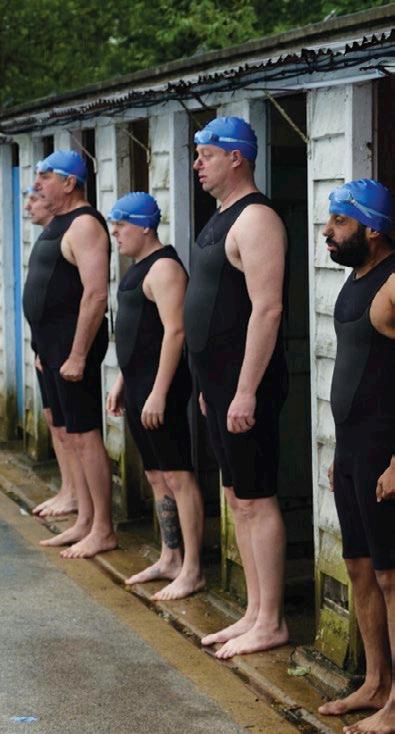
“ I mean, I’d be a lunatic if I went around going, ‘Hello! Welcome to today!’ all the time ”
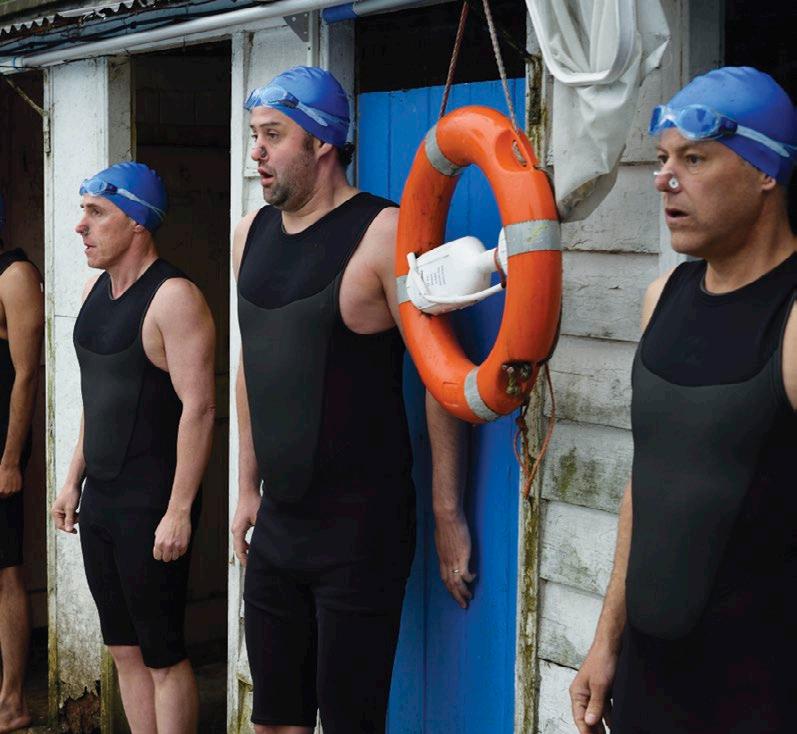
I was always thinking, It’s round the next corner. When my dad read the book he said, ‘I had no idea how hard it had been for you’. It’s full of knock-back after knock-back after knock-back.”
The details, he adds, are in said autobiography Small Man In A Book, which was published in 2012. “And you can now find it in charity shops at a very reasonable price.”
The book also details Brydon’s childhood as the son of a school teacher mum and car dealer dad, his tenure at the Welsh College of Music & Drama, his radio and voice-over work and how he’s never looked back since Marion & Geoff. Gavin & Stacey, The Trip and Would I Lie To You? have since turned him into a household name. “But if I’m being entirely honest with you, more
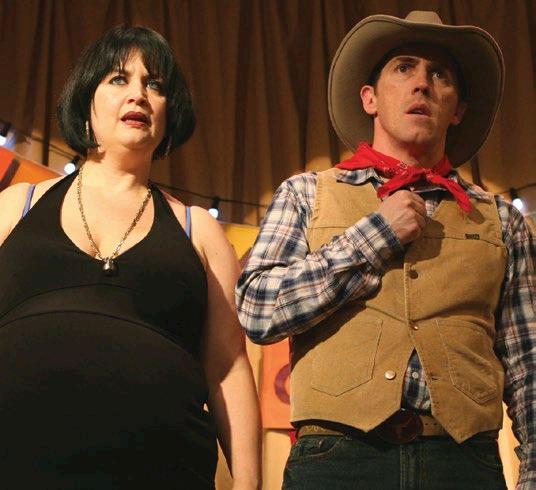
people probably see the adverts I do than anything else,” admits the current face of P&O Cruises. “That said, Gavin & Stacey seems to have a very special place in people’s hearts.”
The latter wrapped in 2010 and there’s been no talk of a new series, which Rob is happy about.
“I think it’s kind of perfect as it is and I’d much rather have people saying, ‘I wish there was more’ as opposed to ‘It’s such a shame they came back and did it again because it wasn’t the same’.”
Given his quick wit, do fans expect him to be funny in person? “I think it’s more that they expect me to be happy. Usually when they see me on TV I’m either smiling and saying ‘Welcome to Would I Lie To You?’ or I’m playing a happy-go-lucky
character like Bryn or I’m looking across the deck of a cruise ship seeming to be very happy with life. So if people see me in the street with a normal face they’ll say, ‘Cheer up’. I can’t tell you how annoying that is.” Putting on an exaggerated air of joie de vivre he adds, “I mean, I’d be a lunatic if I went around going ‘Hello! Welcome to today!’ all the time.”
We’re chatting on a landline, so I can’t see if Brydon is looking happy but he certainly sounds it. Being at home is his favourite thing, especially when it revolves around the kids. He has three grown-up children: Katie, Harry and Amy from
“ I love the trips with Steve—they’re great fun but I’m always ready to come home ”
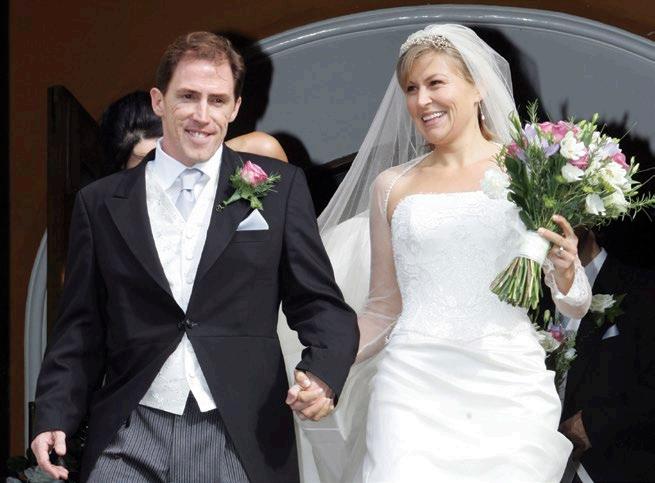
his first marriage, and he and Claire have two sons, Tom, ten, and George, seven. “And I love it when we’re all together. I often have three or four fifths of the kids together and now and again it’s the whole pie, although it gets harder as they get older because they’re off doing their own thing.”
He’s hitting the road again in September for a stand-up tour. “And that’s not without its pleasures but mostly I like being at home and having a routine because usually my life doesn’t have one. I think the delights of gadding about are very
much a young man’s game and it doesn’t work when you have young children because they need you around. I love the trips with Steve. They’re great fun but I’m always ready to come home.
“I really like being able to have a nice breakfast, walk the boys to school, have a chat with some of the other parents, go to the gym, meet friends, get out into the countryside or at the very least sit in the garden, then pick the boys up from school— pretty simple stuff.”
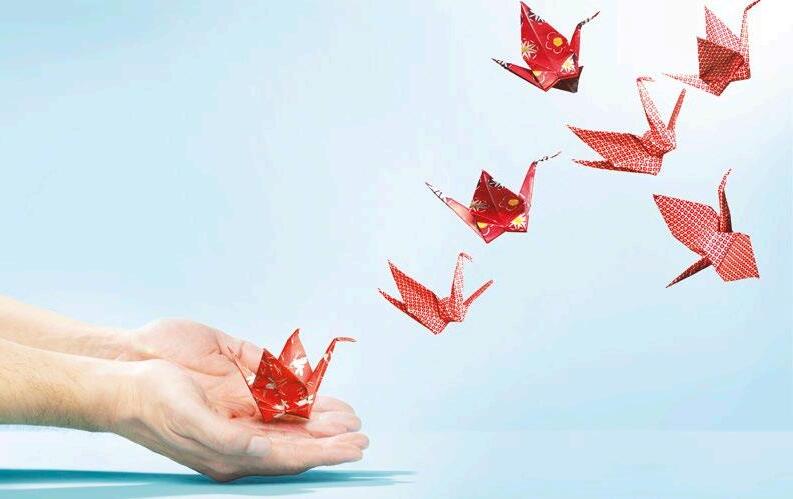
Equity release continues to grow in popularity as more and more of the UK’s over-55’s turn to their property wealth to provide a comfortable retirement. Its important that you know the facts.
Equity release has come a long way since the introduction of regulation in 2007. Now, thanks to government regulated equity release plans called Lifetime Mortgages, you could have access to your property wealth. UK over-55 homeowners can use a lifetime mortgage to unlock a significant portion of their property’s value as taxfree cash. With a lifetime mortgage, you continue to own your property, but you have the freedom to pursue your lifelong aspirations, top up your later-life income, or help with family matters such as providing an early inheritance.
Despite this, there remain a number of misconceptions about equity release.
Contrary to popular belief, taking out a lifetime mortgage does not affect the ownership of your home. Your home remains your own for life. The mortgage, plus the interest accrued, only gets repaid once the property stops serving as your primary residence – when you move into long term care for example.
This is completely untrue. The ‘No Negative Equity Guarantee’ ensures that your estate will never owe more than the value of your property when it is sold. Once the property ceases to be your primary residence and is sold, the sale proceeds are used to pay off the lifetime mortgage and any interest that has accrued. Once the loan has been repaid, any remaining funds will be paid to your heirs as per the instructions in your Will.
In the unlikely event that the property sells for less than the amount of the loan, the remaining balance will be written off.
have an outstanding mortgage
False. You can still release equity from your home if you have an outstanding mortgage, provided that the tax-free funds you release or other savings you have are used to pay off the outstanding mortgage balance. In fact, clearing an existing mortgage balance is one of the most popular uses of a lifetime mortgage.
Despite the name, a lifetime mortgage features no required monthly payments. As with any other borrowing, an interest rate is charged. Any interest you choose not to pay is simply added to the total and paid when you or your heirs eventually sell the property. However, should you wish, you can make voluntary, penalty-free payments of up to 10 percent per year of the amount you borrowed.
It is important to consider that a lifetime mortgage may reduce the value of your estate, and the tax-free cash you receive may affect your entitlement to meanstested benefits. Your advisor will provide you with a personalised illustration of the features and risks to you.
If you think that your retirement could be boosted by a tax-free cash boost, why not contact us today and request your free Reader’s Digest Guide to Equity Release. n
To find out how much value you could release from your home, our handy calculator will give you the information you require.
You can also call 0800 029 1233 to request the free guide and discuss your needs with a view to arranging a home visit with one our financial advisors.
Visit
www.readersdigest.co.uk/equityrelease
Reader’s Digest Equity Release is a trading style of Responsible Life Limited. Only if your case completes will Responsible Life Limited charge an advice fee, currently not exceeding £1,295.
At 83, comedy legend Barry Cryer has been in showbusiness for six decades. Here he looks back on a life of love, loss and laughter

…ALWAYS WANTING COMPANY, PEOPLE AND NOISE. It was just me and my mother when I was growing up in Leeds, because my dad died when I was five, leaving me without a father figure. I have the odd memory, like him buying me an Airfix model aeroplane. We assembled it together in the front room and when I flew it, it landed straight in the fire. But there’s a single photo of him in a room upstairs and I look at it now and think, I never knew you.
…WINING AN ACTING PRIZE FOR PLAYING FALSTAFF IN A SCHOOL PRODUCTION OF HENRY IV. It was a joint award with my friend John Gledhill, who played Hal. At the ceremony, I took the cup, and handed John the base. It got a big
laugh. Even then I had the instinct, “Oh, this will be funny.” But I had no real performing ambitions at that time. I had a half-baked idea of becoming a journalist, but none of entering showbiz, even though I loved comedians like Tommy Handley and Max Miller.
…I WAS A UNIVERSITY DROP-OUT. I studied English Literature at the University of Leeds, but I was in the bar chasing girls, not concentrating. My first-year results showed it. But I was in a student show at the old Empire Theatre. This guy had come from London to watch someone else but saw me telling jokes and offered me work. My first week as a professional was at the Leeds City Varieties in 1956. I’ve been back a lot of times since, appearing in The
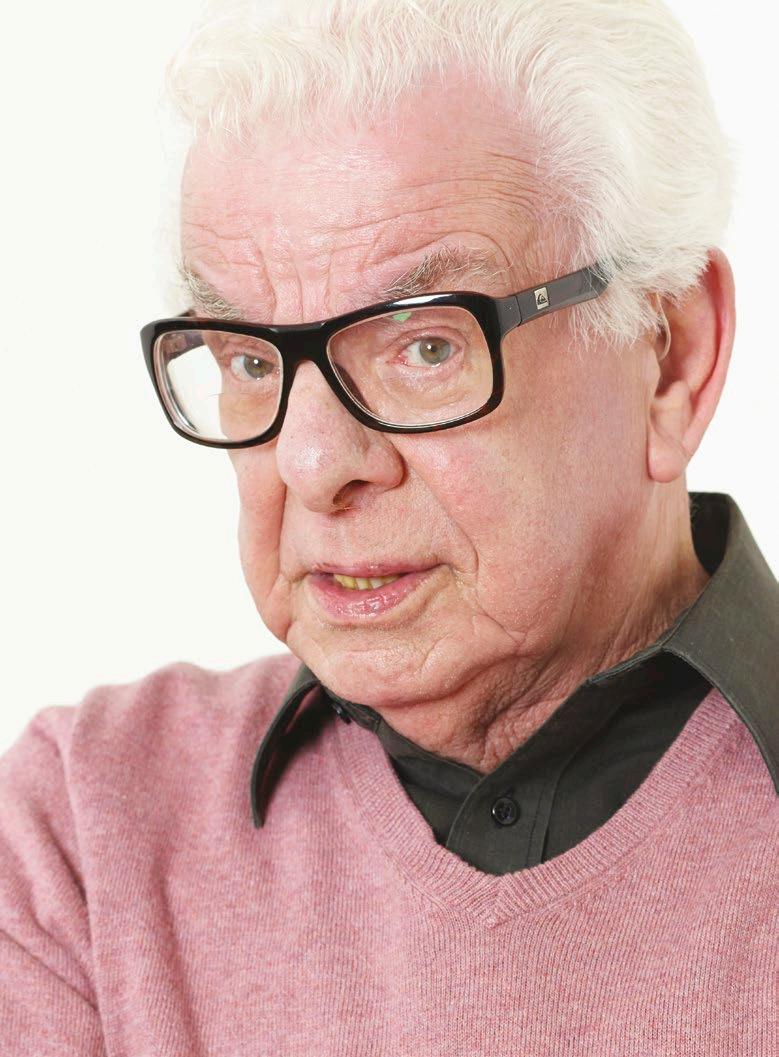
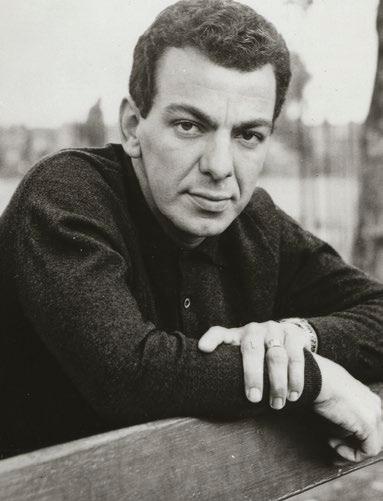
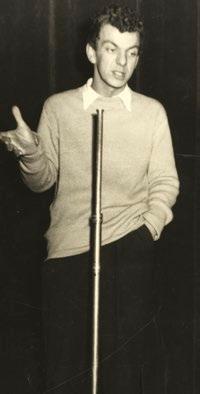

Good Old Days, and this year we recorded an edition of I’m Sorry I Haven’t A Clue there. It’s been refurbished and got a glass lift now. It was a tip backstage years ago…
…LEARNING TO DIE WITH DIGNITY AT THE WINDMILL THEATRE IN LONDON’S PICCADILLY. It was the most incredible apprenticeship for stand-up comedy. I’d just come down to London to try my luck. I auditioned at 10.30 in the morning, and was on stage by 12.15. You’d never get an audience like that anywhere else, where they would open a newspaper when you came on, or just watch you in silence while they waited for the girls. Six shows a day, six days a week. It was amazing.
I rang my mother and said, “I’m a Windmill comedian.” She had no idea what I was talking about. A very unhappy Bruce Forsyth was also on
the bill. He said, “I’m packing it in. I’ve got as far as can go, I’m opening a tobacconist’s.” A year later I heard he was going to be compere on Sunday Night at the London Palladium.
I met him in the street and asked him, “Bruce, what happened to the tobacconist’s?” He simply replied, “Postponed.”
…MEETING RONNIE CORBETT AND MY FUTURE WIFE TERRY DONOVAN
ON THE SAME DAY. It was at a rehearsal at Danny La Rue’s nightclub not far from the Windmill. She was a singer and dancer and I was smitten from when I first caught sight of her standing by a piano.
We married in 1962 and are still together. We have four children, seven grandchildren, and now a great grandchild. We had a small family do at our home the other weekend. There were 15 people in the room and I loved it. The laughter and noise of your own family is a joy.
…MARRIAGE CURED MY ECZEMA.
Before Terry, eczema hospitalised me 12 times in eight years. In those days we were caked in make-up as performers. I thought, “I’ve had it, I’ll concentrate on writing.”
Eczema isn’t life threatening, but it’s extremely unpleasant and there’s the psychological side of it too, thinking, what do I look like? I was in hospital one time when a guy hanged himself in the gents. He was covered
in eczema. When Terry first met me, I had dark glasses on and a coat buttoned up to the chin. She thought, Oh God! Who’s this one? He looks a bit weird. But I was only in hospital with it once more after meeting her. Not a coincidence, I think.
…BEING A SORT OF BRIDGE
GENERATION WRITER. I was stuck in the middle. I knew the Pythons before they were Pythons, and all the Goodies before they were Goodies, and yet I had these links with variety and the older comedy acts. I always say Morecambe and Wise and Tommy Cooper have lasted because they were never topical. Even my grandchildren have grown up with them.
…NEVER WRITING ON MY OWN.
David Frost really got me into partnerships, after he made me a Frost Report writer. He introduced me to Graham Chapman and we ended up writing about 50 shows together, including for Ronnie Corbett. John Cleese wrote a lot with him too, and he’d ask, “Are you being unfaithful to me with Baz?”
Graham was good with construction, the plot, what happens next, whereas I like to think I’m good with characters.
TOMMY COOPER’S ACT DIDN’T RELATE TO REAL LIFE. And he didn’t in person. He didn’t like reading. He wasn’t dyslexic, but the best thing we found was to give him
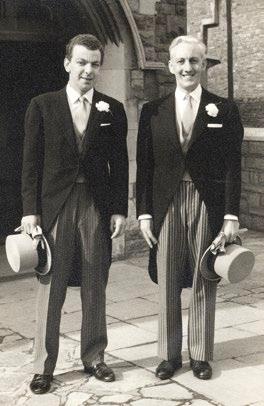

a simple idea and let him run with it. Off stage, I never heard him talk about politics or anything like that. We’d all be sitting round the table talking, and Tom would sulk, not being the centre of attention. Next thing you knew, a pack of cards would come out of his pocket… “Pick a card.”
…FRANKIE HOWERD WAS PAINFULLY SERIOUS. He didn’t fool about much in company. You’d go down the pub and come out disappointed you hadn’t had much to laugh about. But he was a fascinating, intellectual man, in an era when gay men were haunted and hunted. Jimmy Edwards and Kenny Everett were the same.
Frankie’s ambition was to act but
he failed RADA and thought he’d be a comic instead. His bête noire was Larry Grayson who did a routine with a pianist, like he’d already done.
When Bruce Forsyth left The Generation Game, Frankie offered to audition as his replacement. Who got the job? Larry Grayson.
We were having lunch one day and, for some foolish reason I mentioned Larry. Frankie shouted, “That man stole my act!” his voice getting louder and louder, as everyone turned round to look at us. An embarrassing moment.
YEARS BEFORE I’M SORRY I HAVEN’T A CLUE. I was singing outside Leeds Town Hall with the University jazz band. I was a huge
jazz fan. He was in town to do a show there that night. He came over and said, “I heard you earlier.” I preened myself. Then he said, “It wasn’t difficult. You’re quite loud.”
…I STARTED OFF IN I’M SORRY I HAVEN’T A CLUE AS CHAIRMAN. I wasn’t on the original panel but John Cleese and Bill Oddie left because they were unhappy about the show being unscripted, so William Rushton and I were brought in. The 46th series is about to go on air. When Humph died, we all said, “Never again,” but after a year off, the BBC brought us back.
Our chairman Jack Dee is very modest and says, “I can’t fill Humph’s shoes.” Well, there’s only one Humph, but Jack has made a pretty good follow up.
…GOING BACK TO DOING LIVE SHOWS IN THE EARLY 1990S reminded me of my days as a warm up act. I worked for everyone from Noël Coward and Tom Jones, to Monty Python’s Flying Circus. I surprise people by telling them I’m not a comedian. But I’ve spent my life working with comedians and I know what I’m talking about.
The people I’ve worked with, like Max Miller, Frankie Howerd, Tommy Cooper and Morecambe and Wise had something of their own, they were originals. I love making people laugh but I also tell stories and sing
“I surprise people by telling them that I’m not a comedian… but I know what I’m talking about”
songs. I’m happy to be described as an entertainer, or raconteur.
…KEN DODD TELLING ME I’D CORNERED THE MARKET IN OBITUARIES. It was at a British Music Hall Society dinner when Doddy was the speaker, and he looked over and addressed the remark towards me in a joking tone.
It’s true, I do get asked a lot to contribute my memories of deceased comedians, but my memory is not infallible. Philip Porter has produced this marvellous book, The Barry Cryer Comedy Scrapbook which reminds me of things that happened in my life, and people I’ve met, that I’d forgotten about.
…THE QUEEN TOLD ME TO KEEP IT UP. I thought, “oo-er, missus, this is like a Carry On film.” I was one of about 100 people at the Palace to receive my OBE.
They were handing her bits of paper as we went forward. She said, “Still writing?” I’m not sure she really knew who I was. But I do have every
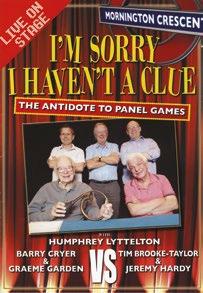
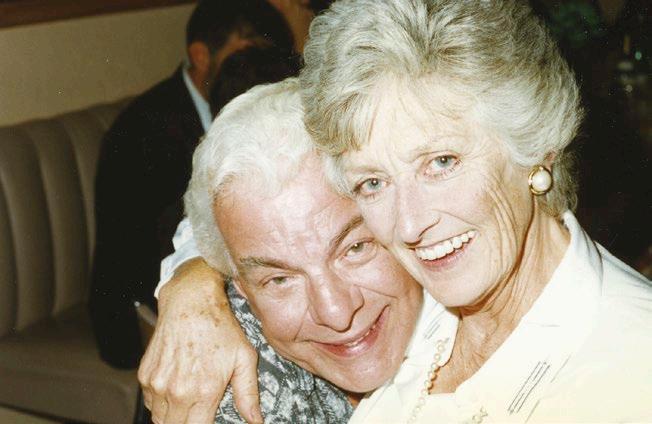
intention of keeping it up. I’m still in I’m Sorry I Haven’t A Clue, I do the gigs and I appear at the Edinburgh Festival each year. I’m a survivor. Young comics say to me, “You tell jokes!” as if I’ve invented some radical new genre. So I’ve got my
niche now. I’m the old man who tells jokes. As told to Jack Watkins
For details of Barry Cryer’s upcoming shows visit barrycryer.co.uk. The Barry Cryer Scrapbook is published by Porter PressEND
These facts are so amazing, it might take a second to fully appreciate them
Since its discovery in 1930, Pluto has not yet made a full orbit of the sun
The Great Sphinx of Giza is so old that the first people to undertake a restoration were the Ancient Egyptians themselves, 1,000 years after it was built
An iPhone is more powerful than every computer that NASA had during the first lunar landing in 1969
Imagine winning £10, £150 or £2,500 for while waiting for a bus
All you need is a postcode and just two minutes to join the nation’s favourite FREE daily draw.
Pick My Postcode is funded by advertisers, so you don’t pay anything. Members have already shared over £600,000 in prizes and Readers Digest readers who sign up today will get an extra £5 added to their winnings.
You’ve really got nothing to lose. Join us today.

Sign up at pickmypostcode.com/rd and get an exclusive £5 bonus added to your winnings.
The lingering mental health ramifications after cancer is cured
THE DESIGNATED WAITING ROOM WAS MORE OF A CORRIDOR REALLY, an allocated space which felt like a last-minute solution to one of a thousand problems in a hospital which clearly hadn’t been built to manage the sheer volume of people coming through its doors

I sat with my grandad—Papa Frank to us—as he nervously waited for the routine checkup that he dutifully attended every six months, an NHS requirement since he’d been given the all clear following two years of treatment for nonHodgkin lymphoma.
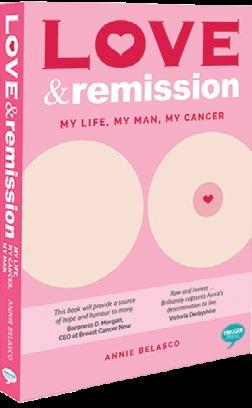
Always the clown, he cracked jokes with the nurses who passed by and gave a familiar wave to the doctors who all knew him by name. They all remembered him clearly because of his sarcastic comments and quick one-liners, a quality which he’s still famous for even though it regularly gets him in hot water with his long-suffering wife. Even though his attitude seemed light-hearted to others, I could tell that the pain of dealing with cancer at the age of 80 had taken its toll, and this was simply his way of coping with a stressful situation. I held my breath as he was taken into the examination room and didn’t fully relax until we both left the hospital with another thumbs up from the specialist.
According to Cancer Research
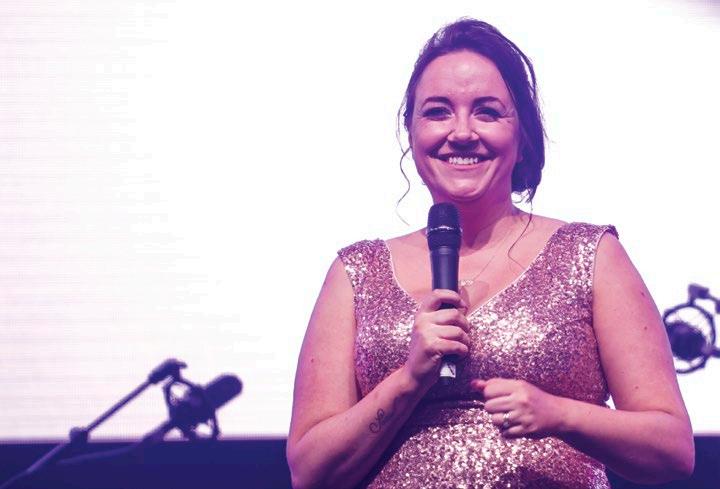
UK, the country saw 13,700 new cases of non-Hodgkin lymphoma in 2015 alone, not to mention the 30 other types of cancer cited on their website. Breast cancer is the most common form in the UK with over 54,000 new cases a year, meaning that one in eight women will be diagnosed with the condition in their lifetime. Men are most at risk of prostate cancer and there are over 47,000 new diagnoses every year, a number which has been steadily increasing since the 1990s. Charities such as Cancer Research

treated. Patients are given options, an action plan, a strategy drawn up by experienced practitioners who successfully cure the conditions everyday. Many people are diagnosed, offered a short course of treatment, given the all clear and told to get on with life. But it’s not that easy. Life after cancer is a whole new world.
ANNIE BELASCO IS THE 34-YEAROLD AUTHOR of Love and Remission). She was diagnosed in
I EXPECTED TO BE ELATED WHEN I FINISHED TREATMENT, BUT IT WAS THE COMPLETE OPPOSITE
are dedicated to raising money and in the past year they have spent £38m on drug trials. Depending on the type of cancer, survival rates can range between one and 98 per cent, but overall death rates are predicted to fall by 15 per cent by the year 2035 thanks to continued research and scientific studies.
A cancer diagnosis is no longer a certified death sentence—the NHS is preparing for new T-cell therapy which is said to put some incurable cancer patients into remission— but can instead be considered a minor health “blip” which can be
2009 when she found a lump in her breast. It turned out to be grade three, fast-growing type of breast cancer which had spread to all but one of her lymph nodes. She was given extensive medical attention which included a single mastectomy, chemotherapy, radiotherapy, reconstructive surgery, IVF preservation and Herceptin treatment. Although Annie describes the process as “gruelling” she had no time to reflect on the enormity of the events and says she generally felt quite optimistic throughout.
“I had my mind occupied by appointments, medical decisions to
make and always had something to look forward to,” she told me. “I saw my treatment as positive and agreed to everything that was suggested to me in terms of curing my cancer, and prevention of it returning. I cooperated with everything and enjoyed time in the hospital, at the doctor’s and with my physiotherapist —I felt looked after.”
Once Annie was given the all clear and declared physically well, her mental health started to crumble. The sense of relief Annie felt as a result

another lump (which later turned out to be benign) and this triggered a full nervous breakdown. Only then, two years after the initial diagnosis, was her mental health properly addressed.
ISN’T UNUSUAL. Barbara Wilson, founder and director of Working With Cancer—a social enterprise helping people affected by cancer return to work—sees this direct link between cancer and mental illness on a regular basis. She cites
I KEPT THINKING THAT I SHOULD BE COUNTING MY LUCKY STARS, NOT THINKING DARK THOUGHTS
of the much-anticipated good news was short lived, and the feeling of happiness which she expected never really came.
“I kept thinking that I should be thanking my lucky stars, not thinking dark thoughts,” Annie remarked. “I had no more appointments or operations or procedures and this made me feel insecure and unsure of my destiny ahead.” Annie went onto experience a slew of mental health issues including crippling anxiety, depression, panic attacks and a fear of answering the phone. During a routine checkup her surgeon found
low mood, depression, fear and low self-esteem as the most common issues seen in cancer patients and says that it isn’t always detected early on. “Sometimes this begins at the point of diagnosis,” Barbara says, “sometimes after treatment and sometimes months or years later.”
This mental condition is often a response to the challenge of learning to cope with the physical side effects as a result of treatment such as hair loss, incontinence and erectile dysfunction. Patients with cancer (particularly urological cancers) are statistically more
likely to die by suicide. Sometimes anxiety around the recurrence of cancer can be triggered by aches and pains as well as hospital checkups. This was certainly true for 42-yearold mother and nursing student Deborah Murphy, who says her postcancer experience was “absolutely shocking”. Upon being given the all clear after breast cancer, she felt angry at the nurse who delivered the news saying, “I wanted to scream down the phone at her.”
“I expected to be elated when I finished treatment, but it was the complete opposite,” Deborah told me. “Too scared to live. Too frightened to make any plans for the future. Every ache and pain I had, I convinced myself my cancer had come back and spread.”
A recent survey conducted by mental health charity Mind reported that 82 per cent of practice nurses feel ill-equipped to deal with aspects of mental health for which they’re responsible, and 42 per cent of practice nurses have had no mental health training at all. Barbara from

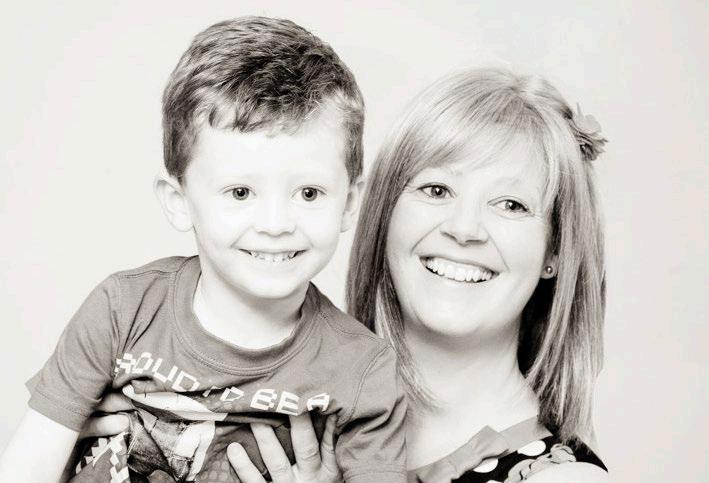

of cancer is often not mentioned let alone discussed during treatment, and people may believe they are going mad when actually what they’re experiencing is normal.”
It’s no surprise then, that people like Deborah and Annie found little or no mental health support on offer during their cancer treatment. In many cases patients are forced to rely on their family emotionally in lieu of professional care and Annie states that her mental health was barely spoken about during her appointments. “I was offered time to think but not time to talk. My mind
offered to me.”
THERE IS EFFECTIVE CARE AVAILABLE, EVEN IF THOSE affected have to work extra hard to seek it out. Barbara from Working with Cancer says that coaching, therapeutic counselling, CBT (Cognitive Behavioural Therapy) and peer support groups can be effective. Emily Hodge—a health psychology specialist who has supported hundreds of cancer survivors through her coaching programmes— says open and honest dialogue around the patient’s feelings should

be a top priority, and that a sugarcoated “be positive” attitude is rarely helpful. “Everyone is different but as long as the person is able to do what they want, and not have another person’s version of recovery put onto them then this is important.”
It’s not until the recovery phase that there is enough time and space to reflect. “When you’re technically better and it’s over,” says Emily, “only then do you have time to sit back and think about what’s just happened and plan ahead.” Just because cancer can be managed and often cured, this doesn’t negate the long-lasting mental implications. There’s no getting around the fact that life after
cancer is significantly different to the life before, and even if recovery had been medically achieved the story doesn’t end there. For those affected —like my very own Papa Fran —the physical pain may have been dealt with but the mental anguish lingers long after the final hospital visit.
Counselling is available via the NHS although waiting times vary.
You can also phone the Macmillan Support Line for free on 0808 808 00 00 (Monday - Friday, 9am - 8pm). The service is staffed by trained experts, offers people with cancer and their loved ones practical, clinical, financial and emotional support.
Working with Cancer workingwithcancer.co.uk
n Love and Remission: My Life, My Man, My Cancer by Annie Belasco amazon.co.uk/Love-Remission-LifeCancer-Inspirational/dp/1911246739
n Deborah’s blog adventuresofasingleparentblogblog. wordpress.com
n Emily Hodge coaching services coachingemily.com
n NHS Counselling nhs.co.uk/conditions/counselling
n Cancer Research UK cancerresearchUK.org
In divorce, pensions can be the biggest asset after the family home and as they can be split in different ways it is important to understand the options available to you. Guy Myles answers these key questions.
What is a pension sharing order?
A pension sharing order is one of the options available in divorce/dissolution of a civil partnership. It provides a clean break between parties as the pension assets are split immediately. This means that each party can decide what to do with their share independently. The courts confirm this via a pension sharing order document.
Does it apply to my state pension - can we split the basic state pension in divorce?
No, but you could claim the basic state pension using your former partner’s state record. However, getting remarried negates this option. Both you and your ex must be over the state pension age before you can claim (given you have not remarried).

Guy Myles is CEO of pension and investment firm Flying Colours. If you have a question for Guy on dealing with divorce email pensionsguy@ flyingcolourswealth.com
Am I restricted by provider? Or can I place my share with another pension provider?
In most cases, you will have the option to transfer out of the scheme and place it with any provider. In some instances, schemes may have restrictions where you are unable to transfer out, and it must remain with them.
What other areas need to be addressed in divorce?
• Updating your will: This needs to be updated after a divorce to ensure the ex-spouse is no longer a beneficiary of your estate.
• Updating or renewing your life insurance: The existing plans need to be reviewed so your ex-spouse doesn’t receive the proceeds.
• Investing the proceeds from your divorce: Proceeds should be invested according to objectives, attitude to risk, retirement planning etc.
Is there likely to be an impact on my retirement age and income? How will they be affected?
Plans and funds previously accumulated on a joint basis are now split, therefore, planning for retirement is vital to re-evaluate and to ensure a solid plan is in place.
Mary, 58 was granted a 25% pension sharing order in relation to her exhusband’s pension. She didn’t know what her options were or what effect it would have on her retirement plans. She wanted to maintain a sense of control; option to make future contributions, how much pension to take and when. As a member of her current employer’s scheme she wondered if the pension share could be invested here. Mary met with a financial adviser, who provided a full review of her options and helped her plan for retirement; assessing all assets, existing employer pension and explained why some options were not available or appropriate: the pension share could not be invested with her existing company pension as the scheme rules didn’t allow this.
Mary now has a pension in her own right with the flexibility to make additional contributions, draw benefits as and when she wants and a full understanding of
what she will be entitled to at retirement. As she will be relying on her income alone, Mary has decided to retire a little later than originally planned. Working toward her plan has given Mary a sense of direction and reassurance that she knows what her future holds. n
Divorce affects many people and as well as the emotional upheaval it can leave people financially vulnerable at what is already a difficult time. You can download the Flying Colours brochure on financial advice in divorce at www. flyingcolourswealth.com/divorce or speak to an advisor on 0333 241 9919.

Are holidays the only time you unwind? Here’s why you should adopt that getaway mindset every day
We feel great on holiday because we let go of everyday stresses and strains. Research has even shown that vacations help health and wellbeing. So whether or not you’re going away this summer, there’s plenty you can do to make sure you benefit from that holiday feeling.
Sleep like a baby when you’re on your holidays but stay awake fretting when you’re in your usual routine? If so, you might need to examine your sleep habits. Sleep deprivation affects our ability to control emotions, make decisions, concentrate and deal with stress.
To reset your sleep pattern, avoid bringing problems to bed. That includes your phone, TV or laptop. Turn the clock round so it can’t stress you out and make sure the room is dark and cool. Aim for at least seven hours’ ZZZs—just as you would on holiday.

Susannah Hickling is twice winner of the Guild of Health Writers Best Consumer Magazine Health Feature
When you’re travelling, you walk around new cities without a second thought. Given that exercise is cheap, healthy and reduces stress, it makes absolute sense to build it into your day. A brisk walk will release happy hormones, such as adrenaline and serotonin, and eases anxiety and mild depression.
Start with just 15 minutes of exercise a day. Cycle to work or pull out the treadmill you stuffed in the spare room and walk while you watch the telly.
Part of the joy of going away is lingering over delicious food with people who are dear to you. Ditch

that tendency to gulp your food down on the go and take up the holiday habit of sitting down as a family for at least one meal a day (no technology allowed). Families who eat together experience less anxiety, less depression and less obesity, research has found.
That moment when you lie back on your beach towel with the sand between your toes, the sun on your face and you sigh with pleasure… Wouldn’t it be nice to have that “ahh” feeling every day?
It’s far from impossible, you’ll be pleased to know, so long as you make time to take a break from the hurly burly of today’s world and
calm your mind and body. Do anything that makes you feel better. It could be a long bath, a massage, a nice cup of tea with a friend. Just make sure you schedule it into your day or week.
Part of the thrill of a holiday is the novelty of discovering a new place and doing new things. You eat at fancy restaurants, sign up for bike tours, have a go at surfing.
But it’s also easy to be a holidaymaker in the place you inhabit. At weekends, check out a new music venue, go for a ramble on a route you don’t know, visit a different museum or have a drink in that interesting-looking pub you’re always walking past. It will get you out of a rut and make you feel alive. A bit like a holiday, really.
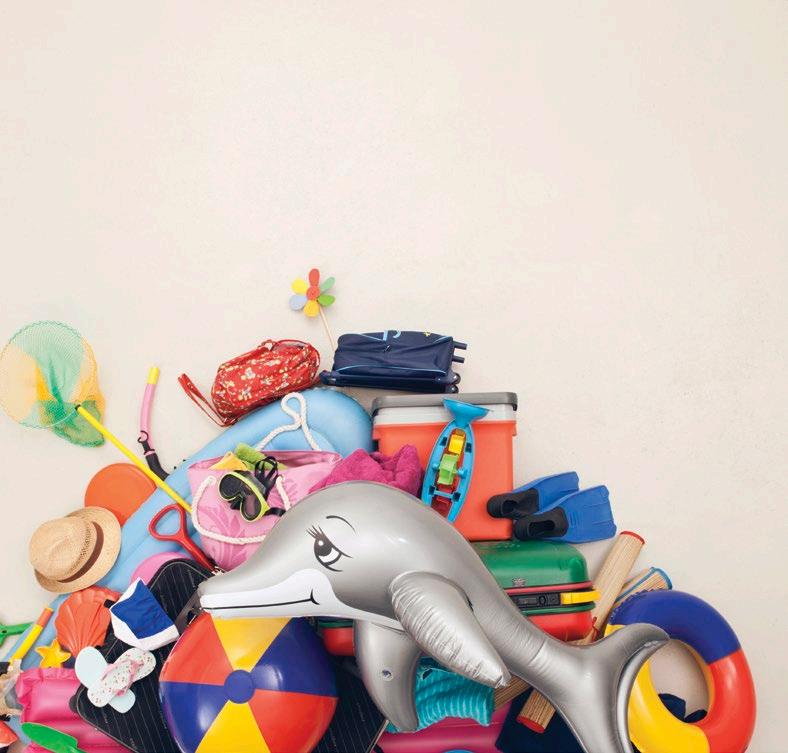
It’s likely you’ve heard numerous claims about adult acne but how many of them are true?

Only teenagers get acne. FALSE
Unfortunately, it’s possible to have wrinkles and pimples at the same time, even if you didn’t have them as an adolescent. Acne in adulthood is more common in women, largely because of hormone fluctuations.
You should treat adult acne just as you would the teenage variety. FALSE Mature skin is less oily and may heal more slowly, so over-thecounter treatments that are aimed at the adolescent market might be too drying. First off, keep your skin clean with a gentle cleansing regimen but don’t overdo it. Your doctor will be able to advise on the most suitable treatment for you. Anti-acne creams that contain benzoyl peroxide, alpha hydroxy acids, salicylic acid, retinoids or tea tree oil can help.
Antibiotic creams tend to be more effective than antibiotic pills, which can lead to antibiotic resistance. Be
patient—banishing zits can take several months.
Too much chocolate causes spots.
FALSE This is one of the many myths that swirl around acne. While it always helps to eat healthily, neither a few squares of Dairy Milk nor fatty takeaways are to blame for your skin blemishes. And while we’re on the subject, dirty skin and too much sex don’t give you spots either.
Sunlight doesn’t blitz the zits. TRUE
There’s no evidence that sunbathing, sunlamps or sunbeds help. They might even do harm if you’re taking spot medication, as it can sometimes make your skin more sensitive to light.
Smoking can cause outbreaks. TRUE
There are so many reasons not to smoke, and here’s one more. It’s not clear how puffing can lead to pimples, but it’s certainly bad for the skin.

Professor Sir Muir Gray, 74, helped pioneer health screening programmes and for many years has had an interest in ageing well. His books include Sod 70! and SodSitting,GetMoving!
How did you become an expert in healthy ageing?
About 47 years ago when I started working in public health, we identified population ageing as a key social trend. Since then I’ve being studying it and doing practical things to help people adapt as their age increases.
How important is it to maintain health and fitness as we age?
Every year after about age 40, people need to become more active. And with every diagnosis you need to do more. If you get Type 2 diabetes, for example, you need to increase your activity and then if a year later you also have arthritis, you need to increase activity again.
What are the most important things we can do to remain in good mental and physical health? The one that’s only been recognised
recently as being particularly important is activity—physical, mental and social. For physical activity, the key is to increase strength, stamina, suppleness and skill.
What should people not do?
They should not accept ageing as being a cause of problems until their nineties! What causes problems are disease and negative attitude.
What quick tips can you offer to improve health and fitness?
Ten minutes a day of brisk walking is wonderful for stamina. Then do ten minutes of exercise for strength and skill. That might involve a resistance band or lying on the floor to stretch your spine. Yoga and pilates are very good for suppleness. But the most important thing is to be positive.
Visit bettervaluehealthcare.net for more
A questionable beauty decision offers Dr Max an unexpected insight into the lives of his patients…
People are definitely staring at me. In fact, I think the women over there are laughing at me. I work in mental health and paranoia is by far the most common symptom when my patients become unwell. I now know how they feel. But the thing is, I’m not being paranoid, everyone really is staring at me. Vanity and paranoia are closely linked. Vanity is wanting everyone to look at you, while paranoia is being convinced they actually are. I’m not usually vain, but even us doctors like to look good once in a while.
Having worked for months without a proper break, I had a holiday booked. I could barely control my excitement and decided to celebrate

Max is a hospital doctor, author and columnist. He currently works full time in mental health for the NHS. His latest book is a self-help guide to using CBT to stop smoking
in style. I was going to look brilliant. Well, that was the plan.
I’ve always been pasty-pale and as I’ve spent so long cooped up inside a hospital, away from even a glimmer of natural light, it’s now possible to get snow-blindness from my skin tone. So in a moment of pure vanity (tinged with madness), I decided to book a fake tan. How very 21stcentury-man of me, I thought, smugly imagining a healthy all-over glow of sun-kissed brown as I sat on the beach. And that was how I found myself standing in a cubicle with a woman called Sharon, being spraypainted orange.
I stood shivering in a postagestamp sized bit of cloth which left so little to the imagination as to be hardly worth the effort of squeezing into it, pretending that this was all very macho, as Sharon studied my inner thigh for streak marks. This humiliation over, I then faced the worst yet: the bus ride home. It’s
hard to say exactly what colour I was. I gave off an odd, radiation-sickness, day-glo orange hue. While I was going for the Hollywood look, I was looking more like the genie from Aladdin’s lamp in an amateur dramatics production. And as I got on the bus, I began to sweat… As the beads of perspiration made their way down my forehead, they left behind neat little lines showing the pastypale skin underneath. That was when people began staring.
A small child gazed at me. “Don’t stare at the man”, his mother chastised. “It’s not nice”. I also realised I had the Midas touch. Although, rather than turning things gold, they became muddy-brown. A woman in a white blouse moved towards me.
“Don’t touch me!” I said, attempting to make it sound like a perfectly normal request. She looked at me with a faint air of panic and moved to the other end of the bus.
The next day, on the ward, I walk into the lounge. A group of patients were staring at me. “Hi, Max” chirped one of the patients.
“What? What?” I asked in an increasingly maniacal pitch. “Why are you all staring at me?”
“We’re not” replied another. I got a grip of myself: of course they weren’t staring at me. I turned and walked out of the room, just in time to overhear someone say, “I think he’s going mad,” and someone else reply “and why’s he turned orange?”
I knew I wasn’t being paranoid.
Q: I find myself forgetting things more and more often as I get older and I’m scared this could be an early sign of serious problems down the road. What can I do to improve my memory?
- Jeremy, 47, RotherhamA: It sounds like you’re worried your increased forgetting is a sign of dementia. Dementia is an umbrella term for a number of conditions that affect memory. Conditions like earlyonset Alzheimer’s or Huntington’s disease can affect people your age, but they’re rare and you’d have to have a significant family history as they have a strong genetic component.
Assuming there’s no family history, then at your age, the chance that this is the start of dementia is very small. People have difficulties with their memory for lots of reasons. Stress and depression can affect our memory. Addressing this can often improve memories on its own. Having hectic lives means we often don’t pay attention to things which would help us remember
them. People often find their memory improves when they take up relaxation techniques or mindfulness.
It’s also normal to forget more as we get older because we have more to remember. Think of it this way: in our forties we have twice as many memories as when we were 20. People expect a lot from their memory—often too much. Rely on your memory less for important things. Write lists, keep a diary for important dates and set reminders. There’s no consensus on whether “brain training” games can stave off dementia, but they can help improve memory in general.
There are also various books which have techniques and tips for using your memory more effectively. How To Remember Everything by Richard Wiseman is good. Check out our own memory expert, Jonathan Hancock, on page 56, for more advice for improving your memory.

Got a health question for our resident doctor? Email it confidentially to askdrmax@ readersdigest.co.uk





Our memory expert Jonathan Hancock explains how stories boost your chances of remembering as well as providing exercise for your brain
Politicians pepper their speeches with stories to interest, engage—and, crucially, to make sure we remember. Good teachers will often invent a story to help students learn an important list. Read a familiar book to a child and you’ll see how adept even very young brains are at retaining huge amounts of information through the steps of a story. We were using stories to remember vital advice and pass on treasured cultural knowledge long before anything was written down. Stories can provide our memory with all the structure, imagery, sensory
stimulation and emotional engagement it needs to work wonders.
For example, the colours of the Olympic rings are: BLUE, YELLOW, BLACK, GREEN and RED. To learn them in the right order, you could make an imaginary visit to the Olympic stadium, and “see”…a huge whale (blue) sitting in the stands, peeling a banana (yellow), only to find coal inside (black), which it discards under a nearby Christmas tree (green)—from behind which Santa Claus appears (red).

Look for ways to invent simple, striking stories to remember shopping lists, things to pack, people to visit, jobs, facts or ideas.
THE CHALLENGE: TO MEMORISE ALL 14 OF SHAKESPEARE’S COMEDIES:
All’s Well That Ends Well; As You Like It; The Comedy of Errors; Love’s Labour’s Lost; Measure for Measure; The Merchant of Venice; The Merry Wives of Windsor; A Midsummer Night’s Dream; Much Ado About Nothing; The Taming of the Shrew; The Tempest; Twelfth Night; The Two Gentlemen of Verona; The Winter’s Tale
The technique: choose a key word from each play’s name, then invent a story to link these 14 words, one after the next, in a vivid, memorable way.
The test: use your story to recover the keywords, each of which should trigger the name of a play. Then push your brain to get even fitter: see how quickly you can go back through the story and reel off the whole list—entirely from memory.
Wellwoman, the UK’s No1 supplement for women, introduces its first ever comprehensive multivitamin specially developed with a unique blend of 23 nutrients to help safeguard dietary requirements for those following a vegetarian and vegan diet, including vitamins B12, C and D. It also contains higher levels of iron plus vitamin B6 and pantothenic acid which help reduce tiredness and fatigue. Wellwoman Vegan has been officially registered with the Vegan Society and the Vegetarian Society
WELLWOMAN VEGAN
RRP £10.85 FOR 60 CAPSULES
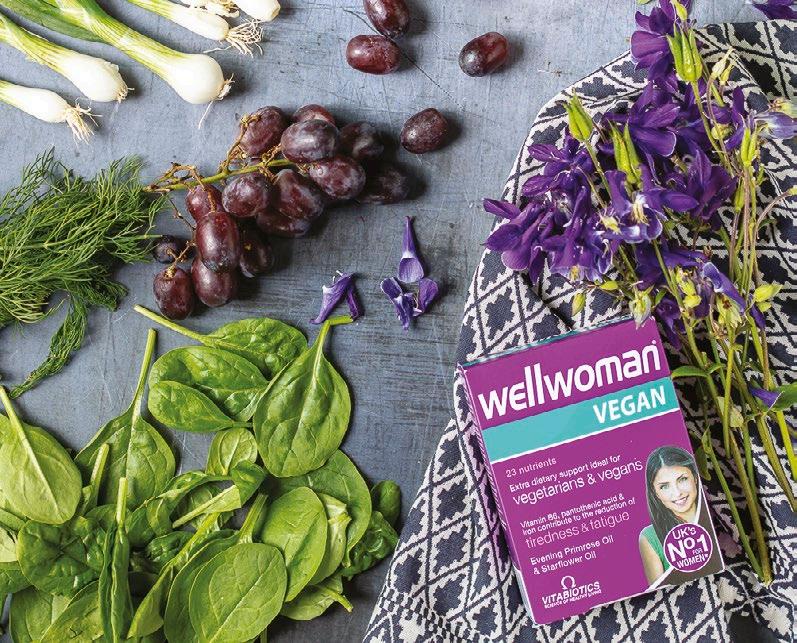
I had no idea there was this kept-hidden world all around me

MY FATHER DIED UNEXPECTEDLY OF cardiac arrest in his bed in the spring of 2008. He was 80. The next day, we all got the phone call. But my sister Katharine, 100 miles away in Montreal, Canada, received her message differently.
“It was about 4:30am,” she said at his funeral, “and I couldn’t sleep, as usual, when all of a sudden I began having this amazing experience. For the next two hours I felt nothing but joy and healing.”
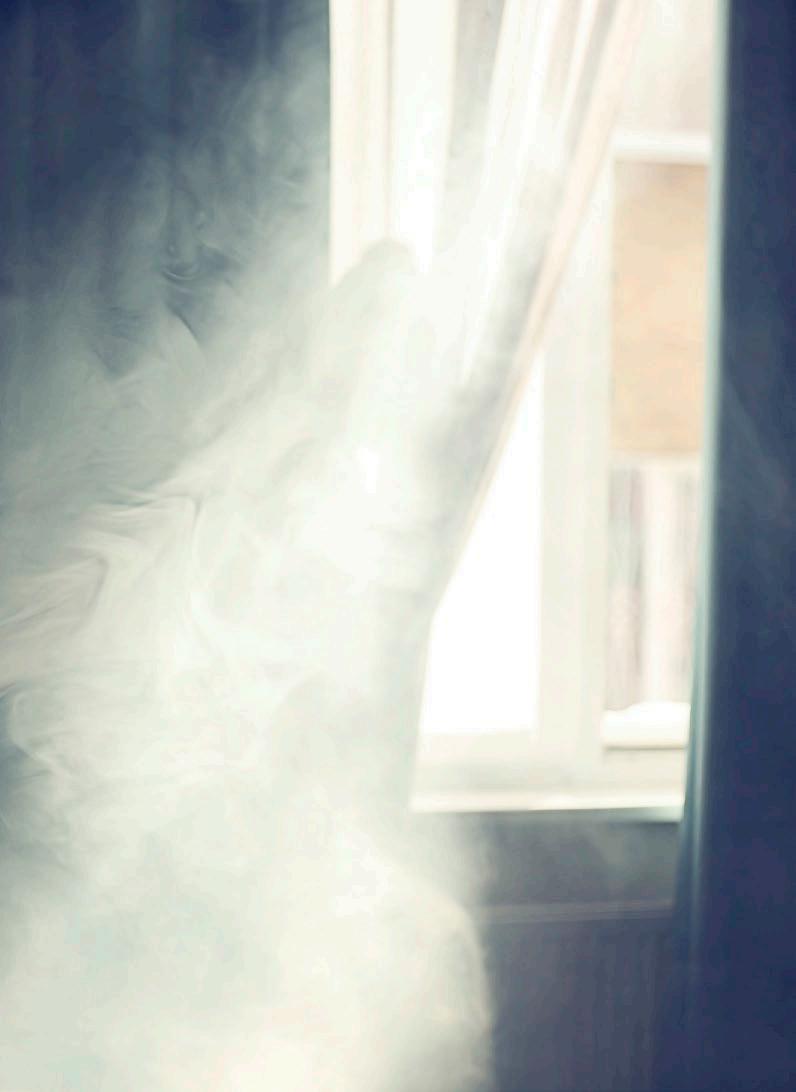
She sensed a presence in her bedroom. “I felt hands on my head, and experienced vision after vision of a happy future.” Unaware that our father had died the night before, she described her experience to her elder son the next morning, and wrote about it in her diary.
We were in shock. Had Katharine had a vision? My sister wasn’t prone to spiritual experiences. Stress she was familiar with, as the mother of two teenagers. Laughter she loved. Fitness of any kind. Fantastic intellect, fluent in three languages. But she hadn’t been paying much attention, in essence, to God.
Later, I would learn that this sort of experience when someone has died is startlingly common. Families shelter their knowledge like a delicate heirloom. At the time, I only understood what a gift this was for Katharine, who was about to face her own death, from breast cancer.
Just two months after Dad died, Katharine was moved to a hospice. In her final ten days, she spoke little, yet seemed profoundly content.
“Wow, that was strange,” she remarked once upon waking up, her expression one of smiling delight.
“I dreamed I was being smooshed in flowers.” She looked gorgeous, as if she were lit from within. Sometimes she would have happy whispered conversations with a person I couldn’t see. At other times, she would stare at the ceiling as a full
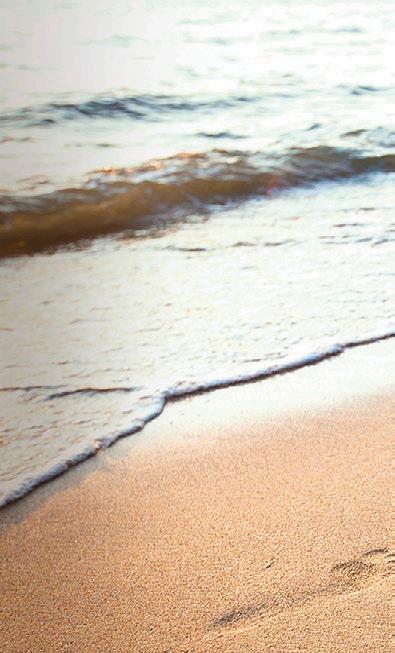
panoply of expressions played across her face—puzzled, amused, sceptical, surprised, calmed—like a spectator in a planetarium.
The sister with whom I’d shared every secret couldn’t translate this for me.
“It’s so interesting,” she began one morning, and then couldn’t find the language. Forty-eight hours before she died, she told us, “I am leaving.” She left in silence and candlelight, while I lay with my cheek on her chest and my hand on her heart.

“That autumn and summer, people came out of the woodwork to tell me their tales”
WHY HAD MY sister had a powerful spiritual experience in the hour of my father’s unexpected death? Why did she become increasingly joyful in her dying experience? What would she have told me if she could?
That summer and autumn, people came out of the woodwork to tell me their tales. Some were friends and
colleagues, others were strangers sitting beside me on a flight. If I told them about my father and sister, they reciprocated. Almost invariably, they prefaced their remarks by saying, “I’ve never told anyone this, but…” or, “We’ve only ever discussed this in our family...” Then they offered extraordinary stories—
deathbed visions, sensed presences, near-death experiences, sudden intimations of a loved one in danger.
“Often we are held back from embracing the comfort and reassurance of spirits”
A friend, the director of a large music company, told me that, as a boy, he had come down to breakfast and seen his father, as always, at the kitchen table. Then his mother broke the news that his father had died in the night. He briefly wondered if she’d gone insane. “He’s sitting right there,” he told her. It was the most baffling and unsettling moment of his life.
I had no idea there was this kept-hidden world all around me. I wanted to understand what we knew about these mysterious modes of awareness. For four years, as a journalist, I pursued the questions.
A 2014 STUDY by The Palliative Care Institute and Hospice Buffalo in upstate New York found that 60 per cent of their dying patients, over an 18-month period, had comforting visions and dreams of living or deceased family members in the lead-up to their own deaths.
There is pain in loss, and then there is further pain in the silence
borne by fear of being dismissed. Tell someone about it and the explanations come: Hallucination. Wishful thinking. Coincidence.
I attended a Christmas party with old university friends, and caught up with a man who works for a bank. I told him some of what had transpired with Katharine. He said gently: “I don’t mean to be unkind, but it’s very likely that she was imagining these things.” Why did he feel he could speak with authority about what the dying see?
SPIRITUALITY USED TO be considered an ordinary part of the human experience, but now it qualifies as an extraordinary state requiring extraordinary evidence. Why should this be? It has to do with the rise of scientism, a school of thought that believes anything that eludes scientific measurement cannot exist.
For my Irish and Scottish Highland ancestors, an extraordinary way of knowing things was always embedded comfortably within their culture. One summer afternoon, my elder aunts and cousins, women in their eighties and nineties, all gathered around the dining table at our summer cabin on Ontario Canada’s Stoney Lake.
Here, my grandmother had painted a saying on the wall: “Fra ghosties and ghoulies and long-leggedy beasties, and things that go bump in the night: the guid lord deliver us.” A playful

nod to our witchy Celtic ancestresses. But now we had come to talk of such things seriously for the first time over our lunch.
We spoke of how greatgrandmother Maude had absolute confidence in her way of knowing things; how, when my grandfather telephoned his mother to report her husband’s fatal heart attack on his sailboat, Maude replied disconsolately: “I know.”
My Aunt Bea recalled, “Granny would be in the living room reading a book, and she’d suddenly slam it down and mutter, ‘Damn! Soand-so is coming and I don’t want to see them.’ Sure enough,” Aunt Bea said, “so-and-so would show up ten minutes later.” The Norwegians have a word for this uncanny anticipation of visitors: vardoger .
Our Highland ancestors called the perception of a person’s double “second sight.” Cousin Marion
offered that she had been working at a resort in Banff, Alberta, as a teenager when the hotel caught fire, prompting her mother in Montreal to wake in distress and call her. And my mother, the uber-rationalist, conceded she awoke suddenly one morning in her university dorm and phoned my grandmother, whom she somehow knew to be in crisis. Granny was; her dearest friend had died that night.
Each experience was different, but all were ways of knowing, and they tilted the world on its axis for a moment. Why hadn’t we talked of them before?
and Nobel Prize winner Brian D Josephson told the New York Times in 2003: “There’s really strong pressure not to allow these things to be talked about in a positive way.”
Harold Puthoff, a physicist at
the Stanford Research Institute appointed to oversee the CIA’s remote viewing (or clairvoyant) experiments in the 1970s and 1980s, described this pressure in conversations with psychoanalyst Elizabeth Lloyd Mayer, as reported in her book Extraordinary Knowing, published in 2007. “The evidence we had (on clairvoyance) was rock hard,” he wrote. “I saw that. But I was having terrible trouble giving up my beliefs about how the world worked, even in the face of evidence that said my beliefs were wrong.”
“60 per cent of dying patients had comforting visions and dreams”
emotional impact is so great that it remains a lasting source of comfort to the recipient and often has the power to alter their own perception of what death means. For them, whether it’s dismissed by others as ‘simply coincidence’ is irrelevant. The simple fact that it’s happened is usually enough.”
But often we are held back from embracing the comfort and reassurance of spirits by a society that belittles the experience: “I don’t mean to be unkind, but your sister was clearly imagining things.”
The prejudice in the Western world is beginning to change, particularly in the area of grief therapy, as counsellors take note of other cultural approaches. One influential study of Japanese widows found that their continuing bond with the presence of their deceased spouses— setting up altars in the home, leaving food, incense—made them much more psychologically resilient than their British counterparts.
Neuropsychiatrist Dr. Peter Fenwick of King’s College, London, has commented on the “sensed presence” experience. “Often its
ONE AUTUMN, with my sister Anne and her husband, Mark, we spent the afternoon tucking the cottage up for winter. Much of what we do confounds the squirrels, who appear to have spent most of their autumn hiding acorns. Each time we strip a bed, acorns tumble out. Anne and I keep laughing.
As I shutter the windows, I wonder what will have happened when they are next thrown open to soft spring light. What will have transpired in my life, in ours, in the history of the world? Who else will have died?
But the grace I see now comes from the comfort I draw from this tribe, with my cousins and aunts and uncles and friends. The extended family has drawn ever closer. It’s like a footprint in the sand that needs to be filled in. Where the water rushes in, where love rushes in.
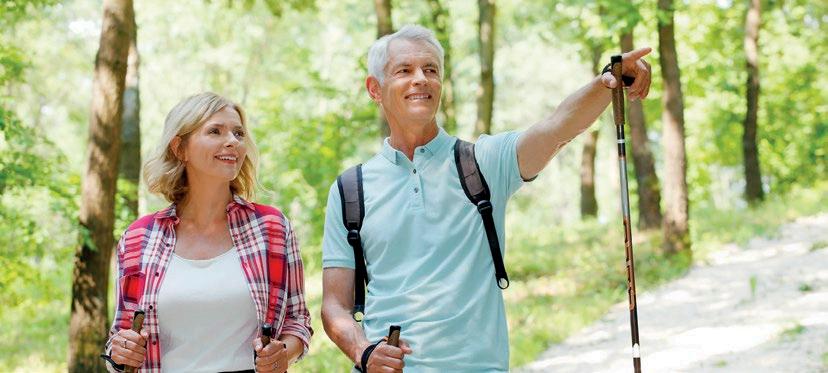
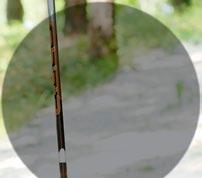

There isn't a more British way to spend a summer afternoon than enjoying the sun in our many parks…
BY ANNA WALKER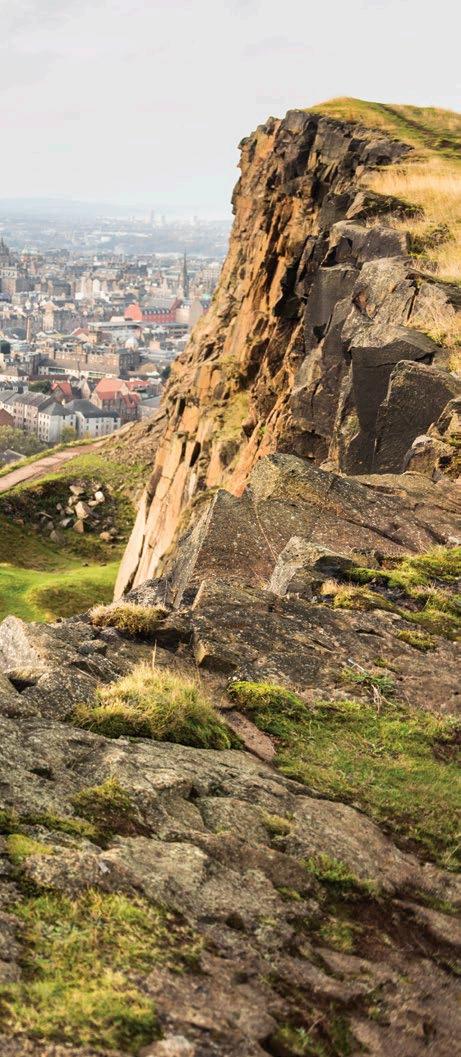
The dramatic landscape of Holyrood Park, with steep pathways and volcanic cliff faces, offers unparalleled views over the city of Edinburgh. A royal park since the 12th century, the beautiful Holyrood Palace, situated on the outskirts of the estate, remains one of the Queen’s primary residences.
Take a moment to relax beside one of the many mini lochs, enjoy a ramble along the yellow-flowered hillocks, set off for the iconic Arthur’s Seat or explore the wind-whipped hillside ruins of the 15th century St Andrew’s Chapel.
Says ranger Martin Gray, “Visitors can explore the beautiful natural heritage and incredible history which can be traced as far back as 5000 BC. Home to the spectacular hills and crags that shape Edinburgh’s iconic skyline, visitors can climb the ancient volcano, Arthur’s Seat, for 360-degree views of Edinburgh and the Lothians, while our rangers offer the chance to learn about the special place they protect with guided walks, group tours and other events.”
This seriously stylish park won the prestigious Fields in Trust “Best Park” award in 2017, and deservedly so. With an Art Deco café, Italian marble fountain, pretty bandstand and picturesque boating lake, it’s an elegant space to enjoy a summer’s afternoon.
Visitors can spend the day rowing on the lake and exploring the woodland and formal gardens. There’s also a 5000-seat cricket ground, 18-hole golf course and model village within the park, making it well worth a repeat visit.
Says Fields in Trust Chief Executive Helen Griffiths, “Stanley Park topped our public vote ahead of three other parks. Designed by celebrated landscape architect Thomas Mawson in the 1920s, the park was described as ‘fabulous’ and ‘the centre point of Blackpool’ in its public nomination. Whilst it’s a popular space for summer visitors, the volunteer Friends of Stanley Park group assist the council to keep the park’s standards high throughout the year.”
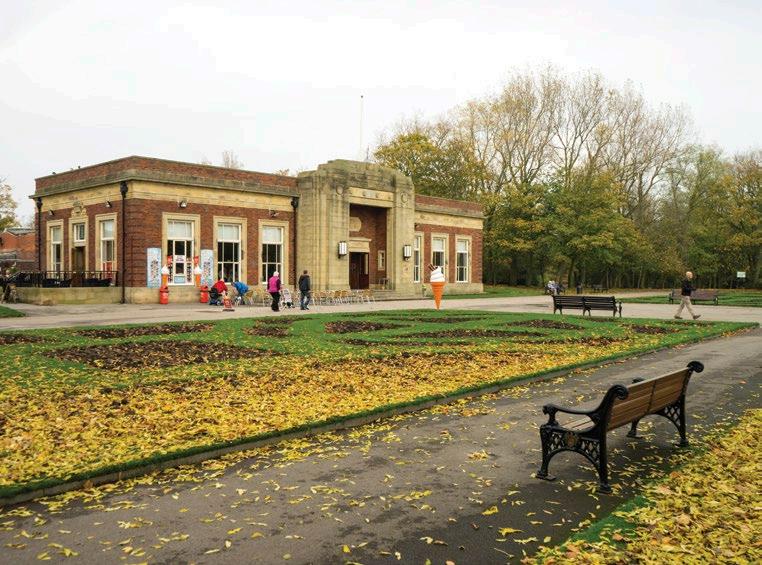
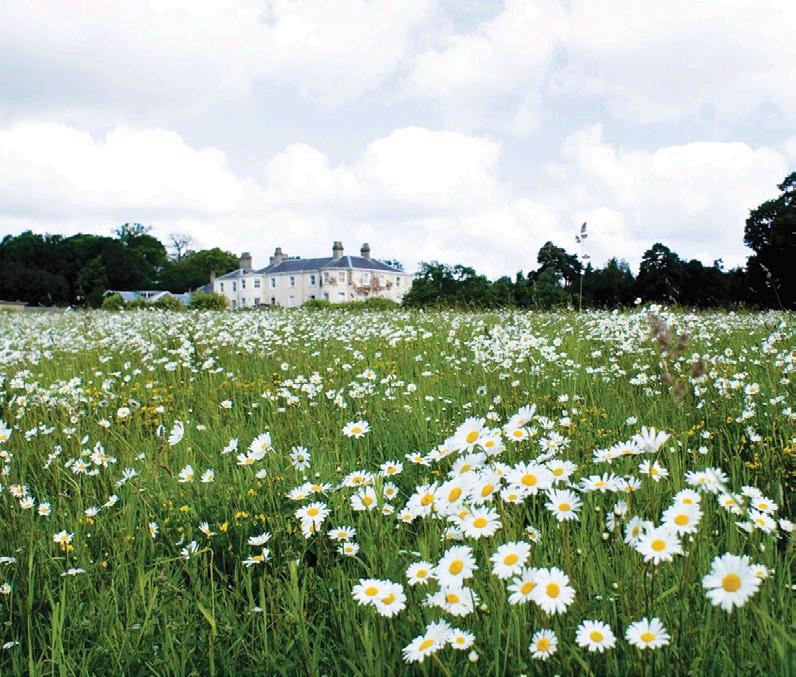
Perched prettily on the outskirts of Norwich, Catton Park offers visitors 70 uninterrupted acres of green space, from wild flower scattered meadows to enchanting woodland. Developed over the years by the residents of the private estate of Catton Hall, the park was commandeered by the military during the Second World War and ploughed up for food production.
Thanks to lottery funding, the park was opened to the public in 2007.
Catton Park hosts a range of events over the year, from fun runs to car boot sales and outdoor theatre, so a casual dog walk can easily turn into an exciting day out.
Says Old Catton council clerk Sarah Vincent, "A real sense of community radiates from the park bringing people together, whether walking pets, exercising, reading under a tree or simply enjoying the landscape."

Following the track of the former Birkenhead Railway Route, the creation of this scenic park required extensive work, removing over 30 miles of railway track and accompanying sleepers.
Opened to the public in 1973, the old 1950s station platform for Thurstaston has been preserved as part of the park so that visitors can still enjoy the heritage of the old railway.
Flora and fauna abound here, and visitors share the space with foxes, badgers and over ten species of butterfly. The River Dee’s estuary also attracts a wide variety of birds, including adorable short-eared owls, so be sure to pack your binoculars.
Head to the park’s boulder clay cliffs—which stretch to 60ft high—for an unbeatable view over the entire park before resting your legs at the café or one of the many picnic areas.
The oldest public park in London, Victoria Park (affectionately known as the People’s Park) was opened in the 1800s after the cholera outbreak saw 30,000 local residents campaign for a clean space where they could enjoy fresh air away from the smog of the city.
At 86 hectares, the park is huge, stretching all the way from the River Thames at Limehouse, along the Regents Canal, through to Mile End.
The Chinese pagoda is one of the many highlights of a visit to Vicky Park. Erected in 1847, the structure was originally kept seperate from the rest of the park, leading local children to speculate that it was actually home to a Chinese family, who would sneak out at night in order to feed the ducks.
Victoria Park has won the Green Flag People’s Choice Award for most popular public green space three times, the only UK park to achieve the prestigious trifecta.
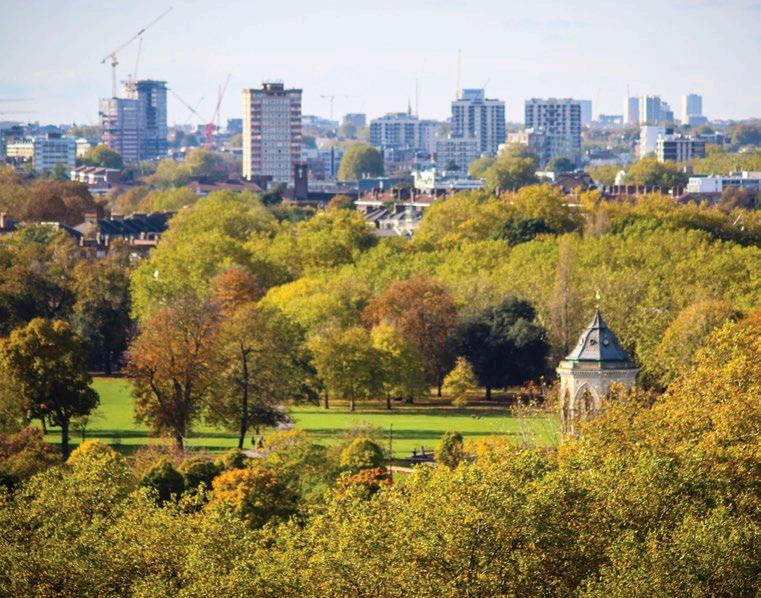
Centred around a beautiful lake where enthusiastic fishermen catch carp and tench, Platt Fields has been enjoyed by the public for over 100 years. Originally intended as an antidote to the sprawling industrialisation of Manchester, Platt Fields were envisioned as the “green lungs of the city”, providing Mancunians with an escape from the pollution and smog of the workhouses.
Thanks to a significant rejuvenation in the 1980s, the park
has once again become a place of escape and relaxation. There’s a huge variety of gardens nestled in the grounds, including a themed plot containing only blooms mentioned in Shakespeare’s plays and sonnets. There’s also an educational garden, environmental area, Jubilee gardens and a community orchard garden known for its roses.
Sports fans can enjoy bowling greens, basketball courts, football pitches, roller hockey, tennis courts, cycle paths and a skate park as well as a BMX track.
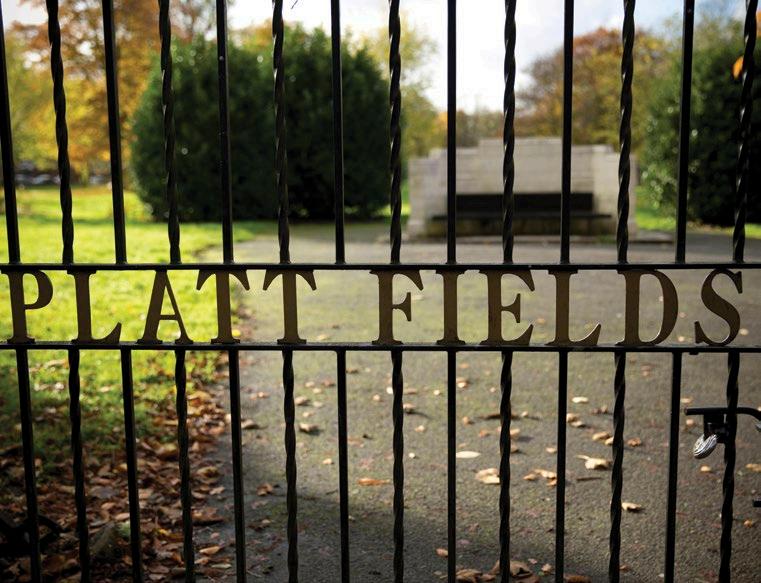

Described as the “green heart of the city”, Cardiff’s Bute Park is an urban oasis. Indeed, surrounded by towering trees, award-winning horticulture, a calming river and thriving wildlife, it’s easy to forget you’re in the city at all.
Formerly the grounds of the statuesque Cardiff Castle, Bute Park attracts over a million visits every year and is so sprawling that it could easily house 75 football pitches, making it one of the largest parks in Wales.
Famous for its trees, the park boasts over 3,000 different species
and the greatest number of “champion trees” (recognised as the tallest or broadest examples of their species) in the UK. Eagle-eyed visitors can spot woodpeckers, herons and even otters gambolling in the river.
Throughout the summer months Bute Park plays host to Cardiff’s Open-Air Theatre Festival and an interactive Jurrassic Kingdom dinosaur event—perfect for entertaining the little ones during the long summer holidays.
Do you have a favourite British park? Email us about it at readersletters@ readersdigest.co.uk

I looked at moving costs and worked out that a Stiltz Lift would be cheaper. The lift has already made things much easier. It’s been the best decision. Ms. Turner, Hereford “ “
SEPTEMBER 1955
When the suggestion is made that it would be nice to attend a party, a hardworking man has the right to demand one condition of his wife. That is that they go home early.
He must do more than that. He must make the point emphatic. He must protest that he cannot go out and stay up until all hours and still do justice to his work.
He must insist that it would not be fair to his employers to go to the office the next morning exhausted. He must remind her that his performance is highly important to the general wellbeing of the family.
He must make it clear that he has his own health to consider. Do not the doctors say that a man who is worn out physically is likely to pick up any germs going around?
He may remark that it is all very
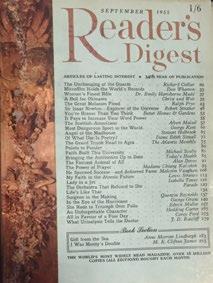
well for members of the family who can lie in bed in the morning to stay up until long after midnight.
He questions whether it is worthwhile going out to these evening parties at all. They are so noisy that nobody can hear what anybody else says and, consequently, the guests can’t enjoy each other’s company. And they’re tempted to eat indigestible food and pay for it the next day.
So he wants it to be fully understood that he is going as a personal favour, and that if the condition under which he goes is not respected this will be the last time. Thus threatened, she keeps her mind on the time, and, at a reasonable hour, suggests that they go. At this he looks surprised and hurt, and exclaims: “What, go now? Why, the fun is just beginning!
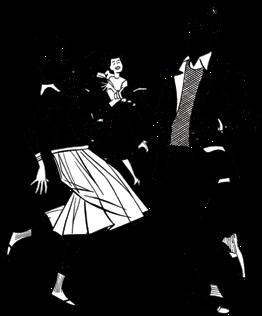
Jon Sopel has presented for the BBC for 16 years and became their North American Editor in 2014. He lives in Washington DC and London
People would listen to each other and be challenged by views that are not their own. In the UK, news broadcasters have to adhere to certain rules of impartiality but in the US there are no such obligations. This means the media is politically slanted, leading to an intolerance of other people’s views dependent on what media broadcast they watch or listen to. Being open to a plurality of opinions is vital for open-minded discussions and democracy.
Children would all learn a foreign language. I thought it was a terrible decision by the Labour government in 2002 to make it optional for children over the age of 14 to study a second language. Now three quarters of UK residents are unable to hold a conversation in any language
except English. It seems very complacent—and limiting—to assume that everyone will speak our language.
I’d encourage greater day-to-day civility. On my walk to work in Washington DC people on the street say good morning to each other. When people get in a taxi they always say hello to the driver before giving their requested destination. That doesn’t happen in the UK very much anymore and I think it’s a real shame. I love the sense of community in the US; people know their neighbours and look out for them. A little bit more civility and courtesy around the globe would make the world rock along in a more pleasant way.

I’d put strict regulations on what can be posted on social media. Social media is broadcasting and the platforms from which it is delivered must be fully accountable for the content that goes out.
Money would not be the driving force behind the US elections.
Hundreds of millions of dollars are spent during American elections. If you become a Congressman your main job is to start fundraising for the next election. Of course that’s very compromising because you have to do all sorts of deals with those organisations with the most money— often in the pockets of the National Rifle Association (NRA).
A small state governor election can see more money being spent than the cost of the whole UK general election. Limits need to be put on these amounts.
We’d be more attuned to our surroundings. I really hate it when people are busy talking on their phones in a shop and don’t acknowledge the existence of the cashier helping them.
Also, why does everyone seem to want to shut out the noise around them by walking down the street with headphones on? And don’t get me started on littering…
Let’s take time to engage in friendly discourse with each other, and be more in the moment and aware of our surroundings.
We’d have more appreciation for our armed forces. We can rant and rail at the politicians who send our soldiers to war but we must never blame the soldiers. People who serve their country deserve respect.
It’s grotesque to think that soldiers who served in Iraq or Afghanistan have been spat on by members of the public. Many of us had parents or grandparents who served in the two World Wars and, although we’re now living through a period of relative peace, we do so thanks to those who made the ultimate sacrifice for us.
I’d change the US gun laws. The statistics are staggering but the Second Amendment, which states that it is “the right of people to bear arms” seems sacred to Americans.
The young people involved in the Florida school shooting in February, who saw their friends gunned down, have stood up and are championing for change. After all, while most people in Congress have fired an AR15 rifle at one time or another, none of them have been on the receiving end. But these kids have. They’re not intimidated by the NRA or politicians on Capitol Hill and that’s exciting.
As told to Caroline Hutton
Jon Sopel’s book If Only They Didn’t Speak English: Notes from Trump’s America, is out now, published by BBC
Here’s how to get the most out of every pill
The digestive process helps the body absorb vitamins and minerals. Taking supplements on a full stomach aids absorption and also helps prevent nausea, a common side effect. Of course, there are exceptions—in this case, it’s iron. Take it on an empty stomach for better absorption.
1 2
Vitamins and minerals can interact with prescription and over-the-counter medications, sometimes making one or the other less effective. For example, calcium may interfere with the absorption of levothyroxine, a thyroid medication. On the other hand, supplements sometimes help drugs work better. Studies show that antidepressants are more effective when taken with omega-3rich fish oil. The worst-case scenario: when

supplements excessively amplify a medication’s effects. For instance, fish oil, vitamin E, and gingko are natural blood thinners, so if you take any of them together with an anticoagulant, your blood may become too thin, raising the risk for internal bleeding and hemorrhagic stroke. Ask your doctor or pharmacist for guidance before starting on any supplements.
3
There are vitamins and minerals that work well together. Vitamins D and K2 help calcium absorption, and vitamin C helps the body absorb iron.
4
Some vitamins and minerals are best taken separately. For example, zinc and copper—in large doses—compete with one another, as do iron and zinc. Calcium inhibits iron absorption, so take iron in the morning before eating, and calcium in the evenings, when it can calm your mood.
5
The live bacteria and yeasts in probiotics aid digestion and help nutrients be assimilated. Plantbased digestive enzymes help with the absorption of nutrients that may normally get destroyed by stomach acid.
6
The cultures in probiotics need to be stored and shipped cold to stay active. Likewise, omega-3 fattyfish oil tablets should be kept in a cool dark place so they stay effective. Some experts even suggest freezing them for this reason.
7
While studies of vitamin E are mixed, it’s a powerful antioxidant, and should be taken in its natural rather than synthetic form if possible. This way your body will get more of the good stuff. Look for a D on the label, which indicates that it is natural; DL indicates synthetic.
8
Your morning coffee may interfere with the absorption of vitamins and minerals and may also leach calcium from your bones. Minimise these risks by consuming no more than three cups a day, getting enough calcium, plus vitamin D, and waiting about 15 minutes after your coffee before you take your vitamins.
9
B Vitamins tend to give people energy and are, therefore, best taken at the start of the day. Other supplements can make you drowsy, so they’re best to take in the evenings. Magnesium is an example of this: it has a calming effect.


"SO,
I asked, as Nan walked away from the escalator.
"No," she said defiantly, heading for the staircase, "I don't like them."
My mum—Nan’s daughter— had warned me about this. But at 72, Nan was about to leave England and fly for the first time; I'd rather hoped that the novelty of a moving staircase could also be accommodated. It couldn't, which meant I ascended the stairs to the airport's departure lounge slowly, finding myself worrying once more about the logistics of our travelling alone together.
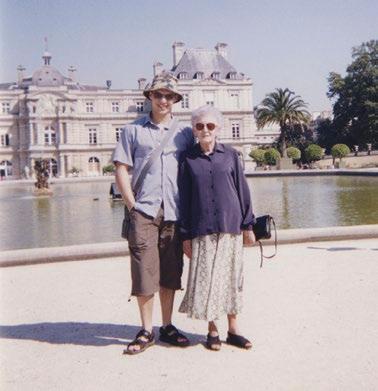
make was the result of a conversation we’d had the previous year. Stood by her stove, watching her cook, I’d asked Nan if she had any regrets. She’d surprised me by saying instantly, "I always wish I'd gone to Paris."
It was the way she made it sound, like an impossibility. It was as if the fact that she’d not gone there with Granddad meant she would never go. That was what made me decide I would take her. Months later, I graduated university and— empowered by my first wages— promised her for Christmas that I’d take her to the French capital.
Now, in summer, waiting for our plane, I asked Nan if she'd prefer tea or coffee. She replied by asking if they had brandy. I smiled. First, because it was only 9am, but more because Nan usually drank whiskey and I loved the nod to France in her choice of Dutch courage. I duly ordered a beer and a brandy.
As this day had approached, I'd become increasingly anxious. Besides banal worries about something going wrong or an emergency of some sort, I was concerned about how it would be for just the two of us to be together for 60 hours straight. Nan and I were close—she'd been widowed 18 years previously, and for my brother and I she was the fifth member of our nuclear family—but although we often talked with an ease and enthusiasm that delighted us both,
“As we wobbled into the air, Nan squeezed my hand, eyes closed, seeking assurance”
our conversations didn't always catch light. And when had we ever spent longer than a few hours alone?
Halfway through our drinks, I remarked on something my dad had said the previous night. Nan said, "You know that's what he's like, love. Doesn't want his little boy to grow up," launching us into a dissection of her son-in-law. The subject was familiar but the conversation felt fresh and nuanced, and I chided myself for having doubted our ability to always talk freely.
My nerves returned, however, when our plane turned out to be much smaller than I'd anticipated. I’d only previously flown on bulky jumbo jets; this flimsy plane with its mere 12 rows of seats—two on one side, one on the other—made me uneasy. As we wobbled into the air, Nan squeezed my hand, her eyes closed, seeking assurance and I feigned composure.
AT CHARLES DE GAULLE, taxis seemed too alien and expensive, so we made the trip to our hotel by bus, and all subsequent journeys around the city via public transport.
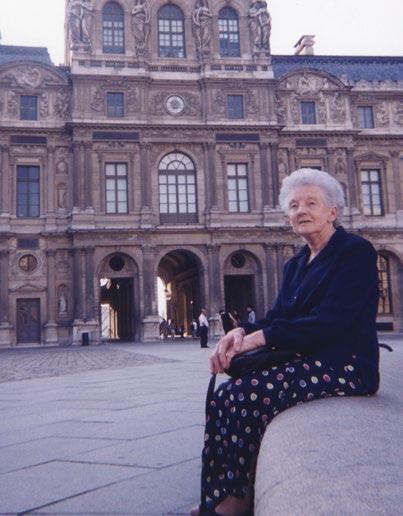
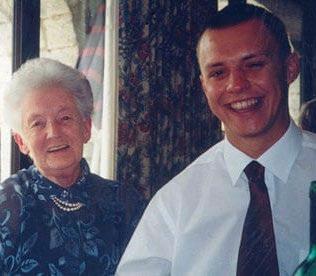
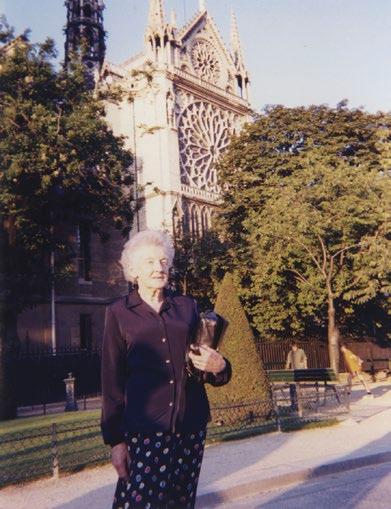
“I watched the torrent of novelty bombarding her and saw how far she'd travelled"
The hotel was prosaic and plain but perfectly Parisian. A tiny metal lift rattled to the top floor, where our attic room twin beds waited, laughably separated by only the width of their sheets.
I was relieved to discover, when
we headed out to explore, that the nearby Metro stop was shallow and without an escalator. After I’d navigated the ticket machines and the station's tunnels Nan asked, perplexed, how I’d known what to do. Aboard the train rushing into the
city’s centre, I watched the torrent of novelty bombarding her and saw just how far she’d travelled that day.
ALIGHTING AT THE HOTEL DE VILLE, we stepped to the river to behold the grand architecture of the Seine’s islands. I was constantly aware of overexerting Nan but Paris is a city you must walk in, and so we did, strolling to the Louvre’s courtyards and from those to NotreDame. Despite my frequent inquiries throughout the trip, Nan always said —and I believed her—that she was happy to keep going.
Nan took pride in the apparent worldliness of her grandson and I was emboldened by this faith, inflated further each time she was overly impressed by something that I knew about Paris or French food or culture. Sitting outside the NotreDame, I told Nan which country or region each of the passing tourists was from. "But how do you know?" she wondered.
We had dinner in an over-priced, overly touristic café: the food was generic and a menu written in French and English punctured the atmosphere a fraction. It was fun later, however, to repeat our morning drinks order as une bière et un cognac and to sense in that first request the words becoming a motif.
The second morning we ambled around the gardens of the Palais de Luxembourg, then the Jardin des
“Nan took pride in the apparent worldliness of her grandson ”
Plantes. And for lunch, we went to an old café near the botanical gardens, where I knew there would be no English on the menu.
The dark-haired girl who greeted us was attractive and my age, her smile disappointingly impersonal. But as I asked, in stuttering French, for the table in the front bay window, her eyes flicked curiously between her guests and whatever she grasped of our situation, from then on, she became warm and attentive; happy it seemed to partake in whatever adventure we were on.
Nan was always wary of foreign food—even though she loved the smell of garlic, she considered it too exotic to eat—and so she ordered pommes frites and salad. Her trip to the bathroom, however, gave her an authentic experience. Our waitress led her by the elbow to the back of the café, but when Nan returned she leant across the table to say, "I hope I went in the right room."
"I'm sure you did, why?"
"There was just a hole in the ground, which I had to crouch over...."
"Well, now you've peed like a real French person, Nan!"

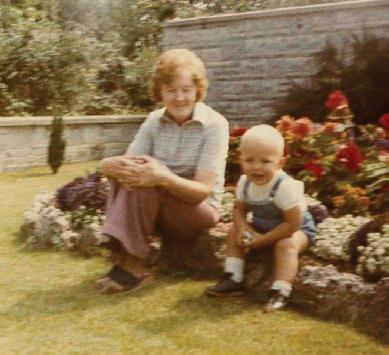

Afterwards, we crossed the city by Metro, but when we went to exit the station we met two towering escalators, that flanked a neck-cricking central staircase.
"Come on, Nan. Look..." I said, extending my palm optimistically to the upward escalator.
"We'll be fine," she said, starting for the staircase.
Though it was her choice, I felt dreadful that Nan had to make that mountainous climb— and to compound my guilt, the twin escalators provided two uninterrupted streams of commuters who stared unflinchingly; curious, pitying and probably disgusted, wondering what weird game I was playing, making her climb.
We spent the afternoon meandering the streets and leisurely taking coffee. Then, come evening we explored the Latin Quarter. When an alleyway brought us to an Irish bar, Nan said "Let's go in here," taking the lead for the first time.
I thought she’d been drawn to the familiarity of a pub but, in fact, she was thrilled by the hybrid foreignness of it, one alien country nested in another. The menu, though, contained dishes she might have cooked herself and we each dined on Shepherd's Pie.
AFTER DINNER, WE WALKED until a lamplit square brought us to a halt. Open at one end, its three closed sides housed restaurants whose tables, dressed in classic red and white check, spilled across the entire cobbled piazza. The tables were full, and waiters zipped among them, cutting through the buzz of conversation and gesticulation and the dance of knives, forks, wine glasses and bottles. For good measure, a violinist played. We stopped to stare, but soon I was more absorbed by Nan’s face as she stood, transfixed by the Paris of her imagination come to life.
Eventually we begrudgingly walked on, but our luck was good—as we left through the square’s open end, a small round table outside a bar became free. In the light illuminating the bar’s sign, we ordered une bière et un cognac and sat chatting, gazing on the square, and watching the night's
“I was absorbed by Nan’s face as she stood, transfixed by the Paris of her imagination ”
crowd stroll by. The silences were long and comfortable—and in them I felt, at last, Granddad's absence move about us.
Later, as we walked back from the Metro station to our hotel, Nan said, "Oh, Lee, I could have sat at that table all night."
"Really?" I said. "I'm so sorry. I thought you were tired… We should have stayed."
She offered no counterpoint, no suggestion that she thought I was tired too.
"Shall we?" I asked, nodding toward a dimly lit door—by no means the Latin Quarter—a bakery-type café offering little charm sat half open, snoozing on the job.
"Go on, then," said Nan, and we mounted the steps to join a couple of locals in the sleepy room.
"Une bière et un cognac, s'il vous plait."
When someone is gone, as Nan now is, the sadness at what's lost nestles with a lament for what will forever remain unknown—the incompleteness of the relationship, the conversations never had. Besides the procession of recollections I have
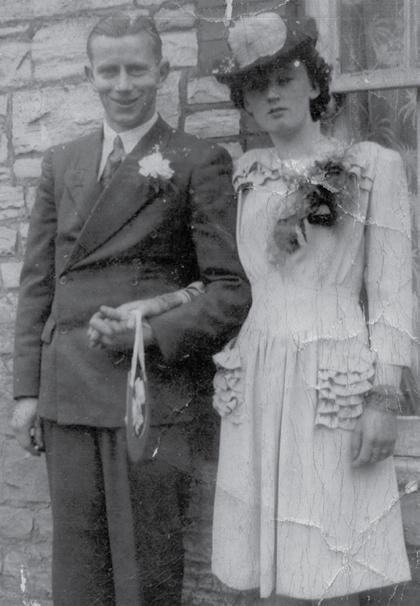
of Nan as archetypal grandmother, there sits another set of memories, those of occasions when I saw a different aspect of her.
Seated with our drinks, Nan said finally, "Your Granddad would have loved this, Lee."
I left a gap for her to decide if she would go on. She did, and soon I was voicing my 23-year-old incomprehension of how a long life could be dedicated so absolutely to a single person and then to his memory. "But, Nan, you married him when you were only 21, didn’t you?”
"I did, love, but I knew." Where
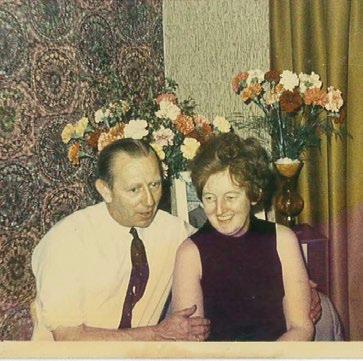
I had feared sadness, there was thankfulness. "He was so special. He understood me, he made me."
When she paused, I offered up my handful of infant recollections of him. Then Nan led the conversation further backwards, so that there in Paris, in a bland suburban café as a server waited to close up, I sat quietly before a stream of images of my young grandfather, and learned how, half a century before, my Nan had been transformed by love.
Liam is the author of I, Mammal: The Story of What Makes Us Mammals (Bloomsbury)
The stigma of solo and single travel is fading and there has been a significant shift in the perception of travelling alone. People are no longer afraid to declare their intentions to be seen as travelling solo, indeed it is now regarded more often than not as a liberating experience, an adventure and a sociable undertaking.
Today just under a third of all holidays are taken by single adults. Holidays taken by single people have outperformed the overall holiday market over the past five years with an estimated 3.5 million adults taking these trips annually. With these volumes, it’s no wonder the perception of solo travel has changed rapidly over the years, going from taboo to trendy.
It’s not hard to see the benefits of going where you want, when you want. For a start, going it alone actually means you’ll never be short of company. Whether it’s sharing a meal at a communal table, joining a group tour or quizzing the locals on what’s best to see, travelling as a single person forces you out of your comfort zone.
But for someone that hasn’t done it before, it can be an overwhelming decision to make – from where to go and what to do through to the safety concerns of going it alone – there are lots of considerations for the first-time solo traveller to think about. This is where joining a group of other
singles, on a break organised by experts in solo travel can make all the difference, providing the ideal balance between freedom and security.
Whatever you choose to do whether you fancy a city break, a discovery tour, a golfing or walking holiday or simply some time away to relax - allowing local experts or companies who have experience in the area to sort out the details can help solo travellers to see the best parts of their destination, and sometimes the hidden ones too.
Being thrown in with a bunch of people you’ve never met allows you to make friends for the duration of your trip without any obligations to become soulmates. You get to do what you want, with like-minded people, the itineraries and holidays are planned out for you to get as involved with as you wish, or alternatively spend as much time on your own as you want without any pressure, plus there is no hideous single supplement to pay too!
Request a free brochure to peruse solo holidays at www.readersdigestsolotravel.co.uk

Want to dip your toe and see if solo group travel is for you? Why not join this rambling weekend and come and stretch your legs in the gorgeous Peak District. With rolling hills, picturesque woodlands and peat covered moorlands, it has some of the prettiest landscapes in England.
• 2 nights
• 2 guided walks
• Twin/double room for single use
• Half board
• Depart 7th September 2018
• From £305pp
£50 OFF all holidays booked before 30/8/2018 using code RD18 NEW
For more information or to book call 0844 826 8515 or visit
www.readersdigestsolotravel.co.uk

There’s more to Florida’s southeastern coast than its beautiful sandy beaches, as Anna Walker discovers…

It’s a beautiful, moonlit night in Fort Lauderdale, Florida. I’m standing beneath the stars, soaking up the chatter of locals and the distant thrum of a band and I’m holding something special. Nestled warmly between my fingers and a napkin is a perfectly round, sugar-dusted, deep-fried Oreo. It’s just about the most American thing I can imagine: sugary, decadent and nostalgic. A taste of childhood, for just $1 a pop.
We’re visiting the FAT Village, which on the last Saturday of each month becomes a pop-up artists’ quarter, with musicians, painters, chefs and craftsmen of every kind filling this downtown warehouse district with all manner of alluring colours, sounds and smells.
I encounter surreal portraits of celebrities, hand-crafted maps of Florida and homemade soy candles that smell like pudding. Small boys weave in and out of pedestrians on their BMXs, giggling uncontrollably as they topple onto one another, their bikes in a tangled heap.
The moon is bright and full, and though vibrant in the sunshine, dusk has brought with it a hushed, excited quality to this cultural mecca. It’s still a somewhat underground event, even amongst locals, and you can feel the sense of a shared secret in the air.
A singer by the name of Psychic Dove performs nearby, strumming mellow, Miami-inspired love songs on a shiny black guitar, pausing occasionally for impassioned speeches on the power of music to bring people together. When I chat to him later, he’s on a mission to hunt down some vegan chow from a nearby ramen stall.
It’s an unforgettable first night in Fort Lauderdale. Home to some of the most postcard-perfect beaches I’ve ever seen, it’s reasonable that many tourists arrive in Miami’s smaller, more relaxed sister expecting nothing more than sunshine and sand. But as I’m to discover, this destination has a lot more to offer.
I RISE EARLY THE NEXT MORNING, relishing the view from my room at the stylish W Hotel. To the left is the iconic palm-lined promenade, where the sea stretches until it kisses the horizon. It’s scattered with neat signs drawing attention to the sea turtle hatching season: hundreds of babies will shimmy their way up the beaches in the coming months, and several waterfront hotels have changed their lighting so as not to confuse the tiny critters into shuffling in the wrong direction. During my flight I noticed the ocean was littered
with little white blobs. I soon realised that I’d actually spotted a huge bale of turtles, swimming just off shore.
To my right, the view takes in the glittering waterways (all 167 miles of them) that have earned Fort Lauderdale the nickname of “the Venice of Florida”. I explore them upclose that evening, with a private cruise on the Fort Lauderdale Water Taxi. Our guide, Captain Nelson, takes us along “Billionaire’s Row”, the gorgeous secluded waterways lined on either side with the beautiful homes of the rich and famous—each one a veritable Barbie dream house looking out onto the water.
Nelson knows everything about this elite neighbourhood, and he’s full of amusing—and sometimes salacious—anecdotes. These are the homes of doctors, lawyers, the owner of the Miami Dolphins, the inventor of Alka Seltzer: you name it, he knows it. We cruise slowly past the home of the owner of Budweiser, right next door to the owner of a rival brewer. Nelson tells us that after one particularly rambunctious party, the rival collected all of his guest’s empty beer cans, and unceremoniously dumped them on Mr Budweiser’s front lawn.
While he describes the hijinks that followed, we’re overtaken by a kayak with a porky dog sprawled across the bow. “That there’s Gatsby,” Nelson explains, without missing a beat. “He made a fortune starring in Purina commercials.” Even the dogs around here are famous.
Nelson and dismount to wander the short distance to Las Olas Boulevard, an eclectic shopping and dining district with some of the cleanest streets
“Hundreds of baby turtles will shimmy their way up Fort Lauderdale’s beaches in the coming months”
I’ve ever seen. We’re headed for dinner at Louie Bossi, a lively Italian restaurant with trendy yet secluded outdoor dining. It’s busy for a Sunday, but the atmosphere is relaxed, and our eager waiter plies us with food and cocktails. I try a vegan Amaretto Sour and fill my belly with “angel’s hair” pasta.
It’s energy food I’m grateful for the next day, where we take a private transfer to Birch State Park to explore some fresh water lagoons via kayak. It’s incredibly tranquil, and a wellplaced reminder of Florida’s
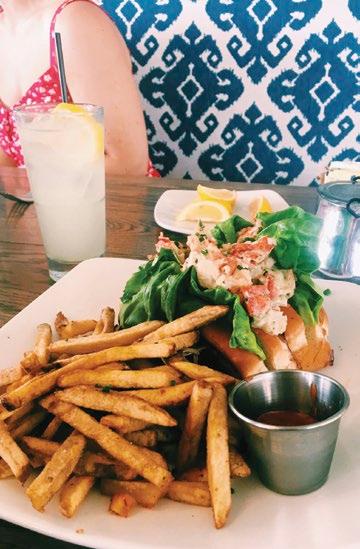
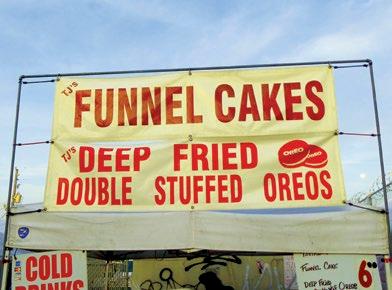


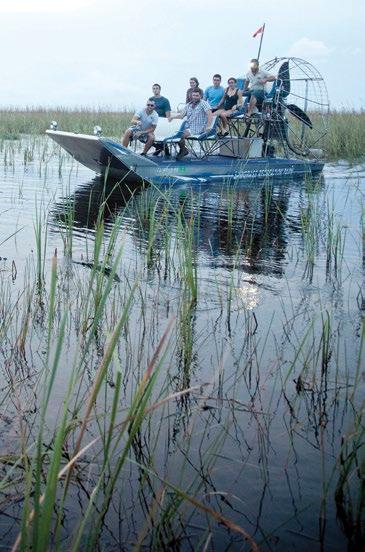
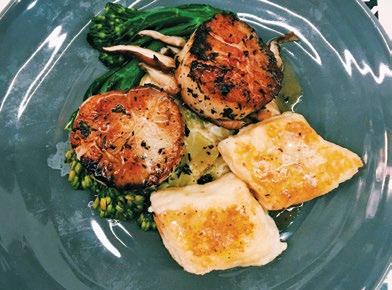


Everglades heritage. Our guide kayaks backwards, telling us stories about the region as he goes, pointing out plants that would have offered sustenance to Native Americans, when they passed through these parts many years before.
to the nearby city of Hollywood. Perched between Fort Lauderdale and Miami, it’s the ideal blend of the two cities—relaxed like Fort Lauderdale but with a vibrant arts and food scene to rival Miami.
The soul of the city is encapsulated perfectly by the impressive Downtown Hollywood Mural project—a collection of carefully curated outdoor murals painted by artists from both home and abroad. It lends the entire area an offbeat, quirky charm to cross the road and lock eyes with Salvador Dalí or be met with the shock of pink flamingos when you turn one corner, and a flock of wide-eyed mermaids when you turn the next.
Pierre puts the finishing touches on her design. A Haitian American, she was raised in Brooklyn, New York, and wants her piece to evoke sentiments of femininity. Vickie works in paint-splattered trousers, in 30-degree heat, but she’s more than happy to pause on hour five of painting to chat with us about her passion for the project.
“At one point a huge gator jumps up at the edge of our boat, flipping onto its back, yellow belly exposed”
After stretching our legs, it’s time for lunch. And GG’s Waterfront Bar and Grill might just be the best spot in the city. Serving hungry customers since the 1940s, the restaurant has an engrossing history. A favourite with both Frank Sinatra’s Rat Pack and the Mafia, the gorgeous waterfront venue was for a time wiretapped by the FBI. Indeed, a plot to kill Castro was once formulated within its walls.
We encounter one mural in the midst of completion, as artist Vickie
We feast on delicious Fort Lauderdale stone crabs— GG’s get through 500 tons of the stuff a year— as luxury yachts cruise past. It’s easy to see why the Rat Pack brought all their dates here.
Away from the serenity of the bay, it’s time to encounter a different side of Florida. We wrench ourselves from the view for the Sawgrass Recreation Park, where a private airboat tour of the iconic Everglades awaits us.

Our guide—Captain Bob—has been skimming the waters on these boats for 52 years. When I ask how he became involved in the Everglades, he points to a hammock between some distant trees. That’s the hunting camp he was raised in. Nowadays it costs huntsmen more to kill an alligator—accounting for tools and a license—than they could realistically make from selling the meat, Bob explains, so the old hunting families have had to be smart.
When he was just ten years old, Bob’s neighbour bought a brand-new airboat. Desperate for a turn in the captain’s chair, he convinced his father to let
him take a spin on the boat and he never looked back. Bob laughs as he describes sneaking out to drag race the boats across the glades at night in his teenage years.
We speed across the sprawling body of water—which gathers here entirely from rainfall—at what seems like an impossible speed. At one point a huge gator jumps up at the edge of our boat, flipping onto its back, yellow belly exposed. Bob barely bats an eyelid.

Later, a majestic blue heron swoops overhead with a baby gator clamped firmly in its mouth. It’s incredible how close to nature we feel just a short drive from Downtown Hollywood’s pristine streets.
IT’S NEARLY HOME TIME, but before we head to the airport, we make one final stop. Billy’s Stone Crab is worldfamous, and we’ve heard their stone crabs with mustard sauce are the stuff of legends.
A family restaurant through and through, we dine with proprietor Elena Hershey, who charmingly introduces herself as “Mrs. Billy”. Elena explains that stone crab is special, because once harvested for their claws, they’re re-released back into the waterways. Unlike most crabs, they have the incredible ability to regrow their claws, making this dish sustainable as well as delicious.
As we dine on crab, lobster tails and fresh grouper and snapper, we’re treated to the sight of a fleet of frolicking dolphins playing in the streams of passing yachts.
Our final Floridian bucket list item before we leave is to sample Billy’s Key Lime Pie. The recipe is kept top secret and shipped across the country to the restaurant’s loyal fan base.
Even after a full week of sampling
Key Lime Pie (it’s something of a Floridian specialty) Billy’s still manages to be the most delicious dessert of the trip.
I’m reminded of the feeling I got from that deep-fried Oreo on my first night. Nostalgic and sweet, it’s the complete taste of Greater Fort Lauderdale—indulgent comfort with a surprisingly zesty twist.

BA flies directly to Fort Lauderdale from London Gatwick. Flights from £329pp return (britishairways.com)
W Hotel Fort Lauderdale, (954 4148200, wfortlauderdalehotel.com)
Margaritaville Hollywood Beach Resort, (844-562-5625, margaritaville hollywoodbeachresort.com)
For our pick of the best restaurants in Greater Fort Lauderdale visit readersdigest.co.uk/lifestyle/travel/ where-to-eat-in-fort-lauderdale

TAngela Ness of Perth explores the delights of Scotland’s Isle of Skye
he Island of Skye has always fascinated me. With its towering craggy Cuillins, fairy pools and fantastic rock formations, I’ve spent many holidays exploring the rugged landscape and soaking up its sense of history.
I’ve never had any interest in its close neighbour, the Isle of Raasay, but one day, mainly to enjoy a ferry ride, I paid a visit. It turned out to be one of the best days of my holiday.
The view of the Cuillins to the west and Torridon to the east was aweinspiringly impressive from the calm blue sea.
Embarking at the pier, the first thing I saw was a beautiful horse-shoe shaped white sand bay, washed with crystal clear waters. Following the path round the headland, an impressive view of the east coast of Skye was stretched out across the narrow strip of sea. Further on was a secluded beach backed by a grassy hill where I enjoyed a picnic lunch, just soaking up the scenery.
Passing Raasay House, now
boasting self-catering accommodation and a “sea activity centre”, I made my way through woodlands, passing over ancient brochs and a church, stepping over peaty streams, accompanied all the way by a chorus of birdsong.
I wasn’t surprised to discover that this was the birthplace of poet Sorley Maclean, as it was certainly making me feel poetic. I was surprised however, to learn that the island once had a thriving iron ore mining industry. Now, it relies on fishing, farming and tourism. The friendly community hall where I had a welcome cuppa is testimony to that.
Thinking about Dun Caan, the flattopped hill in the north of the island and more hidden coves still to be explored I knew I would be back. Raasay Ferry leaves from Sconser on Skye. Timetables and tariff are available at calmac.co.uk
Tell us about your favourite holiday (send a photo too) and if we print it we’ll pay £50.
Email excerpts@readersdigest.co.uk
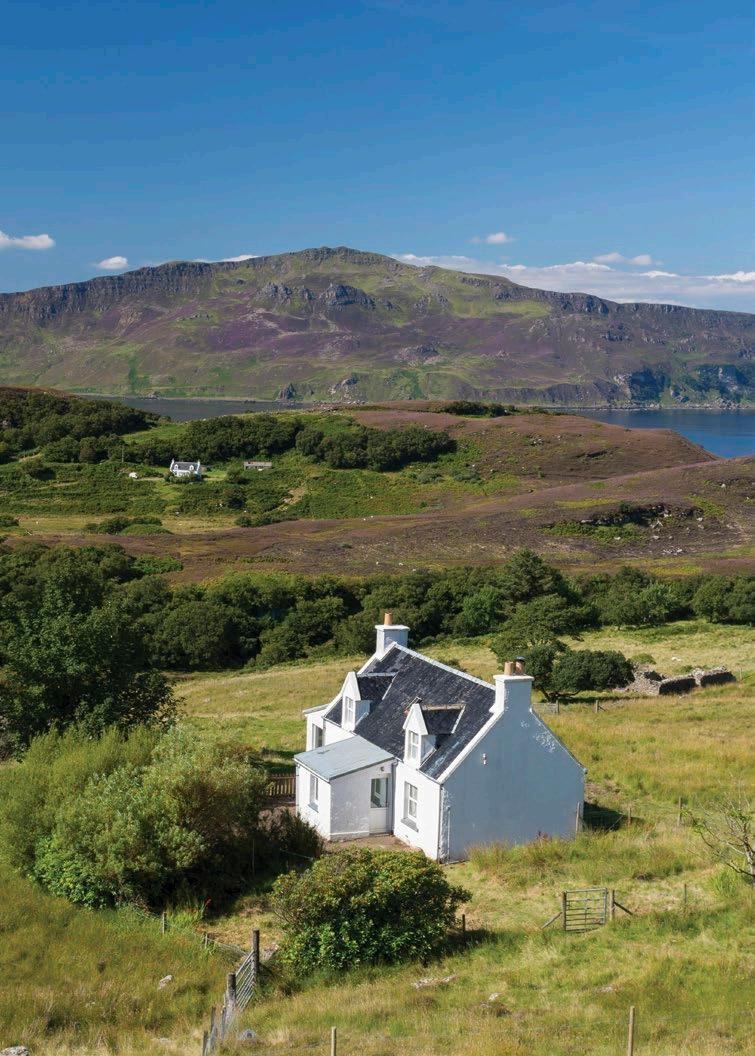
Stylish Georgian coaching inn The Globe has debuted 12 new bedrooms including three which welcome dogs. Pooches can also run free at one end of Wells beach, toffee-coloured and a mile away (theglobeatwells.co.uk).
Britain’s first overnight treetop camping experiences are available in a country house’s pretty grounds. After climbing ropes, harnessed guests sleep in hammocks ten metres up a beech tree. Medium fitness is required (goodleaf.co.uk).
Knowsley Safari’s terrific new tiger trail allows visitors to practice pouncing—very important—and sprinting, before coming face to face with huge Amir tigers via glass panels. Elephants and rhinos also await (knowsleysafariexperience. co.uk).

To mark the littleknown Heart of Wales railway line’s 150th anniversary, a long-distance parallel walking trail is being readied. Incorporating viaducts and castles, Carmarthenshire’s hilly section is already open. Why not walk one way, then return by train? (heart-ofwales.co.uk)
A self-guided driving tour, Absolute Escapes’ Seafood Trail pairs
thrillingly wild scenery with waterside hotels and restaurants serving scintillating shellfish. Whisky-tasting on the Isle of Skye also features (absoluteescapes.com). by Richard Mellor
Like to know where you’re going? Including flights, trains, buses, ferries, driving and walking routes, the travel planning platform’s updated app can suggest 730,000 routes in 160+ countries.

Solos was formed in 1982 specifically to enable solo travellers to holiday together with ease, to enjoy and share experiences and to establish new and life-long friendships.
Holidays for individuals. Since then we’ve stayed true to our roots and our expertise has been recognised by an evergrowing and loyal community of customers.
With a unique combination of quality and choice we offer holidays for all tastes and budgets.
Solos offer the widest choice of Sun and Activity Holidays, City Breaks, UK Holidays and escorted tours to worldwide destinations as well as a range of Dance Weekends and Black Tie Balls.
• Excellent value for money, more inclusions, more added extras
• A room of your own
• Flights and transfers where applicable
• A friendly Tour Leader on all our holidays
• A social atmosphere
• Join in as much or as little as you like
• Join many of our exciting excursions
• Share your experience, make new friends
So whether you’re a returning customer or joining us for the first time, we look forward to travelling with you.
We’re all guilty of amassing a wealth of loyalty cards without much clue about their value. Here are the cards that are actually worth the wallet space
With so many different schemes and complicated points systems, it’s often a struggle to know whether swiping your loyalty card at the till is worth the effort.
To help, here’s a breakdown of the high street’s main loyalty cards and what you get.
Points per full pound spent: 1
Value of 1 point: 0.5p
Though you can collect Nectar points at a few retailers, it’s Sainsbury’s where most of us earn our points. Once you have 500 points (worth £2.50) in your account you can use them at the till to save on your shopping, or exchange them

Be Clever With Your Cash
online. You’ll likely also be sent money off vouchers in the post.
Points per full pound spent: 1
Value of 1 point: 1p
Once you’ve earned at least 150 Clubcard points you will be sent a voucher—though these are only sent out four times a year. You can use these vouchers at the till, or “boost” them so they’re worth three times as much on things like magazine subscriptions and train tickets. You’ll need to go online to do this. Again, Tesco posts out money off coupons to members to help you save extra on your shopping.
Points per full pound spent: 10
Value of 1 point: 0
Sparks from Marks and Spencers is a different type of loyalty scheme. The points you make don’t earn you any cash. Instead they allow you early

access to sales and special events. Alongside regular discounts you access through the M&S website, you’ll also be sent special 20% off codes and vouchers to use throughout the year.
Points per full pound spent: 0
Value of 1 point: 0
Similar to M&S, Waitrose’s loyalty scheme doesn’t earn you cash. In fact there aren’t any points to collect at all. You can however take advantage of in-store discounts. If you spend £10 you can claim a free newspaper, and there’s 20% off fish on Fridays and steak on a Saturday. There’s also no minimum spend if you want a free tea or coffee—though you will need to bring a reusable coffee cup. Keep an eye on the letter box for more of those coveted money off coupons.
Points per full pound spent: 5
Value of 1 point: 0.2p You need to spend a lot of money at Morrisons to claim a voucher, with £5 the minimum payout. This requires a huge 5,000 points, which you’d only get after spending £1,000. But if you’re a regular at this supermarket it’s still worth signing up.
Points per full pound spent: 4
Value of 1 point: 1p
One of the most generous reward schemes on the market, you can start spending your Boots Advantage points as soon as you earn them— but you need to cover the entire total cost of your chosen purchase. Watch out for popular bonus points events, usually adding 1,000 points, worth £10, to your account if you spend around £50.


You’ve probably had a lot of calls and letters from your energy company encouraging you to get a smart meter installed. They sound like a good idea on paper. You can monitor your energy use in real time to work out which appliances are the most expensive to run, and in turn use them less to lower your bills. They’re also meant to automatically send accurate readings to the energy company, meaning an end to estimated bills.
Except my mum isn’t convinced. And with good reason. She’s a regular switcher, comparing prices every year to find the best deal for her gas and electricity. It saves her hundreds of pounds each year.
The problem with most smart meters is they’re likely to become dumb meters if she changes supplier. This was a fault that was meant to be fixed last year but wasn’t, and is slated to get updated at some point this year. But until then there’s no point getting one installed when it’ll only stop
working later in the year.
Despite the wait for these meters, it doesn’t mean my mum can’t keep tabs on her energy use. She actually tracks the usage on the standard meters from time to time. And she’s been able to work out more or less where the money goes.
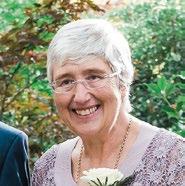

There are some newer energy smart meters which will work if you switch supplier, but most companies are still rolling out the older versions. If you are offered one, check whether it’s the latest SMETSII model, rather than SMETSI. If it’s the latter, say no.
SayNoTo0870.com
When you’re calling premium numbers such as those starting 0845 and 0870 it can cost you a fair whack. Though these are sometimes included with landline packages, they won’t be included in your mobile phone allowances.
When you call these numbers your provider will set an access charge per minute. Then the company you are calling adds a service charge, again per minute, which you should be told when you call. Then the charges can quickly wrack up, with a hour long call easily costing £40 from a mobile phone.
However in most cases these numbers have alternatives which are either freephone or starting 01, 02 or 03. These are far cheaper to dial, and
they’re usually included in calling packages. The only trouble is actually finding them.
That’s where SayNoTo0870.com comes in. The website is quite basic but you can enter either the number you have or the name of the company you’re trying to contact. Hopefully somewhere in the huge database is an alternative you can dial. These numbers have been added by users so it’s possible they’re out of date or not quite right, but it’s certainly a great place to start.
The other variations you can enter into the site are 0842, 0843, 0844, 0871, 0872, 0873. These numbers won’t be covered by any landline call packages. Sadly it’s unlikely you’ll find a cheaper number if you’re trying other premium rate 09 and directory enquiries 118 numbers.
Following a public contest seeking ideas to make obeying the speed-limit fun, Sweden now operate a system whereby speed-abiding citizens are entered into a lottery to win the money charged in fines to speeding citizens. The average speed of cars passing by one camera dropped from 20MPH to 15MPH as a result.
SOURCE: WIRED.COMThough curry might not be the first thing which springs to mind in the summer, this dish is designed for the hot weather— channelling flavours of South East Asian satay, and African mafay peanut stews. Even peanut butter haters will love it!
• 3tbsp oil
• 8 chicken thighs (bone-in)
• 2 onions, diced
• 1 scotch bonnet, deseeded and thinly sliced
• 1 thumb-sized piece of fresh ginger
• 10 tomatoes, washed and diced
• 4tbsp peanut butter
• 250g peanut butter
• 500ml water
Optional serve: steamed rice, fried plantain, wilted spinach

Rachel Walker is a food writer for numerous national publications.
Visit rachel-walker.co.uk for more information
1. Heat the oil in a heavy-bottomed pan and cook the chicken at a high heat. Use tongs to turn the thighs until the pale skin turns coloured and golden. Set on plate and put to one side while you prepare the sauce.
2. First, cool the oil that you cooked the chicken in, by taking the pan off the heat for two minutes. Next, cook the onions at a medium-gentle heat until they soften and turn translucent. Add the scotch bonnet and ginger to the pan, and cook for a minute until fragrant. If no scotch bonnets are available, use any hot, fresh chilli.
3. Add the tomatoes to the pan, and allow them to cook-down. Meanwhile, boil 500ml of water, and then add it to the tomato sauce, along with the peanut butter, and stir to combine.
4. Return the chicken thighs to the pan, cover and simmer for 25-30 minutes until the chicken thighs are cooked-through.
5. If following the optional serve, simmer the rice, and pan fry the peeled and sliced plantain in vegetable oil. Two minutes before the rice has finished cooking, use the steam from the cooking rice to wilt spinach in a sieve. Serve.
 BY TIM & ZOË HILL
BY TIM & ZOË HILL
Even if you prefer pale pink rosé from Provence, a fruitier wine works best with curries, so look for a Portuguese or Italian number, which will also taste delicious with a summer berry dessert.
When making choux pastry it’s important to remember a couple of things: always preheat the oven and try to resist opening and shutting the door during cooking. That way they’re sure to puff up and become beautifully golden and crisp—heaven!
1. Preheat oven to 200ºC and line a tray with baking paper.
2. Heat the water and butter in a pan until it simmers. Meanwhile, sift the flour and sugar into a mixing bowl.
3. Once the butter has melted and is bubbling, remove from the heat and add the flour and sugar. Beat vigorously with a wooden spoon to create a smooth, thick paste which cleanly comes away from the side of the pan.
4. Add one egg at a time, continuing to beat until the paste becomes smooth and develops a dropping consistency. Spoon one heaped tablespoon onto the baking tray—leave a 4-5cm gap—and keep going in a grid shape until all the mixture has been used.
5. Bake for 20 minutes until crisp and golden. Prick the base with a cocktail stick or skewer and place on a cooling rack. Whip the cream into soft peaks and when the profiteroles are cool, pipe cream inside each one.
6. Finally, heat the white chocolate and butter over a pan of simmering water. Once melted, stir in the cream and drizzle the white chocolate sauce over the profiteroles.
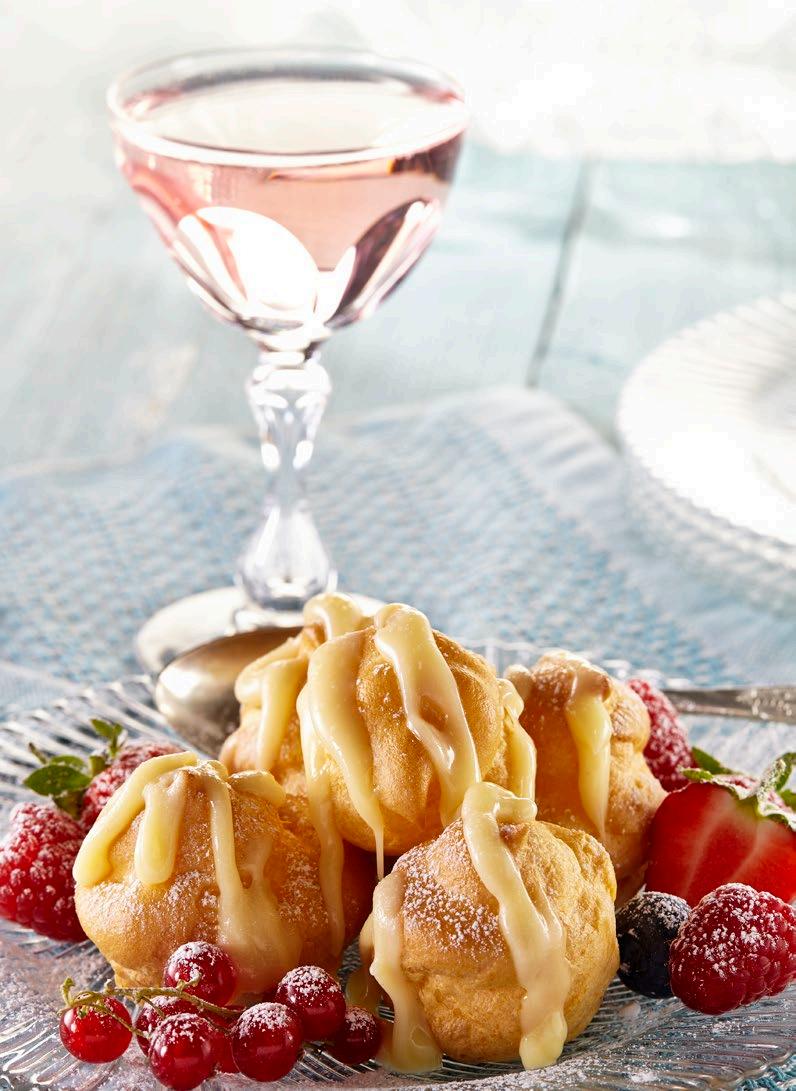
Serves 8-10
For the profiteroles:
• 220ml water
• 80g butter
• 100g plain flour
• 2tbsp sugar
• 3 eggs
• 100ml whipping cream
For the sauce:
• 200ml white chocolate
• 75g butter
• 200ml whipping cream
To serve:
• summer berries

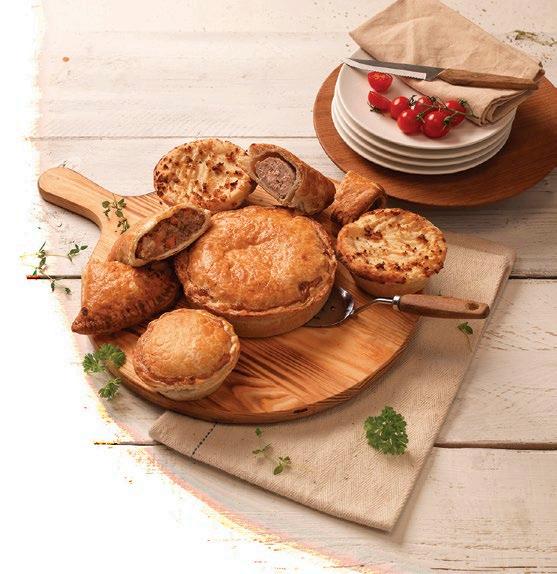




Embrace a pared-back way of life by introducing a clean colour palette and minimalist styling into your interior
Amidst our busy, fast-paced lives, it’s no surprise that we find something deeply appealing about the uncluttered and understated qualities of Nordic design. Scandinavian influences have been inspiring the way we decorate and furnish our homes for decades and it’s thanks to the sense of tranquillity and calm that this uncomplicated style can bring to our lives.
A fresh, neutral colour palette sets the backdrop for a Scandi-inspired interior; a mixture of white and grey will ground the scheme and help any room feel instantly open and airy. Natural touches, such as wooden elements, will offer warmth to the look and can be used to build up layers of interest


through texture, for example mixing wooden flooring with faux fur shaggy rugs and wooden furniture. Following the Swedish notion of lagom, meaning a balanced way of living, it’s important to focus your design around having a spacious layout to allow plenty of room to breathe. Avoid filling the walls and floors with too much furniture and instead limit your choices to only a few functional pieces that you love and which really make a stand-alone statement.
Homes and gardens writer and stylist Cassie Pryce specialises in interior trends and discovering new season shopping
Scandi design is greatly influenced by clean lines and furniture often has a contemporary, minimalist edge. Room schemes can be effortlessly styled with a curated collection of key accessories to create a homely vibe, yet without feeling overdecorated. Try to keep surfaces uncluttered by working clever storage into each room and allow the dialled-down décor to make your home a sanctuary to escape to.
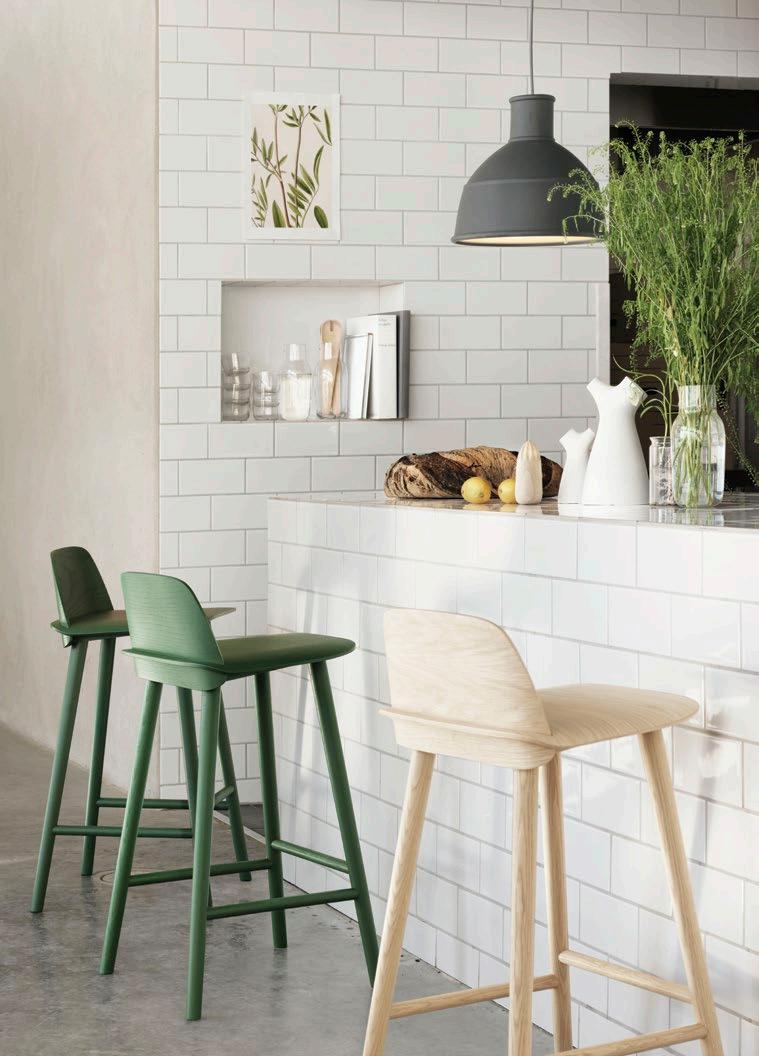
Transform a gloomy outdoor spot into a secret corner that entices with its mystery; using skillful illusory tricks
There is a great joy to be gained from creating a pleasing display through an appropriate choice of plants, one that satisfies the eyes, ears and nose. Since many gardens are smaller than their owners would like, any device that gives an illusion of greater space has much to recommend it and is worth incorporating into a garden design.
One of the first steps to take is to lower the surrounding boundaries, thus bringing more sight of the sky into the garden and making it feel less enclosed. But while open space overhead makes a garden feel bigger, at ground level things work a little differently.
or hedge, as people instinctively prefer to sit with their backs to something solid.
One way of increasing the impression of length in a rectangular plot is to introduce beds which narrow at the far end of the garden; a pathway of paving slabs of decreasing size reinforces the illusion. Clipped shapes in these borders will attract and hold the eye, making the viewer take longer to cover the whole area, while planting small-leaved foliage plants at the garden’s end makes it seem further away.

Every gardener is interested in colour, but its effect in a garden landscape is not always appreciated. Usually, bright colours that clamour for attention have the potential to destroy a larger effect, so quieter tones are often preferable throughout most of the garden.
A garden seen in its entirety at one glance seems smaller than one where some parts are out of immediate view. A number of smaller areas can be delineated by hedges, by tall shrubs, by or fences; perhaps of decorative trelliswork lightly dressed with climbers. Such areas can be furnished with seats, which are best placed against a wall
• Plant cordylines, yuccas and phormiums either close to the viewer or far away to arrest the eye.
• To emphasise length, place bold and largeleaved plants close to the viewing point.
• Put exotic evergreens that have large, dramatic leaf shapes on a patio to draw you instantly to a sitting area and to give it a tropical feel.
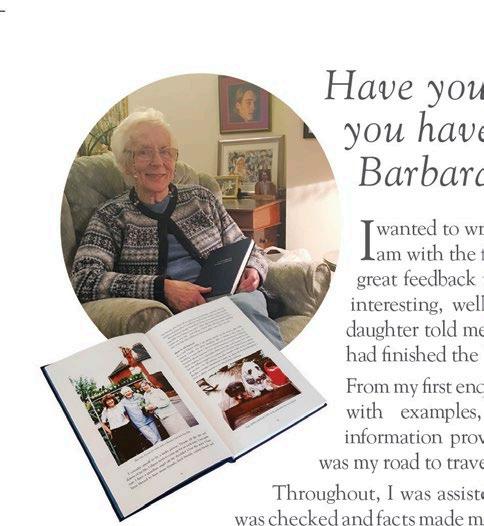
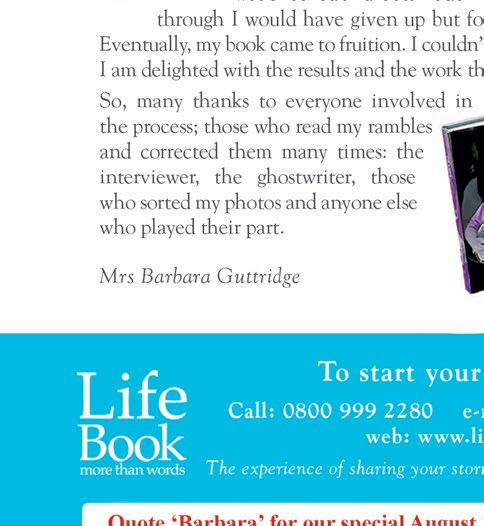

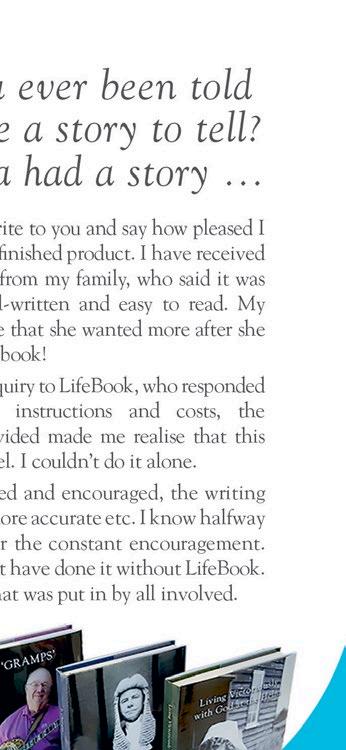

The easiest, quickest, and cheapest way to modernise any outfit is by adding the right pair of earrings. It's not subtle, dainty earrings, but bold, colourful, Joan-Miró-is-my-muse kind of earrings that have impact. Choose a colour that flatters you as a starting point and go from there. Good quality basic clothes that are already in your wardrobe, like a shift dress or a cashmere jumper, are the perfect foil for transformational statement earrings. Changing the focal point with earrings can make the whole outfit look completely different.
resin, silk tassels, cheerful pompoms, or a luxury metal. They can be asymmetrical or matching. They just need to have presence and impact. The only "rule" is that the more petite you are, the smaller your statement earring may need to be; you want to wear the earring rather than have it wear you. Also, when wearing a statement earring, pay more attention to your lipstick. A brighter-than-usual finished lip looks more balanced when you're bringing extra attention to your face via earrings.

Your statement earrings can be made of bright enamel, colourful

Lisa Lennkh is a banker turned fashion writer, stylist and blogger. Her blog, The Sequinist, focuses on sparkle and statement style for midlife women
Statement or not, I can't stand the feeling of heavy earrings, so I always look for ones that make a big impact but are still incredibly light to wear. Few brands do this better than Yorkshire-based Toolally. Their handmade earrings are colourful, acrylic, and light as a feather. Marks also deserve top marks for their summer earrings; they look well above their price point and most are very light and wearable. My other go-to brand for earrings is J Crew; they usually have an impressively well-curated selection.
Despite my love of all things shiny, I like to avoid too much sparkle on a daytime statement earring to avoid veering into Pat Butcher territory.
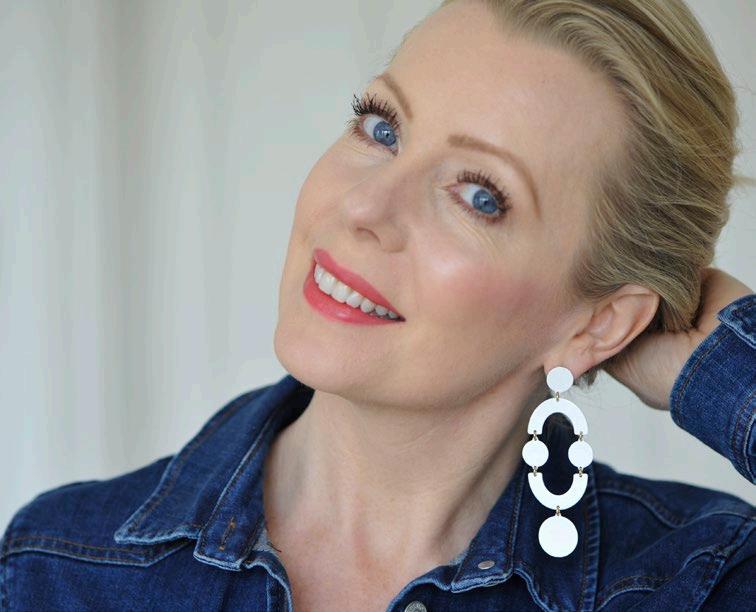
The only exception I'd make to this is if the earring is in the fine or demifine jewellery category. London brand ADOR by Ayesha does amethyst, rose quartz, and multicoloured jade earrings which have a restrained elegant glimmer rather than a brash rhinestone sparkle.
Besides heavy earrings, my personal bugbear is an earring where the piercing is not covered, like a wire or fish hook style earring. Gravity and time have not been kind to my earlobes, so I prefer something that covers them as much as
possible, like the style I'm wearing above. I only buy things that have longevity, whether they're a trend or not. I know I'll enjoy wearing earrings that don't draw attention to my creased earlobes since the situation is unlikely to improve with the passing of time!
Be prepared for your statement earrings to become a conversation starter. Ordering a coffee or paying for book, they will be noticed and likely complimented. Sometimes it's nice to let your ears do the talking for a change!
Summer can leave skin dry, but Jenessa Williams is on hand with her top tips for keeping your complexion hydrated
It's our earth’s lifesource and the oldest beauty trick there is —but are you really getting enough H2O? Although many of us preach the cosmetic benefits of water consumption, there's actually very little scientific evidence to suggest that it's the answer when it comes to creating the perfect complexion. Drinking your eight glasses a day is certainly responsible for clearing toxins, fuelling cells and maintaining good health, but keeping your skin hydrated can be a little more complex than simply downing liquids.

Water-heavy creams and serums work wonders to stimulate blood flow and plump the skin, reducing the appearance of wrinkles and providing a smoother base for make-up. Face mists can also be a welcome refresh when the heat is getting too much, as are water primers. Apply liberally before bed, or keep in your hand luggage for long haul flights. The higher the aqua content, the more your face will thank you for it.
Contrary to popular belief, the level of moisture your skin can retain is dependent on genes and your skin lipid barrier. Sun exposure, alcohol consumption and overly long or hot baths all affect the lipid layer, making summer a particularly hard time on our faces. Dehydration can have potentially serious consequences, so if your complexion is looking a little tired, consider adding some extra H2O into your beauty routine.
Elf Prep & Hydrate Balm, £9 for 15ml
Clinique Moisture Surge Face Spray, £22.50 for 125ml
Tarte Drink of H2O Hydrating Boost, £30 for 50ml


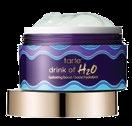
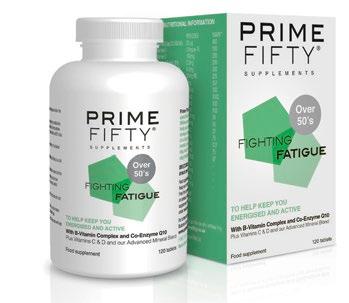
Maintaining energy levels through the dayismoreandmoredifficultasweage, soweneedtoensurethatournutritionis
healthy, as this is a major contributor to how we feel from day to day.
The majority of over 50s are failing to get the recommended amount of key vitamins and minerals from their diet alone. As many of these micronutrients are involved in our energy producing metabolism, then it’s possible that this is the reason why you may be feeling tired.
Prime Fifty have formulated a range of meticulously tailored products, aimed at supporting the metabolism of the over 50’s. Their highly successful Fighting Fatigue supplement is personalised nutrition, just for the over 50s and is used by thousands of people all over the UK.
Fighting Fatigue contains:
All the necessary B vitamins, at the right levels, for supporting energy production and fighting fatigue
A set of special minerals which also are part of the energy producing metabolism
Additional nutrients which have been proven to help the ageing gut absorb vitamins/minerals more e ectively, together with Co-enzyme Q10
An additional ‘healthy ageing blend’ which is designed to give you back a selection of key nutrients, identified in studies, as key to our health, especially as we age. This includes vitamin D, calcium, folate, iron and the B12 Vitamin
A careful selection of anti-oxidants such as selenium and vitamin E are also included to help protect against cell damage caused by the ageing process (oxidative stress)

Polish director Paweł Pawlikowski follows his Oscar-winning Ida with a harrowing story of doomed love
To classify Cold War as a mere “drama film” would be such a gross understatement—after all, Paweł Pawlikowski embodies that particular brand of genius that elevates cinema to the realms of cathartic poetry and profound balladry—a gift he shares with the likes of Tarkovsky, Bergman or Haneke. When it comes to these kinds of film, standard terms and brackets simply don’t apply anymore.
Cold War follows the lives of two starcrossed lovers, Zula and Wiktor, over the course of a few decades, spanning several countries. Their story begins in
post-war Poland where they first meet; her—a boisterous young singer/dancer, him—an older, collected pianist. Sparks fly, and soon the two artists find themselves desperately in love with each other—an affair they both know is too dangerous to maintain.
Joanna Kulig and Tomasz Kot, who portray the couple, don’t falter for a split second under the ever-present (often literal) spotlight, and deliver stunningly honest, nuanced performances set to the elegantly pristine, theatrical cinematography of Łukasz Zal, Pawlikowski’s frequent collaborator. Top it all off with amazing music, combining rousing Polish folk with romantic Parisian jazz, and you’ve got yourself one knockout of a movie.
If there’s one thing you’ll take away from this stately courtroom drama based on an Ian McEwan novel, it’s that Emma Thompson can do no wrong. Here, she plays a whipsmart, widely admired judge dealing with an ethically complex case concerning a gravely ill young man, while her marriage to her increasingly frustrated husband (Stanley Tucci) is slowly falling apart behind the scenes. Though the narrative will probably have you rolling your eyes time and again (think painfully pretentious

characters delivering strings of banalities disguised as dialogue), The Children Act remains a surprisingly watchable movie thanks to Tucci’s sheer charisma and the wonder that is Thompson .

ROMANCE: THE MISEDUCATION OF CAMERON POST Set in the hostile world of a gay conversion therapy centre, it’s hard to believe how tender, sweet and funny this film is. A clever musing on youth and sexuality, Miseducation tells the story of a teenage girl who, following an incident that shocks her conservative parents, is sent to the centre for “treatment.”
Despite the heavy subject matter, the film is charming and light on its feet.
Any filmmaker can re-tell a true story. But it takes real talent and skill to take one, and tell it in a way that completely flips it on its head—which is exactly the case with this Italian gem. Based on a tragic story of a boy kidnapped by the Sicilian mafia, this drama manages to tell a brutal, truecrime story in an imaginative language infused with the magic of fairytales, the thrill of first love and the terror of nightmares. Featuring astounding performances and gorgeous cinematography, it’s a genrebending tale that’ll linger with you long after the credits roll.
by Eva Mackevic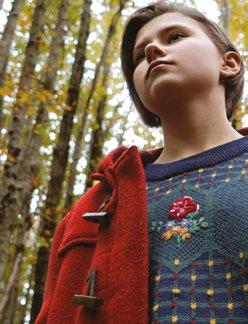
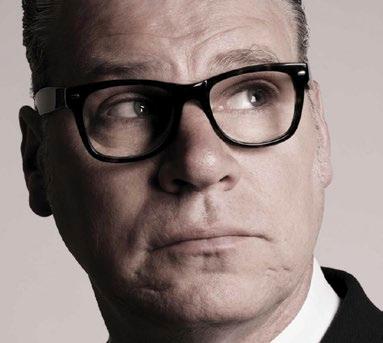
What is it? Britain’s most trusted film critic oversees five hour-long shows that promise to explain the hold certain movies and genres have over us.
Why should I watch it? Informed arts programming is pitifully lacking from the schedules—and informed film programming, in particular, is practically non-existent. Partly shot around London’s wondrous Cinema Museum with input from critic’s critic Kim Newman, this series comes as a necessary corrective.
A gripping, unnerving four-part doc exploring how a pizza delivery man in Pennsylvania ended up in a carpark with a bomb around his neck.
What is it? Comedy born of neartragedy: in 2015, Bob Mortimer was rushed in for emergency heart surgery after doctors discovered 95 per cent of his arteries were blocked. Three years down the line, Fast Show mainstay Paul Whitehouse tempts him outside to reflect on the experience over six weekly fishing expeditions.
Why should I watch it? For its affectionate portrait of friendship, some glorious scenery and the chance to spend three hours watching two of the nation’s funniest messing about by a river.
Best episode? The entire series is consistently, gently amusing—but only Episode One can boast Mortimer’s priceless, twothirds-accurate Robert DeNiro impersonation.
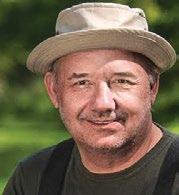 by Mike McCahill
by Mike McCahill
Steve Martin and Martin Short lay on the old-school razzle-dazzle in this live stage performance.
The show
unleashing a latter-day Pollyanna on New York’s concrete jungle comes back with a sharper edge.
ALBUM OF THE MONTH:
VIVALDI X2 BY ADRIAN CHANDLER AND LA SERENISSIMA If Baroque music is something you’ve always planned to get into but never got past The Four Seasons, here’s your perfect opportunity. From the same brilliant pen of Antonio Vivaldi, comes a majestic, life-affirming collection of double concertos—a genre he excelled in—bursting with the glorious, uplifting tones of strings, oboes and bassoons, and adorned with the uniquely beautiful sounds of such period instruments as viola d’amore and lute.

The works are performed here by violinist Adrian Chandler—a leading interpreter of Italian Baroque music—and his period instrument ensemble, La Serenissima. Together, they deliver these vivacious concertos with great gusto and virtuosity, emphasising their versatility and dynamism, as they alternate between impish playfulness and dignified solemnity.
Not only do these works showcase Vivaldi-the composer at the absolute top of his game, but they also reveal Vivaldi-the poet, attuned to the joys and hardships of the human condition, creating music that remains the perfect tonic for the soul centuries later.
by Eva MackevicREADER RADAR: PAUL PIKE, RETIRED RISK MANAGEMENT LEADER
WATCHING: NATURAL WORLD: BBC2 I enjoy nature programmes, in particular David Attenborough and the Natural World series. I do also watch Peppa Pig under direction of my grandchildren!

ONLINE: FACEBOOK
I’m a fan if used prudently, it’s a great way to keep in contact with fellow players from my football team as well as former work colleagues.
LISTENING: CLASSICAL MUSIC
READING: A MOMENT OF WAR BY LAURIE LEE I also enjoy reading books in Spanish and French and am currently reading Noticia de un Secuestro by Gabriel Garciá Márquez.
I have a preference for Debussy, Léo Delibes and Ludovico Einaudi. I’m also intrigued by phone-in football debates on national radio and the rich diversity of opinions.
This month two historical dramas take us on a thrilling journey back in time…
Pat Barker made her name writing about overlooked, often mistreated women. She then moved on to war, with the deservedly prize-laden Regeneration trilogy, about the traumatised soldiers of the Western Front. Now, she’s combined the two subjects in a blistering novel that views the Trojan War through the unfamiliar medium of female eyes.
The book begins as it means to go on—which is to say quite brutally. The narrator is Briseis, queen of a small town near Troy that’s attacked by the Greeks. The men and boys are slaughtered; the woman and girls carried off as slaves or—if they’re pretty enough—concubines. Aged 19,

James Walton is a book reviewer and broadcaster, and has written and presented 17 series of the BBC
Radio 4 literary quiz
The Write Stuff
Briseis’ own fate is to be made a bed-mate to Achilles, the man who’s just killed her husband and brothers—and who, from close-up, proves to be a deeply strange, mother-fixated psychopath.

Along with the hair-raising war scenes, Barker provides a thoroughlyimagined account of life in the Greek camp. But of course, the subject of powerful men exploiting powerless women also has a topical resonance that, as Barker admits, she didn’t expect to provide when she embarked on a novel set in the Bronze Age.
by
SimonMawer (Little Brown, £18.99)
Fans of Robert Harris wondering what to read while they wait for his next book could do a lot worse than
Prague Spring: a cracking fictional tale set in a beautifully-researched (and very well-chosen) slice of history.
The setting is Prague in 1968 where

the Czech experiment to build “socialism with a human face” means people can now speak their mind about life under Communism. But for how long? Sam, a diplomat at the British embassy, has a local girlfriend—which gives him admiring access to those Czechs revelling in the new freedoms, confident they won’t be reversed. On the other hand, he’s getting reports of Soviet troops massing on the border. Meanwhile, two Oxford students have hitch-hiked to the city, naively believing they’re there to witness the triumph of the good guys.
Needless to say, the reader is always aware that the political and social excitement Mawer captures so well was tragically misplaced. Yet, knowing more than the characters do only serves to crank up the tension— and tomake their optimism all the more heart-rending—as the climactic invasion approaches.
Can you guess the writer from these clues (the fewer you need the better)?
1. She’s the only Canadian woman to have won the Booker Prize.
2. The copyright to her books is owned by “O.W. Toad”—an anagram of her surname
3. One of her novels, set in a version of America called Gilead, has become a global TV hit.
Answer on p128
The Story of Kullervo
by J.R.R. Tolkien (HarperCollins, £8.99)
Previously unpublished work, written while he was still at university. Perhaps a book only for die-hard Tolkien fans— but there are plenty of those.
The Secret Teacher
by Anonymous (Faber, £8.99)
An idealistic young teacher spills the beans on what really goes in a lessthan-ideal school.
The Lightkeeper’s Daughters
by Jean Pendziwol (W&N, £8.99)
Extremely moving novel about an elderly woman discovering her father’s journals—and secrets.
The Abolition of Britain
by Peter Hitchens (Bloomsbury, £16.99)
Updated, if rather pricey, edition of Hitchens’s characteristically crunching account of what’s gone wrong in Britain since the Second World War— which turns out to be quite a lot.
Fierce
by Gin Phillips (Black Swan, £7.99)
A mother and her four-year-old son are trapped in a zoo by random shooters in a thriller guaranteed to make the heart pound and the palms sweat.
A portrait of a forgotten Britain is painted in this republished memoir of a 1950s Warwickshire health visitor .
This is a great discovery. In 2001, Molly Corbally selfpublished a memoir about her career as a health visitor in Warwickshire in the first decades of the NHS. The book was then found a few years after her death in 2012— and at last gets the wider audience it deserves.
As the new publishers presumably noticed, An Armful of Babies has much of the appeal of Call the Midwife but, thanks to its rural setting, also that of James Herriot’s books.
Molly’s duties, in fact, started just when the midwife’s ended. Once local babies were 10 days old, she took over as their main carer, making regular visits until they were five, and keeping in touch with the families long after that. As a result, she has lots of terrific stories to tell, some
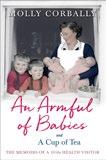
An Armful of Babies and a Cup of Tea: The Memoirs of a 1950s Health Visitor by Molly Corbally is published by Two Roads at £7.99
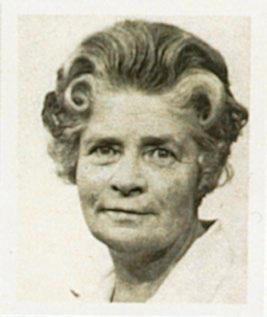
sad, some funny, some surprisingly tough, and none at all remotely sentimental—except maybe the ones about her dogs. (The book, incidentally, also proves that the breast versus bottle debate has been raging for at least 70 years.)
Along the way, we get a wonderfully intimate sense of everyday life in a now-vanished Britain. One of the most memorable characters here is the fearsome Lady Merlin, who as the resident aristocrat in the village of Chesford both expected and received due
deference from the ordinary folk (although she often met her match in Molly). And if you think the gap between urban and rural England is wide now, then try this passage— which shows, too, just how nononsense Molly could be.
After the wartime bombing of Coventry, homeless families from the city were put up in a supposedly temporary camp of Nissen huts near Chesford. In the event, they remained there for many years—and clearly had to work quite hard to learn country ways…
After five years, the camp dwellers had more or less been assimilated into the life of the village. A new generation of children had been born in Chesford who had no memories of Coventry, and the older children were losing their fear of the wide open spaces, learning country lore and country manners, identifying birds and trees and wild flowers, recognising the difference between mushrooms and toadstools, shutting gates behind them as they plucked up courage to walk through a field of cows or sheep, and touching their caps to the gentry in the village street.
Some never did lose their fear of cows, never acclimatised to rural life and drifted back to Coventry as soon as they left school. Some women, in the early days, had complained of the silence, missing the constant
The local priest arrives at a clinic session in Chesford church hall
A large black form appeared in the doorway, his pipe temporarily replaced by a cup of tea. The room lit up, the toddlers ran to him, grabbing at his cassock, forcing him to put down his cup to pick them up in turn, tossing them in his arms to squeals of joy. Lady Merlin looked horrified.
“Really, Father! I don’t think this is quite the place for a priest. One of the mothers might be feeding her baby.”
The priest was tickling the bare tummy of a baby boy. He didn’t look up.
“Everywhere is the right place for a priest.’”
I had a handful of baby so couldn’t shake hands, but we exchanged smiles.
“If I can be of any help to you,” he said, “you’ll know where to find me.’”
A slight wink and movement of the grey, tonsured head indicated a possible cause for needing his help.
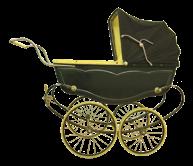
hum of traffic. Others complained of the noise, of being woken by a cockerel from a nearby farm, their sleep disturbed by the hooting of a barn owl, the lowing of a cow which had lost her calf, the barking of a dog—even, unbelievably, the singing of a nightingale. Gradually they adjusted, and were drawn into the life of Chesford, joining the WI, learning to make jam, to bake bread, to skin a rabbit and pluck a fowl.
Although Lady Merlin had vigorously opposed the siting of the camp in “her” village, she had to accept the fait accompli, even inviting “the foreigners” to the annual harvest lunch in her barn. She had to concede that many of the camp children were brighter and quicker and better workers than the cottagers, but it was almost akin to a physical hurt to her, at the school prize-giving, to hand some of the highest awards to the Coventry children.
The wide range of ability and accomplishment among the camp children reflected the wide range in
And the name of the author is…
Margaret Atwood, author of The Handmaid’s Tale.
(Her Booker winner was The Blind Assassin)
“Many people think a hut is a hut…until they look inside”
their living conditions. Many people might think that a hut is a hut, until they looked inside, as I so frequently did. Some were dark, dirty, sparsely furnished with broken-down odds and ends; neglected slums. Others were gay and bright, charmingly furnished homes, clean and shining with carefully tended little gardens. There was as much variety in the hutted homes as there was among the housewives who ran them. They were always a bone of contention between me and my friend, the housing manager. Manlike, he tended to take pity on the slum dwellers, and was apt to offer them the council houses as they became vacant.
“They’re living like pigs,” he would argue. “We can’t leave them in such appalling conditions.”

“They make their own conditions,” I pointed out. “These women would turn a new house into a slum within months. Give your houses to those who deserve them, the house-proud women who can transform a hut into a palace.”
I won my point, and the council houses were allocated as a reward for good housekeeping.
Actor, author and former MP
Gyles Brandreth is performing at the Edinburgh Fringe Festival between August 1 and 26 with his one-man show, Break A Leg!

When I went to boarding school aged ten, my parents packed my uniform, a copy of the Bible and a dictionary. I spent my time immersed in the dictionary rather than the Bible and my life rather reflects that. Being a methodical chap I started at A, discovering on the way through that “brandreth” is a substructure of piles of stones and that “yex”—a useful Scrabble word—is a hiccup. Thanks to that dictionary I’m the most prolific person in Dictionary Corner on Countdown and I can avoid repetition on Just a Minute.
One of the best things about being an MP was using The House of Commons library. During all-night

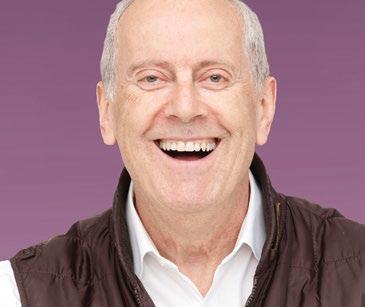
sittings I’d take myself off to the books that weren’t about politics. Here I found Conan Doyle’s autobiography in which he describes meeting Oscar Wilde and their subsequent friendship. Conan Doyle was bowled over by Wilde’s charm and way with words. I thought it all fascinating and began writing The Oscar Wilde Murder Mystery Series in which he and Conan Doyle solve Victorian crimes.

Researching and writing this book changed my life. I lost my seat as an MP in 1997 and I took it hard. My best friend had died the year before and soon after my sister and brother both passed away. I’d heard Dr Anthony Clare on Radio 4’s In the Psychiatrists Chair and went to meet him in Dublin. He taught me the unexpected secrets to a contented life. As told to Caroline Hutton
From real-time translation to the good old Swiss Army knife, Olly Mann brings us the low-down on the gadgets you need to pack for your holiday
Heading off on your hols? A foldable alarm clock and travel adaptor won’t cut it any more… it’s time to get gadget-ready!
Liven up the departure lounge by mounting an Oculus Go (£199.95) to your bonce and blasting your eyeballs with colours and light. After years of hype, the VR headset that caused Mark Zuckerberg to part with $2bn is finally available on the high street, at a reasonable price, and as a lightweight “standalone” unit, ie, it doesn’t need to be docked to a PC, phone or games console. Immerse

Olly Mann presents Four Thought for BBC Radio 4, and the award-winning podcasts The Modern Mann and Answer Me This!
yourself in breathtaking digital worlds—or just watch Netflix without people peering at your screen.
Thanks to its exclusive tie-up with photography powerhouse Leica, Chinese manufacturer Huawei has a reputation for excellent cameraphones, and has raised the bar with the new Huawei P20 Pro (£799). The “tri-camera” system proffers a 40 megapixel main lens, 20MP monochrome sensor for depth and texture, and an 8MP sensor for zooming. That’s three lenses for the price of one, and the results are the best snaps I’ve ever seen on a phone.
Google Pixel Buds (£159) are wireless Bluetooth earphones with a difference: tap the right earbud, speak


out loud and they’ll translate your thoughts into one of 40 supported languages. So, you can say, “Where’s the campsite?” (or something less redolent of a GCSE oral exam), and they’ll instantly display a translation of your words, on your synced handset, for Johnny Foreigner. But be warned: they only work with Google Pixel phones, and it’s such an eyecatching concept that—as in the early days of video-calling—you inevitably spend half your time talking about the technology itself rather than using it.
Sometimes, despite your best efforts to leave work at home, you absolutely need to engage with some cruddy PC in a hotel business suite. Do it in style with the Victorinox Midnite Manager@Work Swiss Army knife (£50). There’s a removable 16GB USB stick in that iconic red casing, alongside ten much more entertaining functions, such as scissors, ballpoint pen, nail file and… a bottle opener. Well, it is holiday time after all.
Win £30 for your true, funny stories! Go to readersdigest. co.uk/contact-us or facebook.com/readersdigestuk
I WAS HELPING OUT at my church Sunday school recently. The children were drawing and I noticed one child was particularly deep in concentration.
I asked him what he was drawing and he told me it was Jesus. The child next to him piped up that we didn't know what Jesus looked like.
The boy looked at him for a minute and then retorted, "Well, you will when I've finished!"
SHONA LLOYD, ClwydMY DAD FELL OFF HIS garden ladder and became very dazed. We decided to take into A&E to get him checked out.
The first thing the nurse did was ask him what day it was to determine his coherency.
My dad retorted without hesitation, "It's refuse collection day."
AMBER JACOBS, FrodshamMY FRIEND KELLY TOOK her daughter to their local church for the vicar's leaving service. The choir sang as they walked down the aisle, all holding large white lit candles.
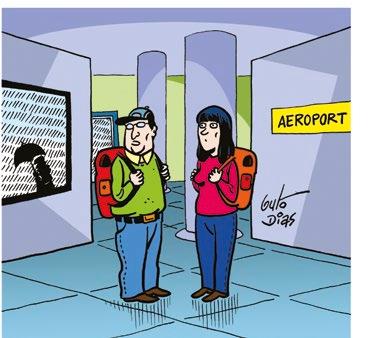
“The flight is delayed, and so is Summer!”
As the lights were dimmed and silence ensued, Miranda's voice could be loudly heard singing, "Happy birthday to you...happy birthday to you…" Much to the enjoyment of the congregation.
CATHERINE HISCOX, Hertfordshire
MY FOUR-YEAR-OLD DAUGHTER —as well as being a complete chatterbox—is the queen of the dramatic sigh. When being hurried
along getting dressed for school one morning she took a deep breath, then caught my eye and said, “I wasn’t going to sigh Mummy, I was just filling my lungs with air. Sometimes you need to do that you know."
LYNNE BARTON, xxxMY GRANDCHILDREN ARE staying with me at the moment, which is a real treat.
During lunch last week, Rachael was sitting next to me and I noticed that she was watching me very carefully. Suddenly her little hand came up and she gently stroked my wrinkled face. "Grandma, what is wrong with your skin?" she asked.
In the afternoon I was talking to her brother Joshua, a clever boy with many interests. I mentioned that he would probably go to university later in life. Joshua looked straight into my face and said without any hesitation: "Grandma, I expect you will be dead by then."
How refreshingly straight and honest children can be!
HANNELORE DE BURGH, Herefordshire
MY TEENAGE BROTHER ROB phoned our mum to complain that there was no food in the house again. She said she was sorry but that she'd been busy. He continued, "There's not even bread."
And then in more exasperated tones, "Even prisoners have bread."
DEMI ROBERTS, llanbedr
ON HOLIDAY IN WALES, our landlady showed us around and said, "Unfortunately my toilets are out of order, but not to worry, my neighbour's happy for you to use his. There's just one thing—it'll cost each of you two pounds."
Indignant, I asked, "He'll charge us two pounds each just to use his toilet?"
"Heavens no! That's the bus fare— he's two miles down the road!"
DAVID WEBB, West SussexI READ THAT ONE OF the ways to stay motivated with weight loss is to put an unflattering picture of yourself on the fridge, so I asked my partner to take a couple of photos of me in my underwear. We went to the self service printing machine in our local chemist, but it wasn't working. The owner came over and restarted the machine but insisted on staying with us to make sure it was working OK.
We watched in horror as half-naked photos of me at my worst flashed up on the screen. Nobody spoke but in an instant my weight-loss motivation soared!
ANN JOHNSON, Cheshire
YEARS AGO I WORKED as a hotel porter and spotted a middle aged man entering reception with a much younger women. I rushed over asking, "May I carry your wife's bags?"
Glaring at him, the woman snapped, "You didn't tell me she was going to be here?"
BRIAN ALDEN, Bristol




YES I want to subscribe to Reader’s Digest Magazine for just £3 for 3 issues (a saving of £8.37 on the shop price of £11.37 based on the cover price of £3.79 per issue). I understand that if I do not wish to continue receiving Reader’s Digest after my first 3 issues I can simply cancel my subscription by contacting customer services. If I do want to continue to subscribe after my first 3 issues I need do nothing and my subscription will automatically be renewed at the low rate of £7.50 for every 3 issues until I decide otherwise.





Before you start cramming your suitcase for that dream getaway, make sure you’ve got the travel lingo down. Take a tour of these terms, then jet to the next page for answers
BY EMILY COX & HENRY RATHVON1. docent n.—A: tour guide. B: side trip. C: frequent flier.
2. sojourn v.—A: travel nonstop. B: take a guided tour. C: stay somewhere temporarily.
3. cosmopolitan adj.—A: between stops. B: worldly-wise. C: relating to space travel.
4. prix fixe n.—A: confirmed reservation. B: meal with a set price. C: racing car.
5. couchette n.—A: round-trip ticket. B: French pastry. C: train’s sleeping compartment.
6. funicular n.—A: pleasure cruise. B: cable railway. C: limousine.
7. jitney n.—A: day trip. B: duty-free shop. C: small bus.
8. valise n.—A: car parker. B: small suitcase. C: country cottage.
9. sabbatical n.—A: break from work. B: lodging overseas. C: seating upgrade.
10. ramada n.—A: shelter with open sides. B: dude ranch. C: in-house maid service.
11. incidental adj.—A: waiting in a long line. B: minor. C: causing a scandal.
12. transient adj.—A: going by rail. B: passing through. C: travelling on foot.
13. manifest n.—A: red-eye flight. B: reservation. C: passenger list.
14. rack rate n.—A: overheadluggage charge. B: takeoff speed. C: full price for lodging.
15. peripatetic adj. —A: speaking many languages. B: travelling freely from place to place. C: crossing a border
1. docent—[A] tour guide. I followed a docent through the museum, pretending to be with a school group.
2. sojourn—[C] stay temporarily. “Will you sojourn with us long?” asked the receptionist as I reclined on a bench.
3. cosmopolitan—[B] worldly-wise. Apparently, Sara wasn’t cosmopolitan enough for the best tables.
4. prix fixe—[B] meal with a set price. Alison knew it was a prix fixe, but she tried to haggle anyway.
5. couchette—[C] train’s sleeping compartment. My couchette mates snored peacefully in their bunks.
6. funicular—[B] cable railway. The funicular disappeared into the mist halfway up the mountain.
7. jitney—[C] small bus. We chartered a jitney for our trip to the cape.
8. valise—[B] small suitcase. Eric grew suspicious after finding someone else’s credentials in his valise.
9. sabbatical—[A] break from work. “I’m here on a six-
month sabbatical,” I tried to explain to the customs agent.
10. ramada—[A] shelter with open sides. My ideal vacation: sipping some colourful cocktails at the seaside under a ramada.
11. incidental —[B] minor. “Incidental items can add weight quickly, so try to pack wisely,” my wife advised.
12. transient—[B] passing through. Thankfully, the brute was a transient customer, not a permanent guest.
13. manifest—[C] passenger list. I came from such a big family, we had to keep an official manifest for every trip.
14. rack rate—[C] full price for lodging. Savvy travellers will never settle for a hotel’s rack rate.
CONTUMELIOUS: someone who is insolent, or arrogantly rude and disrespectful.
Alternative suggestions:
“When your tummy grows continuously”
“The sublime feeling after eating a cantaloupe”
15. peripatetic [B] travelling from place to place. After two peripatetic years in South Asia, Jason decided to settle down.
9 & below: Economy
10–12: Business class
13–15: First class



Janet Goodwin
www.authorhouse.co.uk
Paperback | E-book
£12.95 | £2.99
The heart-warming tale of Senora, a to ee-nosed house cat, and ten very determined street cats whose lives are torn apart until they meet Gentleman George, a Portuguese mountain dog.


The Story of George Aylwin Hogg
Mark Aylwin Thomas
www.authorhouse.co.uk
Hardback | Paperback | E-book
£29.99 | £18.95 | £2.99
Blades of Grass chronicles the life of British adventurer George Hogg, who became a hero in China for saving sixty orphaned boys during the Sino-Japanese War. Author Mark Aylwin Thomas explores how this remarkable man managed to immerse himself in Chinese society.


使用中文、英文、法文詞匯 2400 (四級 - Level 4 - B2) & 7200 (六級 - Level 6 - C2) Chinese, English & French words in use Mots chinois, anglais & français en usage
Hua Zhang
www.authorhouse.co.uk
Paperback | E-book
£21.95 | £2.99
Designed for self-study, this book is designed for English-speaking and French-speaking learners to learn Chinese and for Chinese-speaking learners to learn English and French vocabulary. Each entry has examples arranges into levels consistent with the Common European Framework for Reference for Language (CEFR).


Anuj Tikku
www.partridgepublishing.com/india
Hardback | Paperback | E-book
£13.95 | £7.95 | £4.95
Survival deals with the aspects of spirituality, our role in the universe, how we can build a happy and successful life while dealing with the challenges that we face.


Life as Seen in the Eyes of Tatiana
Monica Brosnan
www.xlibrispublishing.co.uk
Hardback | Paperback | E-book
£28.99 | £ 18.99 | £2.99
This is a story of bond and friendship that will touch and warm the readers’ hearts—especially that of cat lovers of all ages. Read on and enjoy!


No Oil Imports from Sunni/ Shiite Exporters
Charlie Pedersen
www.iuniverse.com
Hardback | Paperback | E-book
£19.95 | £13.95 | £3.95
NOIS2E is a ctionalized narrative that tackles US’ energy dependence. Charlie Pedersen assembles both a world view and an action plan to shake o the economic chains of oil dependency. To his surprise, we discover real solutions when we’re used to frustration and more rumblings of war and price stagnation. A true path to green.
Challenge yourself by solving these puzzles, then check your answers on page 139.
This grid represents a bird’s-eye view of a city’s downtown core. Place a number from 1 to 5—representing a building’s height in floors— in each cell so that no two buildings in any row or column have the same height. The numbers outside the grid tell you how many buildings are visible to an observer looking in from that direction. Higher buildings block the view of lower ones behind them. Can you determine the heights of all 25 buildings?
Dina bought an antique grandfather clock at a garage sale. It strikes the hour every hour, and runs on the am/pm system, not the 24hour system. How many strikes does it sound per day?
You arrive at the fabled archipelago of San Peligro and consult your treasure map, which says, “Dig exactly halfway between the palm on Sharkfin Island and the palm on Cannonfire Island.” Palm trees are marked on the map as dots, but none of the islands have names! If you believe the pirate lore that it’s too much trouble to bury your treasure anywhere but on dry land, where should you dig?
Populate this grid with circles, squares and triangles in three colours (amber, blue and crimson), each in a separate cell, according to the following constraints:
n No combination of shape and colour appears more than once. There must not be two blue circles, for example.
n The row and column marked with arrows contain three coloured shapes. The rest contain two.
n No shape or colour can be repeated in the same row or column.
Some information has been given to get you started.
Fill in the circles to draw a single, continuous loop that follows each line segment once and only once. As you move along, every corner and every junction you pass is the beginning of a new segment. The loop must trace segments in numerical order; that is, “1, 2, 3, 1, 2, 3...”
Each circle can be filled in one of three ways:
£50 PRIZE QUESTION
Answer published in the September issue
These letters can be rearranged to form two different nine-letter words. What are they?
The first correct answer we pick in August wins
£50!* Email excerpts@ readersdigest.co.uk
ANSWER TO JULY’S PRIZE QUESTION
AND THE £50 GOES TO… Trevor Johnson, Wolverhampton
Win £30 for every reader’s joke we publish! Go to readersdigest. co.uk/contact-us or facebook.com/readersdigestuk
THEY SAY TRUE HAPPINESS comes from within.
That’s why I never go outside.
SEEN ON TWITTER
I HAVE A FRIEND WHO’S a weatherman. When he tells me that he wants to hang out I tell him there’s a 100 per cent chance that I’ll be there, and then I don’t show up.
COMEDIAN DAN REGAN
I PLAY THE BANJO and there’s a big difference between banjos and guitars. The banjo has a round pot and it projects the sound outward, and the guitar can get you laid.
COMEDIAN STEVE MARTIN
These photos are shortlisters for the Comedy Wildlife Photograph Awards—and it’s easy to see why (via sadanduseless.com)
I DON’T KNOW HOW TO use the word “hypothetical” in a sentence.
But imagine if I did…
SEEN ON REDDIT
LAST NIGHT I BLEW £500 on a reincarnation seminar.
I just thought to myself, Screw it. You only live once.
COMEDIAN JONATHAN KATZ
I DON’T UNDERSTAND why people choose to use personal trainers.
I’ve never been exercising and suddenly thought, Man, I wish the hottest person I’ve ever seen was here criticising me right now.
COMEDIAN ARJUN BANERJE

YOU CAN’T ACTUALLY LOSE a homing pigeon. If your homing pigeon doesn’t come back, then what you’ve lost is a pigeon.
COMEDIAN SARAH PASCOE
POSH HOTELS OFFER A turn-down service. I had never heard of this and there was a knock at the door and a woman said, “I’ve come to turn down your bed.”
I replied, “Well many women have in the past, why should you be any different?”
COMEDIAN MICHAEL MCINTYRE
enemy is his own worst enemy. So now I have to invite him to barbecues.
COMEDIAN RICHARD HERRING
IF ADAM AND EVE couldn’t make it work in paradise, how the hell am I supposed to make it work in Lewisham?
COMEDIAN SARAH PASCOE
IF WE WERE TRULY CREATED by Gods, why do we occasionally bite the inside of our own mouths?
COMEDIAN DARA O’BRIEN
I’VE WRITTEN A LETTER of complaint to the Royal Mail about my post being stolen.
To make sure that they see it, I’ve put it inside a birthday card.
COMEDIAN GARY DELANEY
COMEDIAN BRENDON BURNS
I’M TRYING HARD TO QUIT smoking. I’ve kicked everything else— drink and drugs—but smoking’s the toughest one. There’s not enough immediate regret is there? “Oh my god what was I thinking? I’ve made getting up stairs pretty difficult in 30 years time.”
IT’S IMPORTANT TO LIVE YOUR life by a motto. I choose to live mine by the motto, “My enemy’s enemy is my friend.”
Unfortunately, as it turns out, my

I LOOK AT HUSBANDS the same way that I look at tattoos.
I want one, but I can’t decide which one I want, and I don’t want to be stuck with one I’m just going to grow to hate and have to pay lots of money to get surgically removed later.
COMEDIAN MARGARET CHO
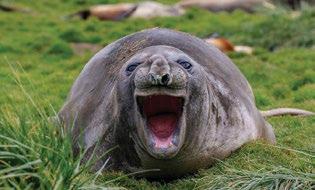
Tweeters reveal their big day balls ups:
@CergCarrell: “My aunt had her wedding by a lake and a couple of guys kept driving past on a boat yelling, ‘Don’t do it man!’ “
@Val_Rob: “While preparing for my wedding, my dad kept referring to Save the Dates as ‘STDs.’ ”
@PassThePinot: “A dead bird was in front of the church so none of the first generation Italian family came in because they thought we were cursed’ “
@Laura_Ann_04: “During my cousin’s wedding, the pastor kept pronouncing her name as ‘Corn.’ Her name is Corinne.”
CROSSWORD ANSWERS
I WAS ARRESTED AT THE AIRPORT for smearing someone’s luggage with Vaseline. It’s okay though, the police dropped the case.
TRACY DAVIDSON, Warwickshire
IN THE PAST FEW MONTHS, I’ve become religious. I’ve started to believe in God, creationism and design. The reason I now believe is Professor Richard Dawkins.
When I look at something as complex and intricate and beautiful as Professor Richard Dawkins, I don’t think that could have evolved by chance!
Professor Richard Dawkins was put there by God to test us. Like fossils. And facts.
COMEDIAN STEWART LEE
MY WIFE TOLD ME THAT sex is better on holiday.
That wasn’t a nice postcard to receive.
COMEDIAN JOEL DOMMETT
I USED TO WORK AT MCDONALD’S making minimum wage.
Do you know what that means, when someone pays you minimum wage? Do you know what your boss is trying to say?
Your boss is trying to tell you, “Hey, if I could pay you less, I would. But it’s literally against the law for me to do so.”
COMEDIAN CHRIS ROCK
We chatted to the relatable and hilarious stand-up comedian, Zoe Lyons
WHAT’S YOUR FAVOURITE OF YOUR OWN JOKES? “I started keeping bees, I’ve got one that got caught behind the window and I thought sod it, I’ll keep that.” It’s such a silly joke because, they never stipulate how many [bees] you’ve got to have.
WHO INSPIRES YOUR COMEDY?
I think life events. I’m an observational comedian. It’s finding those things that are slightly less obvious but when you do say them people can connect.
WHAT’S YOUR FAVOURITE ONE-LINER? A Wind In The Willows joke by Gary Delaney “Last night I had to get toad home because Ratty and Moley were too drunk”.
DO YOU HAVE ANY FUNNY TALES ABOUT A TIME YOU BOMBED ON STAGE? I agreed to do this outdoor festival for half an hour and had a very loose ten minutes at most. I just thought, I’ll be fine I’m sure I can get

away with it but I didn’t. I was ceremoniously booed off. It stays with you for a while.
IF YOU WERE A FLY ON THE WALL, WHOSE WALL WOULD YOU BE ON?
I’d like to be a fly in Buckingham Palace and just have a peruse. But only so long as there was a window cracked open so I could escape to the garden.
HAVE YOU FOUND ANY PARTS OF THE WORLD TO BE FUNNIER THAN OTHERS? I lived in Glasgow for many years and it’s such a funny city. I think it’s their use of language—the rhythm at which they speak—there’s a sort of poetry to it. They’re very energetic people and they enjoy their comedy.
Entry Level Human will be at Gilded Balloon Dining Room throughout August as part of Edinburgh Fringe, and on tour nationwide from September. Get tickets at zoelyons.co.uk
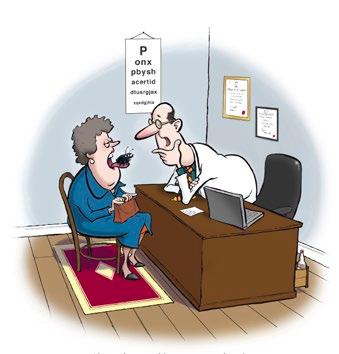
Think of a witty caption for this cartoon—the three best suggestions, along with the cartoonist’s original, will be posted on our website in midAugust. If your entry gets the most votes, you’ll win £50.
Submit to captions@readersdigest.co.uk or online at readersdigest.co.uk/caption by August 9. We’ll announce the winner in our October issue.
Our cartoonist trailed in last position this month with his caption: “I don’t know what it is, but something about them really gives me the creeps.” This month’s crown goes instead to our reader
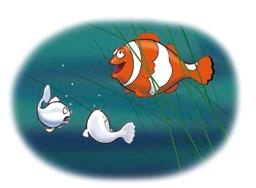
Sian Morgan, who won with an impressive 47 per cent of the vote. Her caption: “Oh no! He’s been sunbathing behind the seaweed again.” got you all voting. Congratulations Sian!

The actor on fatherhood, learning to take criticism and his latest project, sci-fi flick, Genesis.

Will humankind one day be able to harness nature’s forces?
Plus
• BEST OF BRITISH: BREWERIES
We take you on a tour of our nation’s best home-grown hops.




RECLINER & RISER RECLINER CHAIRS MATCHING SOFAS AVAILABLE

The Ripley Riser Recliner

The Linton Riser Recliner

Benefits of good posture
✓ Back Pain Relief
✓ Decreased Fatigue
✓ Improved Breathing
✓ Improved Well-being
✓ Improved Muscle Health
✓ Improved Concentration

Higher seats for easier sitting and rising RECLINING SWIVELS












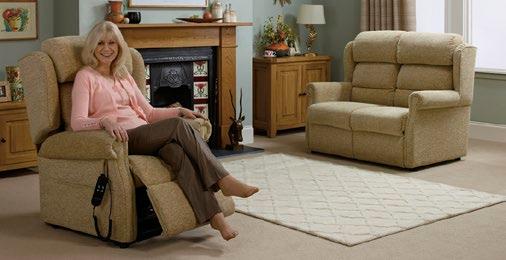












At Oak Tree, we think everyone should be free to enjoy a rich and ful lling life. With our top-quality adjustable chairs and beds, we have already helped thousands to do exactly that.
